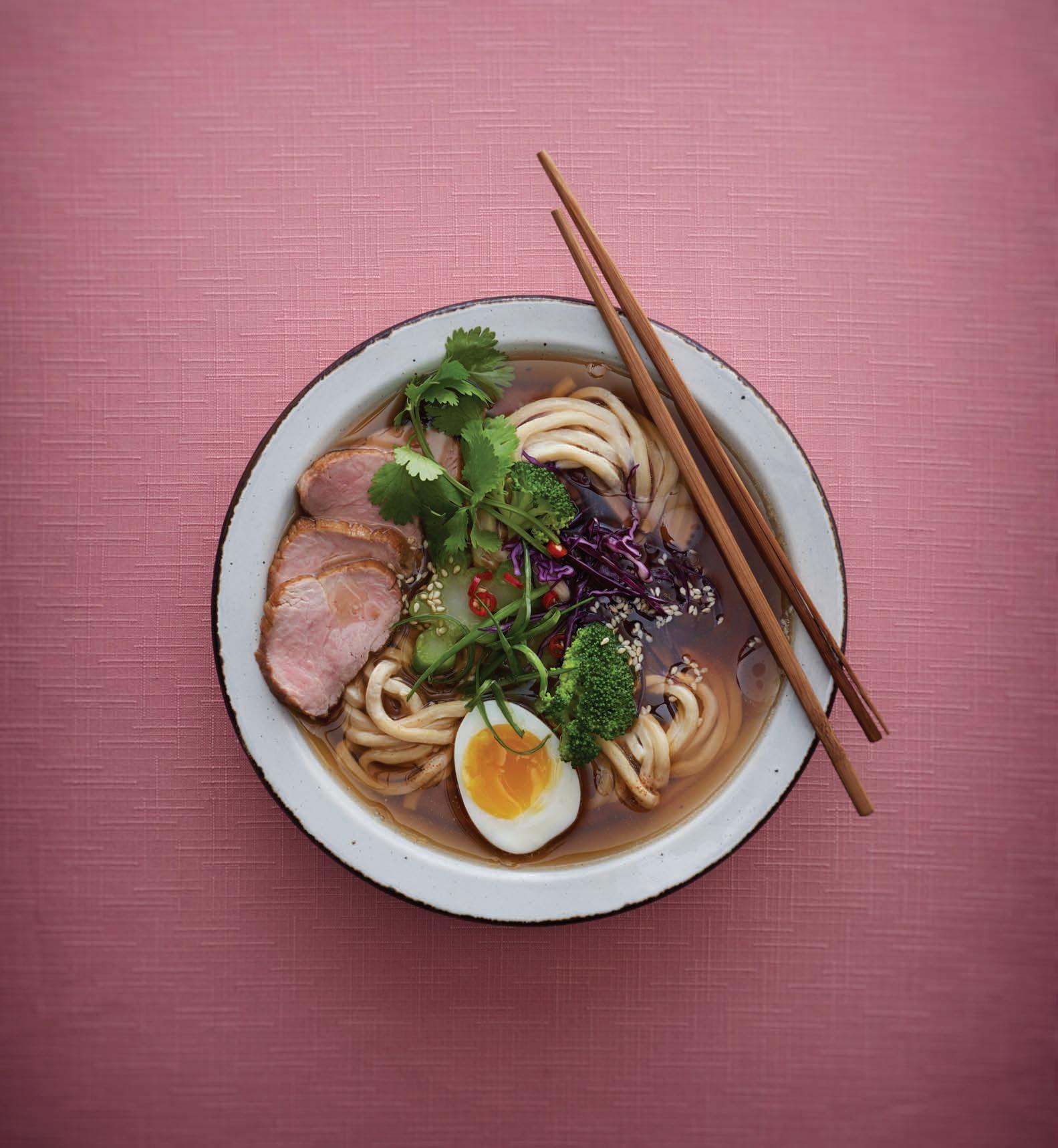
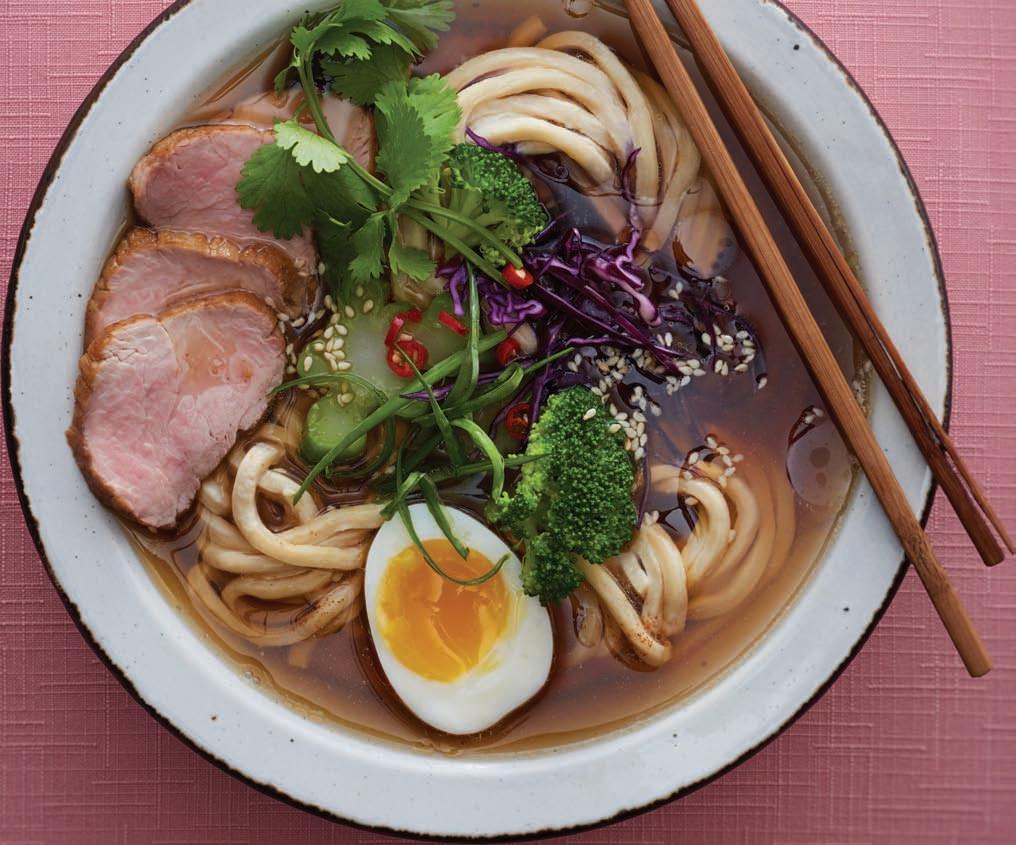




Japanese Noodles UDON 46 RESTAURANTS | RECIPES | WINES | FOOD | CULTURE LOCAL FOOD & CULTURE • JANUARY FEBRUARY 2018 ISSUE 22-01 INDEPENDENT & ISLAND OWNED LOCAL FOOD & CULTURE ® COLD-PRESSED JUICE • KOREAN FRIED CHICKEN • SOUR BEER • WINTER CITRUS • PIZZA • TOP RESTAURANTS TRENDS FOR 2018 The Comfort Issue




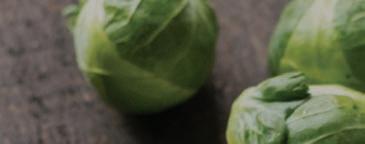
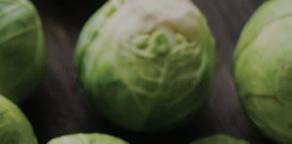


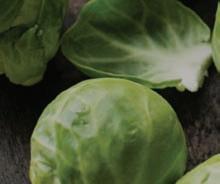
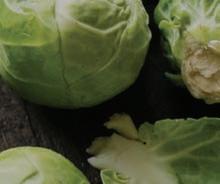

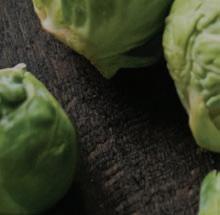
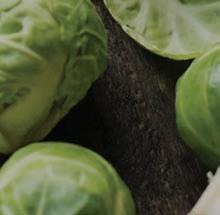
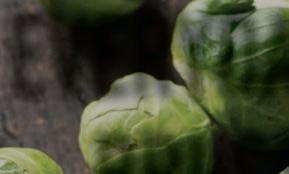
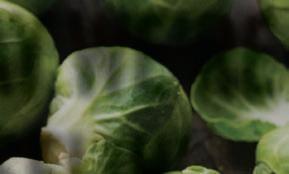

























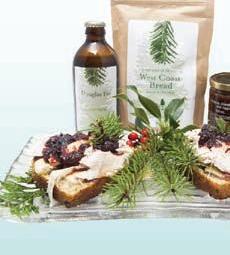


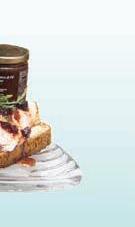



featuring v irginia black whiskey, ginger, rosemary, lemon and soda. WHISKEY GINGER SMASH featu r ing ng fe Open 7 days a week Monday-Saturday, 10am-6pm Sunday & Holidays, 11am-5pm 1701 Douglas Street VICTORIAPUBLICMARKET.COM | EVERYDAY WE’RE BRUSSELIN’ 1 pkg Snowdon House West Coast Bread Mix 340 ml soda or Douglas Fir Essence 1 small wheel of brie Leftover turkey or chicken Snowdon House Crab Apple and Fir Brie topper Farm Shop Hours Tuesday to Saturday 10 - 5 February 26 1-230 & 6-730 Crab Apple and r Briewich A NEW YEAR + AWARD WINNING COFFEE = A BRAND NEW COFFEE EXPERIENCE WWW.OUGHTREDCREST.COM LIKE YOU’VE NEVER SEEN US BEFORE UNVEILING THE CREST 1.1.18
WELCOME TO OUR FIRST ISSUE OF THE NEW YEAR. You made it through the holidays and are stoked for 2018. Maybe you made a few resolutions?
I look forward to visiting new restaurants and shops and reacquainting myself with old favourites. I vow to expand my cooking chops and eat more plant-based foods. I'll continue to travel and visit far-flung places to increase my understanding of other cultures and the world, and I plan to kick back and enjoy family, friends and many delicious things around the dining table. We have a fantastic community of restaurants, brewers, wineries, grocers, coffee providers, farmers, butchers and specialty food shops to choose from and I plan to take advantage of them all. In keeping with the New Year theme, Cinda Chavich writes about what new food trends are taking hold in Victoria. On her radar are seventeen trends that range from beautiful breakfasts to gluten-free grains, new tasting technologies to turmeric… and more. Longtime EAT contributor Joseph Blake takes a look at the fast-growing cold-press juice and healthy smoothie market - don't forget your cleanse. And new writer Adrien Paradis dishes on KFC - no, not the ubiquitous North American franchise but down-to-earth Korean fried chicken which has overtaken McDonald's in many places around the world in its popularity - at last, this city has several go-to spots for this delicious and spicy version.
Comfort-wise Adrien Sala runs down the coziest pubs, most of which have wood-burning fireplaces to snuggle in front of and to ward off winter chills. Shelora Sheldan has been writing for EAT for many years now, and in this issue, she discovers the thick and very slurpable udon noodle. You'll also find recipes for Pork & Udon Noodle Soup, Breakfast Strata and Sabich, a meatless, Middle Eastern type of sandwich. Thank-you to everyone on the EAT team - from the creatives to those printing and delivering the magazine. To our advertising clients a big thank-you as well. Without your support, there wouldn't be a magazine. To our loyal readers, a heartfelt Happy New Year!
Gary Hynes
CITY EATS:
Charelli’s has a new “Cheese Chick”! Frances von Aesch, formerly sommelier at Zambri’s has joined the Charelli’s team. The new opportunity is allowing the experienced sommelier to further explore pairing wine and cheese. Frances will also be drawing on her years of expertise in Charelli’s tastings and wine education events. CHARELLIS.COM
At press time, residents in the Fernwood neighbourhood are drooling in anticipation of the upcoming opening of the Fernwood Pizza Company at 2009 Fernwood next to the Fernwood Inn. The project is being put together by the Fernwood Inn. The pizzeria will seat 25 and offer up handmade pizza, ice cream and craft beer. Expected opening is ealy January 2018.
FACEBOOK.COM/FERNWOODPIZZACOMPANY




Fork’n Pork is now open to satisfy your late night cravings with a menu featuring mac and cheese and curry bowls at 1221 Wharf St.
FACEBOOK.COM/FORKNPORK

Have you heard about Cheese Tea? This new beverage trend has swept through China, Malaysia and Singapore and has now reached our shores. Partea is open in the 1000 block of Blanshard St and serves a selection of brewed black or green tea topped with a creamy cheese foam made from whipping cream, milk and local organic cheese, finished with a pinch of rock salt. PARTEACANADA.CA
A new walking tour will appeal to chocolate lovers and architecture buffs alike. Off the Eaten Track is now offering Chocolate and Churches: a 3-hour walking tour that visits three places of worship in the downtown area, interspersed with food tastings at four different locations. A great way to get to learn more about our city’s history, peek behind the scenes at three historical buildings and sample chocolate in four different ways.
OFFTHEEATENTRACKTOURS.CA

3
Welcome
GARY HYNES FOUNDER & EDITOR
Visit eatmagazine.ca for news and events from: COWICHAN VALLEY UP ISLAND TOFINO UCLUELET VANCOUVER
REBECCA BAUGNIET
Bridal Registry Available Henckels TruClad Double Handle Wok WOK IN THE NEW YEAR!! B roadme ad V Vil lage, 130- 777 R Royal O Oak D Dri ve, V Victori a, B BC www.pennaki tc he n.co m, 2 250- 727-2110, Info@p ennakitchen.com for people who love to cook Regular $220.00 Sale $129.99 Excellent on all types of cooktops. (Including Induction.)
CITY EATS:
Following the news that Catalano Restaurant and Cicchetti Bar would be closing at the end of December, Magnolia Hotel and Spa announced a new culinary concept for spring 2018, that will follow a renovation of the space.
MAGNOLIAHOTEL.COM
Bitchin’ Biscuit Café is the brainchild of Shannon Stead, known most recently for her work as menu curator and chef at the Carnarvon concession. Her latest venture is devoted to southern biscuits with gravy and all the fixins. Located at 529 Pandora Ave.
BITCHINBISCUIT.CA
Fans of the APTN series Moosemeat and Marmalade are looking forward to Season 3 starting this month: This unique show produced by Mooswa Films brings two very different chefs together to explore indigenous culture, culinary traditions and truly delicious food. Season 3 takes chefs Art Napoleon (renowned Cree musician and bush cook) and Dan Hayes (noted chef/owner of The London Chef) from Vancouver Island to Yellowknife and overseas to the UK where the co-stars explore a host of cultural issues and cuisines narrowing in on how each relates to food security and sustainability. MOOSEMEATANDMARMALADE.COM
Congratulations to Oughtred Coffee, winner of Roast Magazine’s “2018 Roaster of the Year award!” This is a first for western Canada and only the fourth time a Canadian company has taken home the award in fourteen years. The award brings global recognition to the west coast’s culinary scene already known for great food, wine and beer. OUGHTRED.COM
Seedy Saturday will be taking place in Saanich on Jan 13, 10am-2pm, presented by Haliburton Farm at the Horticulture Centre of the Pacific and featuring quality vendors, seeds, plants, starts, local wineries, seed exchange and a children’s table. Nourishment will be provided by Charlotte and the Quail SEEDS.CA
Once again, the Hotel Grand Pacific is hosting the popular four-day Victoria Whisky Festival. Events include master classes and tastings such as a whiskey and chocolate masterclass with Adam Bradshaw and David Mincey, and the Glenlivet Distillery Master class with Keith Trusler Jan. 18-21
VICTORIAWHISKYFESTIVAL.COM
Tourism Victoria and the BC Restaurant and Food Services Association’s 13th Annual Dine Around and Stay in Town will take place from Jan 19-Feb 4. Participating restaurants will offer three-course menus for $20, $30, $40 CND per person and are all paired with BC VQA wine suggestions.

TOURISMVICTORIA.COM/EAT-DRINK/DINE-AROUND
The 9th Annual Island Beer & Spirits Festival will be held Sunday, Feb 11 from 2-6pm at The Strath STRATHCONAHOTEL.COM
Victoria’s Seedy Saturday will be held Feb 17, 10am – 3:30pm and is hosted by the James Bay Market Society at the Victoria Conference Centre. The event will feature local seeds, plants, products, and speakers.
JAMESBAYMARKET.COM/SEEDY SATURDAY
Looking ahead to March, the seventh annual Culinaire event will be held at the Crystal Garden on March 8 this year. This event provides locals with the opportunity to savour signature menu items and inspired dishes from an abundant selection of restaurants, lounges, pubs, cafes, specialty purveyors, and sip from a fine selection of local and regional wine, cider, and craft beer. Partial proceeds provide scholarship awards to the Camosun College Culinary Arts Program and a donation is made each year to the BC Hospitality Foundation.
CULINAIREVICTORIA.COM
According to Shawn Soole, co-owner of Foxtrot Tango Whisky Bar, the renowned cocktail bar has suddenly had to close. There’s no word on when or if it is expected to re-open.
Masthead
FOUNDER & EDITOR
Gary Hynes
PUBLISHER Pacific Island Gourmet
CONTRIBUTING EDITOR
Carolyn Bateman
VANCOUVER CONTRIBUTING EDITOR
Julie Pegg
SENIOR WINE WRITER
Larry Arnold
PRODUCTION
Gary Hynes
DESIGN CONSULTANT
Aleya Samji
COPYEDITOR
Cynthia Annett
REGIONAL REPORTERS
Tofino Ucluelet, Jen Dart
Victoria, Rebecca Baugniet
Cowichan Valley-Up Island, Kirsten Tyler
Vancouver, Jennifer Carter
CONTRIBUTORS
Larry Arnold
Joseph Blake
Michelle Bouffard
Isabelle Bulota
Marie-Eve Charron
Cinda Chavich
Pam Durkin
Lillie Louise Major
Sherri Martin
Elizabeth Monk
Daniel Murphy
Daisy Orser
Elizabeth Nyland
Adrian Paradis
André Rozon
Adrien Sala
Shelora Sheldan
Shawn Soole
Jill Van Gyn
Johann Vincent
Rebecca Wellman
COVER
Marie-Eve Charron (styling) & André Rozon (photo)
ADVERTISING DIRECTOR
Gary Hynes
SENIOR ACCOUNT MANAGER
Susan Worrall
FACEBOOK/EATMAGAZINE
TWITTER/EATMAGAZINE

INSTAGRAM/EATMAG
For advertising and other inquiries:
PHONE 250.384.9042, EMAIL editor@eatmagazine.ca
ONLINE EatMagazine.ca, TheEatJournal.com
MAILING ADDRESS Box 5225, Victoria, BC, V8R 6N4
STOCKISTS EAT is delivered to over 300 pick-up locations in BC. Visit our website for locations.
PRINTED IN BRITISH COLUMBIA
EAT ® is a registered trademark. Est. 1999
4JANUARY/FEBRUARY 2018
JANUARY
FEBRUARY
/
Healthy B.C.






Food is medicine here in the third healthiest place on the planet.




ACCORDING TO A 2015 REPORT FROM THE CONFERENCE BOARD OF CANADA , British Columbians are not only the healthiest folks in Canada, we’re the third healthiest population in the world, bested only by the Swiss and the Swedes. Experts credit our salubrious nature to the healthy lifestyle choices we make, chief among them our penchant for health-enhancing, locally sourced food. This love for healthy cuisine is being fuelled by the ever-increasing number of B.C. food producers who consistently churn out some of the healthiest grub on the planet. Last year was no exception, and 2017 ushered in some nutritious new products that also deliver great taste. Here are just three noteworthy examples.





Little Northern Bakery Gluten-Free Cinnamon Raisin Bread
As a wheat-intolerant foodie, I’ve spent a great deal of time searching for a gluten-free bread that actually tastes like, um, REAL bread. My search was unsuccessful until a family member, who is celiac, recommended Little Northern Bakery’s line of breads. “You will have a ‘Hallelujah’ moment,” he predicted. He was right, I did. The Abbotsford bakery has been around since 2015, but their breads only started becoming widely available in 2017—and thank goodness they did. All of their breads are fantastic—but the Cinnamon Raisin variety became my instant favourite upon first taste. It comforts and envelopes the palate with the perfect blend of “sweet and spicy” flavours, and its texture is reminiscent of the best conventional breads. Taste aside, the bread is also über nutritious as it’s made from nutrient-dense whole grains like brown rice and sorghum. Butter up a slice yourself—you’re inner child will smile.
Babe’s Honey Farm Jun “Kombucha”
Babe’s Honey Farm is a veritable institution on Vancouver Island and its unpasteurized local raw honeys have been delighting residents for years. Babe’s recently added an innovative new product to their sweet lineup—a fermented, effervescent, kombucha-like brew made from honey and green tea known as “Jun.” The rejuvenating tonic is not only chockful of the “gut friendly” bacteria (a.k.a. probiotics) that have been shown to elevate mood and immune function, it’s also teeming with green tea’s disease-fighting antioxidants. Equally important is the fact that Babe’s Jun is much tastier than regular kombucha bevvies. The sparkling elixir comes in a variety of intriguing flavours, including ginger and peach pollinator and is available at various local supermarkets. (You can refill the bottles at Ageless Living Market on Johnson Street and Fresh Coast Health Food Bar on Shelbourne.) If you haven’t tried this homegrown tonic yet, I urge you to do so—your tummy and taste buds will thank you.
Tree Island Grass-Fed Haskap Yogurt
Tree Island first shook things up in the yogurt world when it launched its artisanal, grass-fed, non-homogenized yogurts in 2012. The Courtenay company raised eyebrows again in 2017 by introducing its first “whole-fruit” (rather than puréed) yogurt—a scrumptious and rare Haskap Berry Yogurt. What’s so special about this Haskap yogurt, you may wonder? Allow me to enlighten you. According to scientific analysis, Haskap berries contain more antioxidants than any other fruit—including the much- touted wild blueberry. That’s significant when it comes to the berry’s ability to promote health. An additional plus is the berry’s wonderful taste—a sublime cross between raspberry and blueberry. Health foodies and yogurt lovers alike will rejoice while downing a bowl of this tangy concoction. And they’ll welcome the news that the company plans to introduce three new low-sugar, full-fruit yogurts to their ever-expanding lineup later this year.

5 GOOD FOR YOU PAM DURKIN
FOOD MATTERS
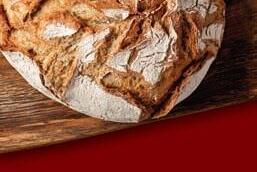
SIMPLIFY THE PIE








I HAVE NEVER COTTONED TO CHAIN OUTFIT PIZZAS. Back in my McMaster University days in Hamilton, Ontario, the idea of soaking up pub night with pepperoni or, God forbid, Hawaiian pizza was to me utterly distasteful. (Ditto Chinese take-away, but that is another story.) I found the crusts soggy, the sauce gloppy and the cheese rubbery.
There were, however, two notable exceptions to my pizza grumpiness. One was the handmade pizza from Aceti’s Pizzeria and Pasta House (forty one years' later it's now called Aceti's Pizzeria and Sports Bar and owned by Matteo Gentile (but the handmade, hand-stretched dough for the pizza remains). The other was the bread pizza from one of the steel city’s Italian bakeries. I would pop into one, usually on a Saturday, for a chunky square lifted from one of the large rectangular slabs baked on metal sheets. I loved the crunchy top with its thin slick of pulpy tomato and sprinkling of dried oregano, or the dribble of olive oil and roasted garlic. The bread was moist and grainy. This style of pizza still speaks to me. It’s still around and has maintained a steady, tasty course.
My real pizza wow moment though happened, not surprisingly,









in Italy years later. Funnily enough it was not in Naples (although I can’t argue against a splendid Neapolitan pizza.) but in a tiny, humble osteria that I stumbled upon while completely lost, as one gets in Venice, on a twisty back street. The slatted chair was uncomfortable, the table was wonky. I didn’t care. The evening was lovely, the wine welcoming and the pie amazing. I remember a crisp almost nutty crust, with a bit of depth in the middle and a puffy rim, spread sparingly with salted, crushed tomato-y tomatoes, which were no doubt tinned since the month was May, and a modest veil of white cheese, presumably fresh mozzarella. Scattered over it were leaves of tender, peppery arugula and a few shavings of ParmigianoReggiano. On the table were set a small bowl of chili flakes and a cruet of delightfully bitter olive oil for drizzling over if you wished.
Maybe it was just due to the time and the place, but ever since, a crisp yeasty crust and spare toppings are my unbending criteria for pizza. Here’s how I top the pie. Milled, fresh, ripe and seeded, or tinned San Marzano, tomatoes, perhaps with basil, are all the “sauce” necessary. For cheese I opt for creamy fior di latte or meltingly good fontina. Bufala mozzarella, although ideal, is not mandatory. A scattering of peppery arugula leaves in spring, basil leaves in summer or bitter rapini in winter enhances the simple pizza margherita without
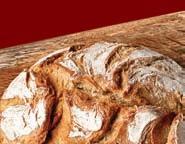
overdoing it. A trio of black olives, anchovies and caramelized red onions are another favourite topping, which pretty much turns the pizza into its close French cousin, pissaladière, the delightful rustic tart found throughout Provence.
Equally satisfying are some non-tomato pizzas or flatbreads. Roasted potato and garlic, or ricotta, kale and toasted walnut are two favourites. But the best white pizza/flatbread in my book is Alsace’s traditional tarte flambée (flammekueche), whose oven-baked crust is layered with tangy fromage blanc, sweet onions and smoky lardons.
Lately I have taken to making the dough, though not, I may add, with resounding success. After a disastrous first effort, a mediocre second attempt, I was (almost) successful on the third try. By the time you read this, however, I will have taken a pizzamaking class. I have no aspirations to become a pizzaiola but I do hope to stretch and steer the dough into a pliable disc.
6JANUARY/FEBRUARY 2018
FOLEPI.CAAGRIUSRESTAURANT.COM
Julie Pegg’s benchmark for the perfect pizza was found in a humble, back street osteria in Venice.
I can certainly buy fresh pizza dough from certain bakeries and grocers. And the very good artisan pizzerias are doing marvellous things with flour, water, a bit of yeast, oil, quality toppings and a hell-fire oven. Making my own though adds to an entire pizza experience. I look forward to spending chilly days turning out pizzettes (mini-pizzas), focaccia, pissaladière, tarte flambée—and a calzone (plural, calzoni) whose filling defies every standard I have for flat pizza. That folded crust oozing with cheese, meat (or anchovies), olives, tomato and is for me perfect cold weather comfort. Now, and much to friends’ relief, I need not bang on about the culinary fast food corruptions that deign to be called pizza. I still wax nostalgic about those pub nights though.
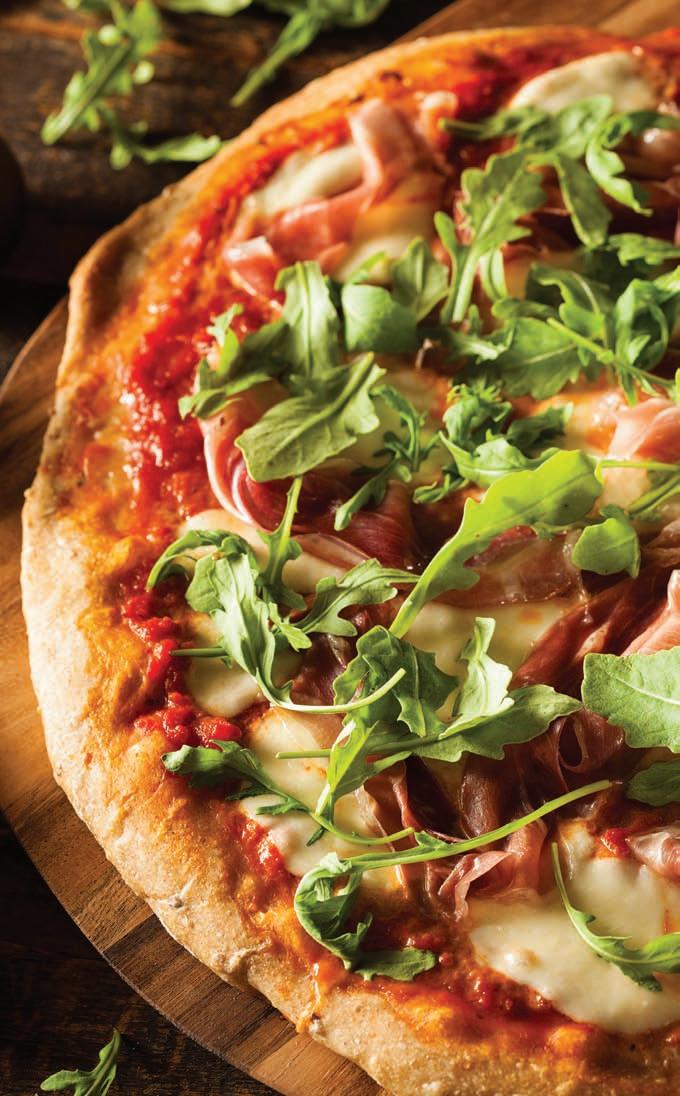
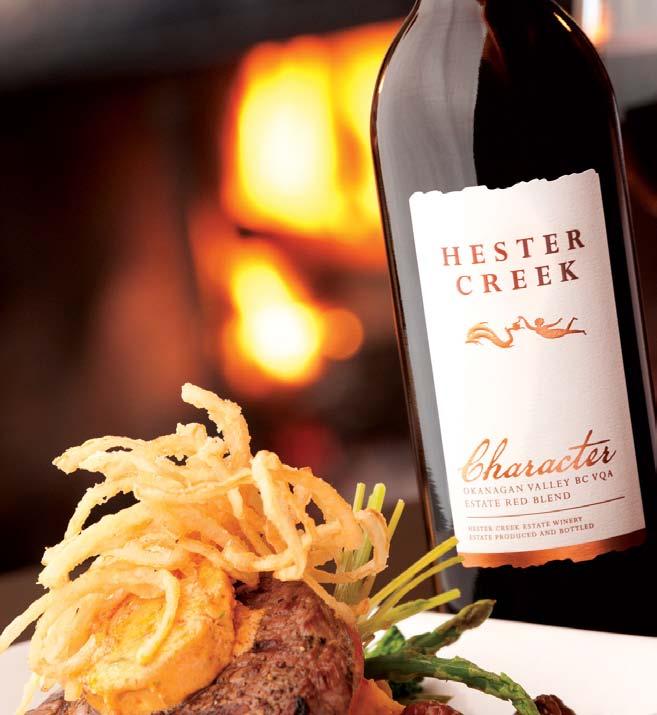
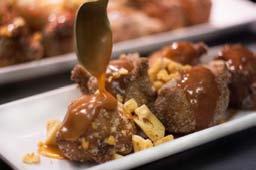




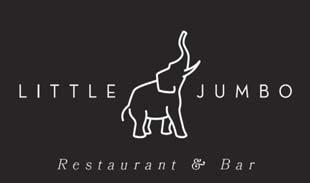
QUALITY, CREATIVITY, & EXECUTION Winter delivers seasonal cocktails, amazing comfort food, rich aromas, and full flavours to maximize your dining & beverage experience. Down the Hall, 506 Fort St. www.li lejumbo.ca 778.433.5535 Reserva ons accepted online Open 7 days a week 5 PM un l late JULIE PEGG
7
Get fresh DELICIOUS CITRUS
Citrus’s naughty by nature proclivities ensure an ever-expanding family tree.













IT’S FUNNY ISN’T IT, THAT FLAVOURS AS ZIPPY AND TROPICAL as those of fresh, in season citrus also serve to celebrate the arrival of winter. The citrus harvest, aligning with the dormant winter of our local farms, creates a delicious distraction from all of the squash and hardy crops we are eating through these cold months.
Though there are thousands of citrus varieties roaming the world, the food industry is dominated by only a few dozen of the finest, hardiest or perhaps just best marketed. This is the citrus 1%, and though they are spectacular, they are only the tip of the iceberg. The 99% is rich, diverse and quite fascinating.

All the delicious citrus we get to enjoy throughout the year comes from three primary ancestors: Citrons, Pomelo and Mandarin. This is not genetic modification, this is nature making gloriously different and delicious babies (hybrids) because almost all citrus has the rare genetic combination of being both sexually compatible and highly prone to mutation. Because of the, ahem, promiscuous nature of citrus, we benefit from an ever-expanding family tree both under cultivation and in the wild. The breeding of citrus has been fascinating scientists for decades but has been
happening in the wild for millions of years. Fossils of citrus leaves date the ancestors of our citrus back seven million years.


The huge spectrum of citrus diversity results in something for everyone. Pithy citrus (Buddha’s Hand, Seville) is ideal for those looking to candy, zest or marmalade the rind. Juicy citrus because fresh OJ makes every breakfast better (Valencias are best, but any citrus in peak season will provide great juice). Peelable citrus for eating out of hand (navels large and small, Tangelo, Mandarins, grapefruits or pomelos) are perfect for snacking and lunch kits. Then there are the novelty citrus varieties for diversity lovers (blood oranges, finger limes, limequat, pink zebra lemons, sweet lemons, the list is infinite). Limes and lemons in all their varieties grace lemonade stands, provide bar drink enhancements or show up in warm lemon water to start your day.
Not everyone likes a kumquat, knows what to do with a finger lime or a Buddah’s Hand, or can be bothered with tart, seedy, hard-to-peel Seville oranges, but there can’t be a soul whose life isn’t enhanced by some branch of the citrus family tree.







 Daisy Orser is co-owner of The Root Cellar Village Green Grocer
Daisy Orser is co-owner of The Root Cellar Village Green Grocer

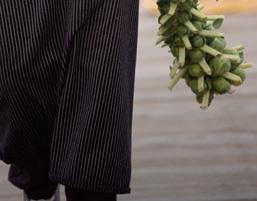






















8JANUARY/FEBRUARY 2018
250 598 8555 | marinarestaurant.com | 1327 Beach Drive at the Oak Bay Marina Brilliantly fresh cuisine by the ocean. BRUSSELS WITH MUSCLES.
SELECTION: Choose citrus that is heavy for its size; this indicates a high water content and you can expect a nice juicy pulp.
STORAGE: Citrus keeps in your fruit bowl just fine but will dehydrate/deteriorate faster. Refrigerated (loose or in a mesh bag, not in plastic) it should last up to several weeks. If juicing or peeling, allow the fruit to regain room temperature before use.
TASTE: Super-sweet to mouth-puckering. There is a citrus for every palate and preference.

TREND: Citrus has influenced cultures around the world for all of recorded history. It has and will continue to influence poets, politics, war, global economies and breakfast, lunch and dinner tables.

SUSTAINABILITY: Citrus thrives on many continents, but most of the world’s citrus is produced in the U.S. Citrus Belt (running from California through Arizona, Texas, along the Gulf Coast and into Florida), the Mediterranean, Asia, Brazil, Mexico and India. Although citrus has been successfully grown on Vancouver Island, there are no commercial growers so buying citrus in season from the U.S. growing region is our most sustainable option unless you grow it yourself.
PREPARATION: Whether you zest, juice, pulp or peel, it is pretty hard to do citrus wrong. Local chef Heidi Fink’s Lemon Feather Cake is a delicious homage to citrus; you’ll use both the juice, and the zest for the cake and the home made lemon curd crème filling. It is light and zippy and will have you looking forward to citrus season. chefheidifink.com
DAISY ORSER
Handmade Ethical Local Traditional CURED AND SMOKED MEATS 2032 OAK BAY AVENUE, VICTORIA 250.590.PORK THEWHOLEBEAST.CA CURED@THEWHOLEBEAST.CA 9 RED POMELO
KFC STANDS FOR KOREAN FRIED CHICKEN
Two restaurants in Victoria now have the Korean chicken phenomenon on the menu.
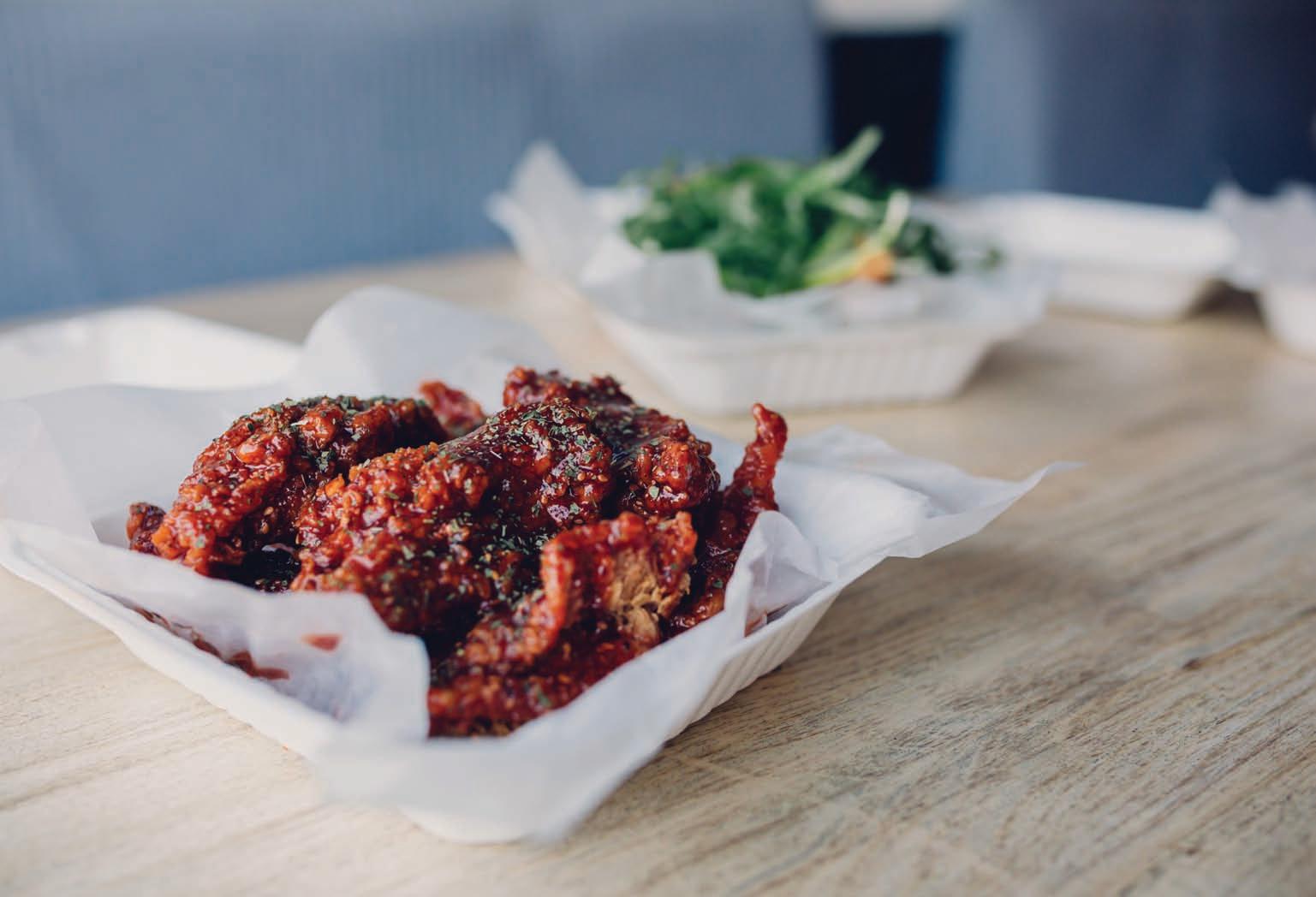 story by ADRIAN PARADIS photography by JOHANN VINCENT
story by ADRIAN PARADIS photography by JOHANN VINCENT
10JANUARY/FEBRUARY 2018
REPORTER
SWEET AND SPICY YANGNYEOM FRIED CHICKEN AT CHICKEN 649
THERE’S
SOMETHING IN THE AIR IN VICTORIA
and it’s the smell of fried chicken and kimchi. Call it serendipitous, or perhaps just fortunate, but within the span of two months, two separate Korean fried chicken restaurants have opened up in our sleepy city. Chicken 649, on Quadra opened in September, and Chimac on Yates opened in early November.
Korean fried chicken—otherwise known as KFC, only without the corporate attachments—has its origins in the 1950s when U.S. troops were stationed in South Korea during the Korean War. During the ’60s and ’70s, American rotisserie chicken became popular in Korea, and fried chicken saw a boom in 1984 when the Kentucky Fried Chicken company brought its franchise to the country. Korean fried chicken, however, is characterized by its papery crust, a twice-fried method and a saucy coating.
While Korean Fried Chicken has been a phenomenon for some time overseas, Tony Yeom, co-owner at Chicken 649, says it’s something new to Victoria. “We tried Korean fried chicken in Victoria and Vancouver, but we thought it didn’t taste like real Korean fried chicken,” he says. “We are very proud of our chicken. It’s more authentic, and I think people know that.”
Yeom’s restaurant has a cozy interior with a casual feel, sparse decor and a limited number of seats. He says that while lunch has been steady, the wait for dinnertime is often over an hour. He suggests calling ahead or ordering takeout. “In our first week, we sold out each day by 6 p.m. We’ve now figured out to prepare a lot, but it’s been really hard work.”
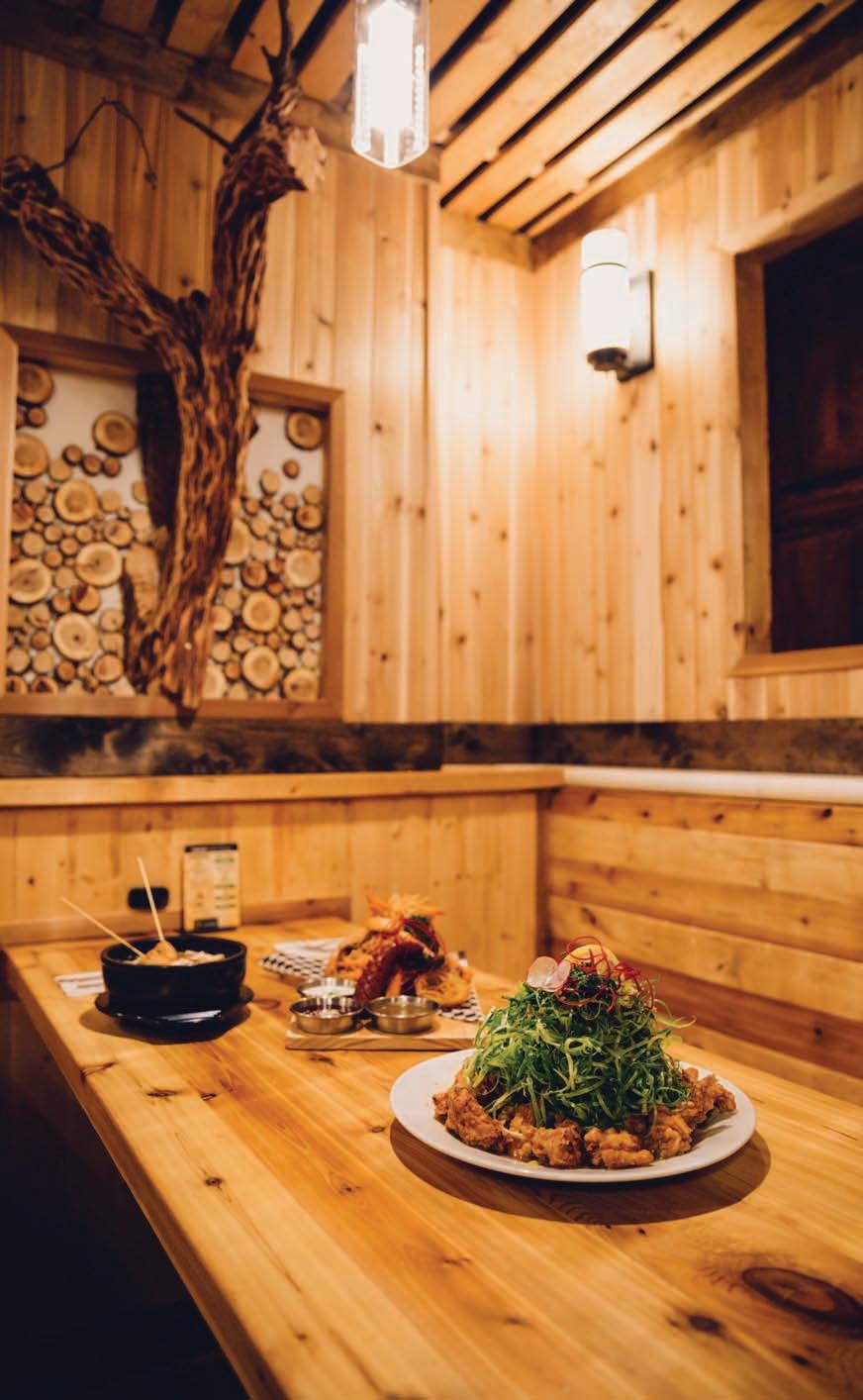
While he will not divulge all his secrets, Yeom says his trick is to marinate the chicken for 24 hours before frying and change the fryer oil twice a day. This is the secret to a crispy exterior and tender interior. Yeom’s chicken lives up to the hype with its enigma of contrasting textures. The Yangnyeom (sweet and spicy) has a sneaky kind of heat to it that builds as you eat. The tangy gochujang (Korean fermented chili paste) adds a depth of sweet/spicy/tangy flavours. The extra crunchy breading has caramel crunchy bits that break away to reveal a tender interior. Yeom says he wants to focus on his chicken, and his menu reflects that. While there are a variety of flavoured sauces to choose from, his menu contains little more than chicken, potato wedges and a few salads. This is fried chicken afterall, not health food?
But while Chicken 649 is simple, focused and low key, Chimac on lower Yates is leaning in the opposite direction. “Here, people can enjoy chicken with beer, music and lights,” says Chimac owner Junwoo Shin. “At nighttime, we put the lights down low so
11 CONTINUED ON FOLLOWING PAGE
“WE ARE VERY PROUD OF OUR CHICKEN. IT’S MORE AUTHENTIC, AND I THINK PEOPLE KNOW THAT.”
LUNCH SPECIAL AT CHIMAC: (6 PIECES OF CHICKEN, ONE SAUSAGE, YAM FRIES, POTATO FRIES, CREAMY SAUCE, SWEET CHILLI SAUCE); FISH CAKE SOUP (IN THE BACKGROUND).
Tony Yeom, co-owner at Chicken 649
NUMBER OF FRIED CHICKEN PLACES IN KOREA HAS INCREASED TO OUTNUMBER
it’s a bit dark, but we have LEDs going. We’re giving people circumstances to drink beer and enjoy music and chicken.”
Shin says the name Chimac comes from a common portmanteau in Korea of the Korean word for beer (maekju) and the English chicken. Located in the former Restaurant Matisse, Chimac has been updated with renovated wood panelled walls, TVs and LED lights circling the room. The music is bassy and party-focused, and indeed, the later the night gets the louder and darker the room becomes.
Shin says he’s bringing something new to Victoria. “Our main thing is Korean fried chicken,” he says. “We just want people to enjoy Korean culture’s fried chicken.” Shin remembers that when he was young in South Korea, it would be a big deal when his father brought home fried chicken after work. , it would be a big deal when his father brought home fried chicken after work. While Chimac’s focus is obviously on its fried chicken, they offer a variety of additional options such as seafood dishes, spicy soups, sweet and sour pork and cheesy corn side dishes. The spicy seafood rice cake dish is an impressive pile of mixed seafood, as well as squishy rice cakes in a spicy chili sauce. But, perhaps the best part of this dish is its disregard for the supposed taboo that seafood and cheese shall not mix. A gooey, melty layer of cheese veils the dish and mixes with the chili sauce beautifully to mellow it out and add a richness of flavour. Also on the menu are options for the more adventurous Eurocentric palate, including silkworm pupa and chicken gizzards. Asked why he thinks fried chicken is seeing a bit of a boom, Shin attributes part of the popularity to a South Korean TV drama called My Love from the Star, a romantic fantasy about a woman who falls in love with both a 400-year-old alien and Korean fried chicken. The drama gained a
massive audience among Chinese viewers, being downloaded 14.5 billion times from December 2013 to February 2014 on Chinese streaming platform iQiyi alone. The abundance of chicken throughout the show sparked a craze for fried chicken in China, as well as a tourism exodus to South Korea.
While the show ended in 2014, the craze for fried chicken did not. In 2015, The Korea Herald reported that, “The number of fried chicken places in Korea has increased to outnumber McDonald’s outlets worldwide.” While Victoria is no stranger to chicken—Korean fried or otherwise—with established joints such as Dak’s Korean rotisserie chicken or Chicken on the Run’s unique “broasted” chicken, these two newcomers will still no doubt offer something unique to the Victoria chicken game while bringing us into the world phenomenon of Korean fried chicken.
Chicken 649
2224 Quadra St, Victoria, BC
(250) 590-6491
Chimac Korean Pub & Fried Chicken
512 Yates St, Victoria, BC
(250) 590-5098

12JANUARY/FEBRUARY 2018
“THE
MCDONALD’S OUTLETS WORLDWIDE.”
The Korea Herald
Fire It Up
Finding a cozy winter refuge one pub at a time.
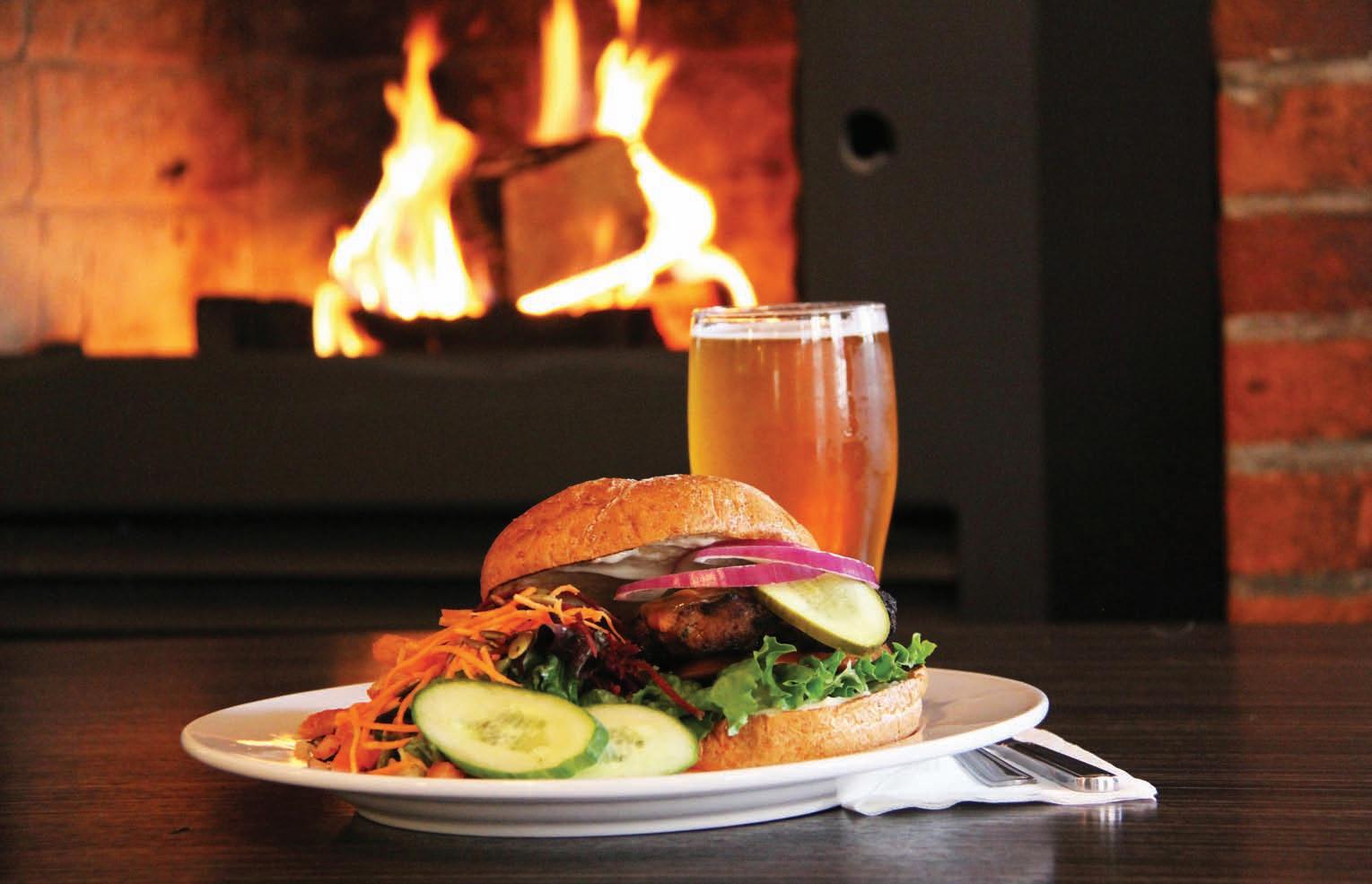
DEEP IN THE THROES OF WINTER, THERE MAY BE NO BETTER PLACE TO BE than in a pub cozied up beside a fire with a warm drink or Guinness in hand. There’s something primordial about being beside a flame, the warmth reaching your bones in a way that baseboard heat doesn’t. Adding an ale makes the cozy fireplace experience feel somewhat medieval. Like you’ve slid onto a wooden bench in an old, low-ceilinged English pub after travelling all day by cart and horse in the rain and trading a sack of wheat for a few pints and a warm meal.
Of course, that’s just a fantasy driven in part by this writer’s obsession with King Henry VIII and Game of Thrones, which can really muddy the accuracy of Old English roleplaying. Regardless, near and dear to the aforementioned fantasy is a pub designed for just such a game. The Crow & Gate Pub in Cedar, south of Nanaimo, has a fireplace your horse could sleep in, low ceilings, dark wooden beams, ploughman’s platters and a host of regulars with their own beer glasses kept at the ready for their inevitable arrival. It’s a place where veterans gather on Remembrance Day and friends and family on Christmas Eve for their own versions of the cozy pub experience.
ADRIEN SALA
PUBS SOUR LEMMY
CONTINUED ON FOLLOWING PAGE
SHERI MARTIN
A COZY FIRE AND THE PUB SIZED- 7OZ HOUSEMADE CHARBROILED BURGER AT GARRICKS HEAD PUB
While driving to Cedar to visit The Crow & Gate is always worth the trip, it may not always be feasible for folks on the south Island. As such, we’ve explored some cozy pubs with fireplaces closer to Victoria. Wood-burning fires go straight to the front of the line, but there are also some pretty cozy pubs with gas fireplaces, seeing how it’s next to impossible to get an operating permit for wood anymore.
Garrick’s Head




Following the resounding success of the renovation at the Garrick’s Head a few years back to create a high-windowed beer hall, people may forget that tucked away in the pub’s nether regions, in the original space that used to be Garrick’s in its entirety, is one of the few wood-burning fireplaces left in downtown Victoria. The fire typically burns all winter, tended by staff as they rush through the now giant space. With a beer list that can make your head spin, it’s a perfect place to duck into during a stormy afternoon while you’re pretending to work. garrickshead.com
The Country Rose
What’s better than one fireplace? Well, two, naturally. You could be forgiven for not knowing The Country Rose, located on the border of Colwood and Metchosin. Until recently it was a woebegone outpost almost exclusively frequented by regulars. That changed recently when the team behind Be Love and Bliss purchased it and gave it a polish. The team doesn’t intend to turn it into another vegetarian space, but they have upped the kitchen game with good quality pub fare and great beer prices. With two fireplaces, it’s the perfect pit stop on the way back from Sooke or Port Renfrew to cozy up and get warm before heading all the way into the city. countryrosepub.com
Penny Farthing
If two is better than one, then the Penny Farthing in Oak Bay is really taking things to the next level. Part of a group of cozy pubs owned by Vic Pub Co., including Irish Times and Bard and Banker, the Penny Farthing boasts four—yes, four—fireplaces (enough, it turns out, that the server
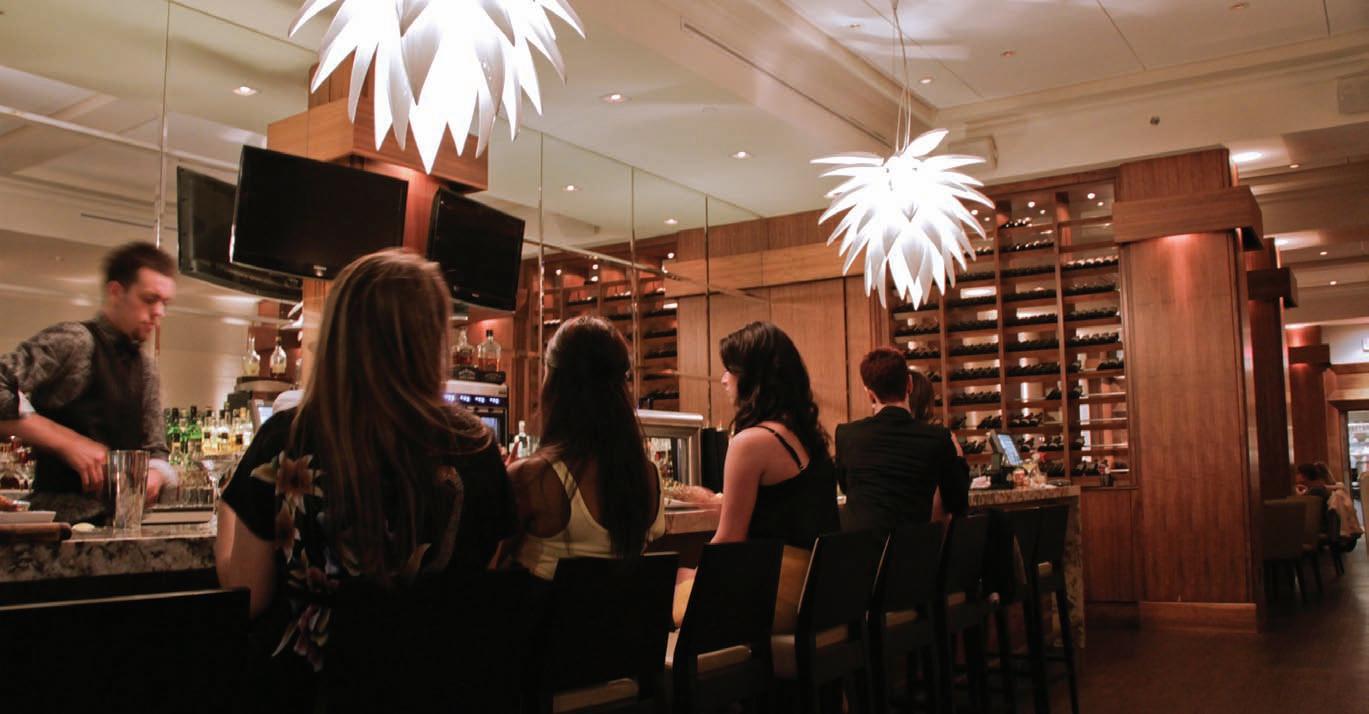
had to actually do a count to verify). A great spot to settle in on a rainy weekend with a paper and a Guinness.
pennyfarthingpub.com
















Crow & Gate Pub
It was mentioned off the top, but it’s worth mentioning again as a place not to be overlooked by the traveller. Load up your Google Maps beforehand, because this gem is literally in the middle of farmland. It’s about a 10 to 15 minute drive off the highway, but insanely worth it for the ultimate cozy pub experience.
crowandgate.ca

4 Mile Brewpub
Housed in a massive 150-year-old Tudor style “Olde English Inn” the 4 Mile Brewpub is rich in atmosphere, with deep, dark wood and several fireplaces. A couple situated in the solarium keep you cozy while you gaze out the windowpanes and watch the weather come down. A few steps up in the main dining area of the pub is another, much larger fireplace, which I’m told is occasionally lit when it gets extra chilly out. The best bit? You can fill a growler on your way out the door as you head out to cozy up at home. fourmilehouse.com
Special Mention: Spinnakers
After a tough year caused by a fire that shut the pub for three months, Spinnakers is open again, providing refuge and great craft beer to sodden Victorians in the thick of winter. Sadly, where once there was a fireplace, there is no longer, understandable considering the challenges caused by the fire. Despite that, Spinnakers remains one of the coziest pubs around and has perhaps the best view of any pub on the island. The guest houses still have their original fireplaces (and are a great spot for a vacation at home) and the whole building feels warm and inviting. The original carriage house was established in 1884, helping make this not only a deeply cozy spot (with free pool), but also an important one in the history of the city. spinnakers.com

14JANUARY/FEBRUARY 2018
COWICHAN
Vancouver
Island’s Food, Wine & Cultural Heartland


On your drive to Tofino, you'll pass through Cowichan. Road tripping Up Island? Sure, you'll have to go through Cowichan. You've been to Duncan, you've stopped for gas in Mill Bay, and you've travelled the Cowichan River in a flimsy inner tube that you're not sure will survive the whole trip. But have you really been to Cowichan? That Highway 1 has a few turnoffs that you might consider taking next time you are driving from A to B. Consider option C because down that road you'll find some of the best wine, the most outstanding food, and some of the most supernatural wonders our little Island has to offer.
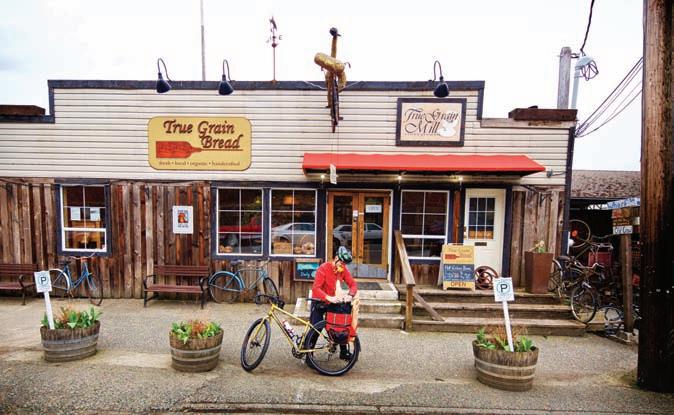
"Cowichan is a region unto its own and is the perfect day trip or weekend destination for Island locals", says Karen Elgersma, Executive Director of Tourism Cowichan. Splitting off from Highway 1 from the Malahat to Crofton and from the coastline, inland to Youbou, heading down one of Cowichan's roads might lead you to any number of hidden gems just waiting to be explored. Turn down Westholme Rd onto Richards Trail, and you'll find Westholme Tea Company, Canada's only producing tea farm. Here you can enjoy carefully crafted, homegrown teas, and browse incredible pottery and ceramics. A short diversion down Cobble Hill Rd will take you to Merridale Cidery & Distillery where you can sample delicious ciders, or a have a bite to eat at the gastropub before a hike through the trails of Maple Mountain. If you're into more of an overnight excursion that isn't too far from home, you could glamp out in one of Merrydale's fully furnished yurts with an open view of the stars.
The Cowichan Valley also offers a true farm-to-table experience. The term, so often misused, is simply a way of life up here. "Cowichan restaurants are actively taking back the phrase and making it mean something again", says Elgersma. Take a trip down the strikingly bucolic Cameron Taggart Rd to Unsworth Vineyards, which boasts some of the best wines in the region. The restaurant at Unsworth offers a Cowichan inspired menu using seasonal ingredients from neighbouring farms and producers. Indeed, many of the restaurants and cafes in the region will provide you with a taste of locally sourced food crafted by people who genuinely appreciate the value of BC farm ingredients. True
Grain is one such place. Heralded as one of the best bakeries in Canada by Huffington post, True Grain uses only Certified Organic BC grown grain and is thoroughly dedicated to supporting local farms and producers in their baking. The variety of vineyards, farmers markets, producing farms, restaurants, and cafes in Cowichan will give you the full experience of the regional cuisine
Cowichan is its own regional entity with a distinct culture and a unique way of life defined by rolling hills and mountains, vast farmland, and fertile soil. If BC is the breadbasket of Canada, then Cowichan is the breadbasket of Vancouver Island. Rich with agricultural diversity, the people of Cowichan are committed to the value of food, craft, and natural splendour. If we may be so bold, Cowichan is Canada's own Provence or Tuscany, providing the foundation for Vancouver Island's culinary allure and distinct regional palate. —by
Jill Van Gyn
TO LEARN MORE ABOUT COWICHAN VISIT WWW.TOURISMCOWICHAN.COM
15 EAT SPECIAL PROMOTION
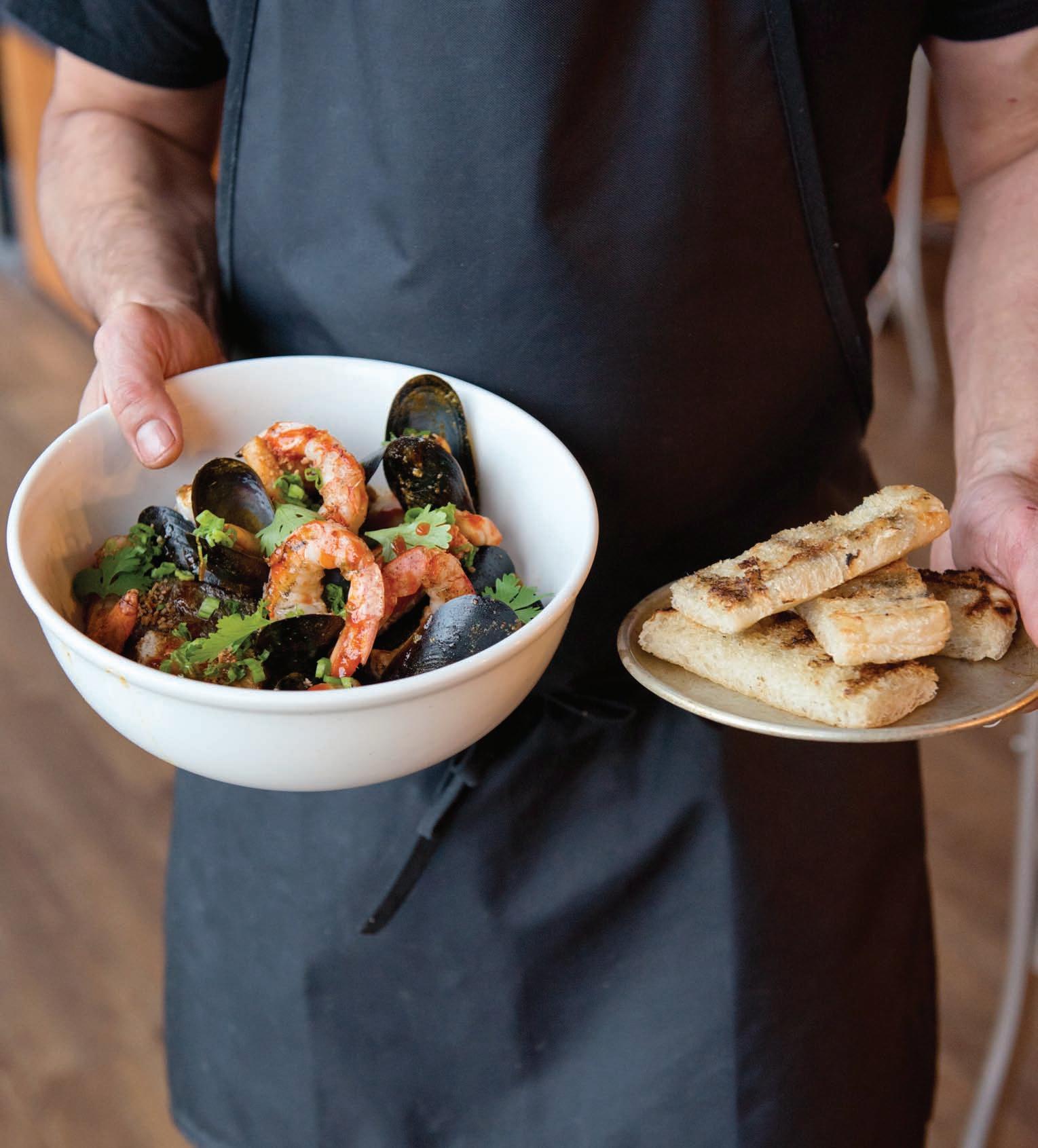 Vin’daloo’d Seafood Hotpot – chargrilled sockeye and rockfish, mussels, smoked squid and prawns, lemony baguette
Vin’daloo’d Seafood Hotpot – chargrilled sockeye and rockfish, mussels, smoked squid and prawns, lemony baguette
FISHOOK AT MERMAID WHARF
FANS OF CHEF KUNAL GHOSE AND HIS POPULAR DOWNTOWN EATERY, FISHHOOK,will be happy to hear that there’s now a new seaside harbourfront location at Mermaid Wharf.

Ghose has expanded into a big, airy room at the base of Swift Street, a tasty addition to the city’s Design District. With 150 seats, including a wharf-side patio next to the water taxi Chinatown terminal, it promises to be a popular summer destination.
But right now it’s a great space for bigger groups and parties, with a larger kitchen that lets Ghose offer his menu family-style or in sharable thali tasting platters.
The dinner menu is an expanded version of the Ocean Wise seafood selections he has popularized at his tiny Fort Commons location over the past three years.
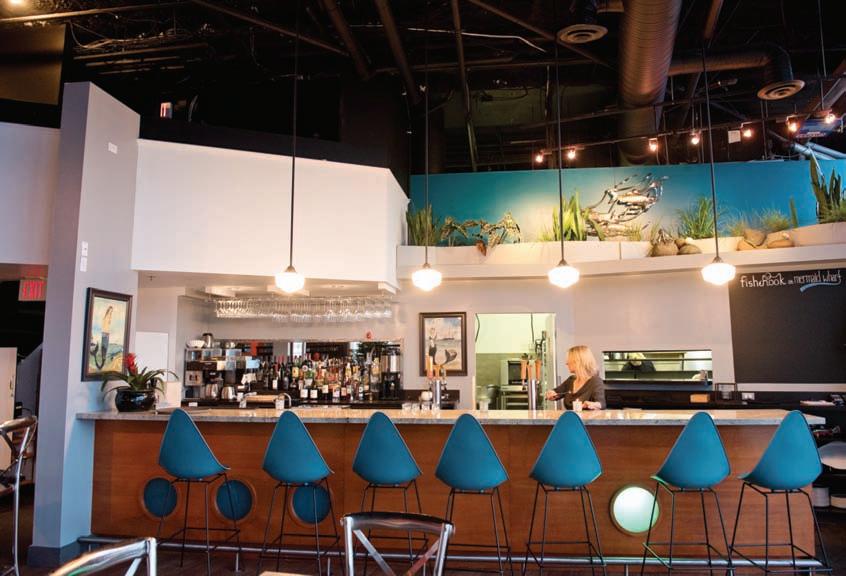
Beyond his open-faced tartines (sandwiches) and curries, you’ll find the hearty Seafood Hotpot and artfully presented main dishes from biryani topped with roasted tandoori salmon to the Daily Khatch of local seafood. There’s luscious smoked sablefish on the menu, seared albacore tuna and Humboldt squid, all Ocean Wise certified and served with his signature Indo-Canadian twist of daily masala and fluffy basmati rice.
Share plates range from seafood charcuterie, pekora-battered Fish ’n’ Frites featuring oysters, salmon, rock cod and tuna belly, or crisp kofta balls, hand-formed and deep-fried to serve with pappadums.
Thanks to a continuing partnership with Steve and Christine Kerr and their Smokemasters shop in Qualicum Beach, which produces hot- and cold-smoked fish, Ghose has a steady supply of smoked salmon belly bacon, salmon and halibut mince for his seafood koftas and fish confit, and frames to flavour the smoky stock for his famous coconut-milkinfused chowder.
We tried the fish curry with the housemade “daily pickle” of seasonal vegetables on the side, the Mermaid Cobb Salad with sweet chili salmon sausage and hard-boiled egg, and a steamy bowl of fresh mussels in a spicy white wine vindaloo broth.
With a new Quest charbroiler on site offering “tandoor-style heat,” the menu expands to include grilled steak and charred seafood options.
There’s even a weekend brunch menu. The benny, with eggs slow-poached at 63°C comes with salmon bacon or melted kale, and there’s a smoky salmon and arugula hash with eggs, both topped with a citrusy hollandaise.
I opted for the Dobosala Eggs, reminiscent of Mexican huevos rancheros, but with crispy fried chana paratha, charred corn and avocado raita adding Indian flair.
Steamy almond milk chai, mimosas or Mermaid Caesars with salmon jerky are the eyeopening beverages of choice.
With Russ Clark now running the kitchen at the original Fishhook location, and Tyler Paquette the head chef at the new Mermaid Wharf spot, Ghose is free to focus on his next project, a casual Indian-Mexican fusion concept called Dobosala Cantina, opening this spring in the new Jawl building on Pandora. With the city’s downtown bike lanes skirting the property, Ghose plans to offer a ride-through window for customers on two wheels, along with a spicy mash-up of international flavours for his breakfast, lunch and dinner menu.
Ghose was one of the originators of the still-bustling Red Fish, Blue Fish and a contestant on Top Chef Canada. There’s always something creative bubbling away in the mind of this trendsetting chef. Stay tuned. CINDA CHAVICH
407 SWIFT STREET, VICTORIA 250-590-6988 | FISHHOOKVIC.COM
REBECCA WELLMAN
LEFT: Chef Kunal Ghose RIGHT: The interior at Fishhook Mermaid Wharf
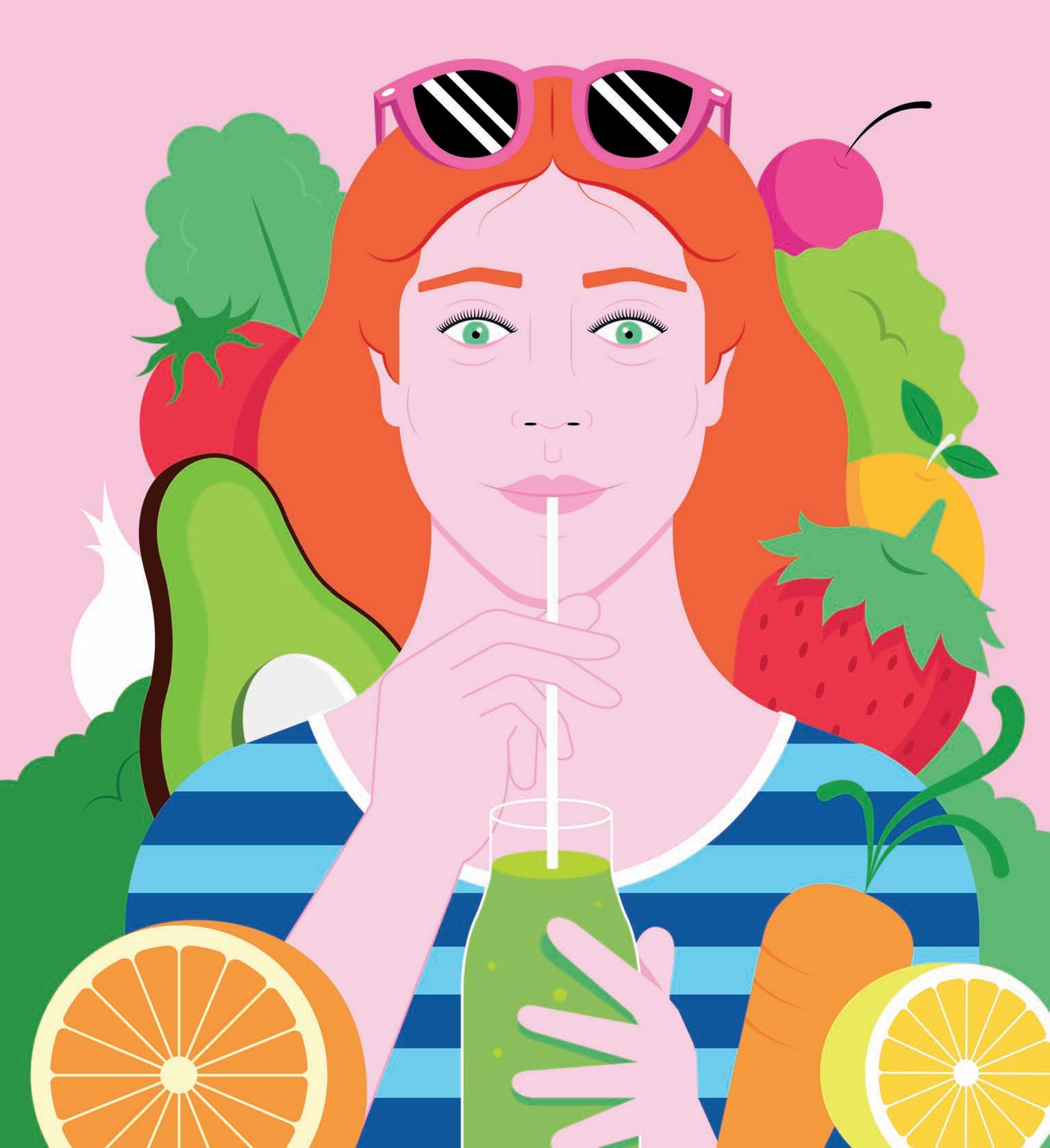
Got Smoothie?
ONE
OF THE FASTEST GROWING TRENDS ON THE LOCAL FOOD SCENE
is what nutritional therapy practitioner Ellie Shortt calls “the liquid nutrition gang.” Juices, elixirs, shakes and smoothies are now produced locally and available at numerous restaurants, markets and juice bars.
“I’m delighted to see the ongoing expansion of health-conscious dining options in Victoria,” enthused Shortt, who teaches wellness-oriented cooking classes at London Chef and has a blog called Whole Happy. “The flourishing healthy food scene means more opportunities for my clients to make wellness-oriented choices while dining out or on the go.”
Shortt sees juices, elixirs, shakes and smoothies as having “the power to be extremely healing and rather convenient.” But she also warns they can be “potentially harmful,” citing commercially produced sugary, fruit-based juices’ impact on blood sugar levels. As well, mass-produced over-processed and chemical-laden protein powders and other additives in some shakes and smoothies can be a problem.
I had been really sick for a couple of weeks when I began work on this story and mentioned my illness to Kai Yates, co-owner of K and I Juice Company during our interview. A local wholesale operation launched in August 2015 with shelf space in Whole Foods, Mother Nature Market in Cook Street Village and at Nourish Kitchen and Café, K and I produces a variety of seasonal, organic, cold-pressed juices made with leafy greens, oranges and other fruit and herbs as well as a Detox Tea Pack based on Ayurvedic principles. I mentioned that I wasn’t feeling well, and Kai offered to drop off one of her One-Day Cleanse packages on her next delivery trip near my neighbourhood.
Kai Yates has held sold-out juicing and cleansing workshops at Nourish Kitchen in 2017 and plans more workshops in 2018. Check the website, kandijuice.com, for info and to order their products online.
Nourish Kitchen and Café is famous for their organic bone broth. It’s high in protein, vitamins, minerals and collagen. Mermaid in a Jug, broth with seaweed sprinkles, and Golden Eye Broth, with turmeric and cardamom oil, are even better for you. Nourish’s Rosemary Lemonade, Sour Cherry Chill (with organic sour cherry elixir, Phillips tonic and fresh herbs) and Moonlight Mama Elixir are other cold beverage favourites on the menu at Nourish.
Moonshine Mama’s Elixirs and Tonics grew out of Salt Spring owner-operator Melina Davers’s bouts with chemo and radiation treatments. Products include Turmeric Elixir with fresh lemon juice, fresh ginger and honey, as well as Sour Cherry Turmeric Elixir.
At vegetarian and vegan restaurant Be Love, the nourishing rhizome also takes the lead, in its kombucha and in many fresh juices. The dinner, lunch, brunch and full bar menu (try the Kombucha Whisky Sour using Cathy’s Kombucha) also includes several varieties of smoothies. My favourite, Sunshine, is made with strawberry, banana, orange juice, camu camu, lemon and liquid vitamin D. High in Vitamin C, and despite all those healthy ingredients, Sunshine tastes like a creamsicle. Another downtown gem providing daily offerings of fresh-made fruit and vegetable juices is Café Bliss. All are 100 percent seasonal, organic and low-temperature pressed. They also offer one ounce wheatgrass shots, pure raw chocolate shakes and
Text: Joseph Blake
Illustration: Eliot Wyatt
Photography: Sherri Martins
numerous super-food smoothies using mushroom blends, camu, spirulina, probiotic and enzyme powders, algae powder and dried grass powders into a base of banana or avocado. All are made from scratch.
Vegan Hippie Chick Café’s Vegan Brew is a coffee substitute “with a boost like coffee without the crash.” It’s made from a house blend of maca (a powdered Andean radishlike root), cacao, matcha, coconut oil, coconut sugar and house-made almond mylk. A self-described Hippie Chick, Karen Rousseau is a wizard with the café’s singular concoctions, and her Spicy Hippie Brew is another delicious blend of cacao, cinnamon, cayenne, maca, coconut oil, coconut sugar and almond mylk. Fragrant and delicious Matcha Latte is another favourite as are her signature organic Veganarchist Tea and Yoga Tea.
Jusu Bar’s Bruce Mullen opened his first shop in Cadboro Bay as a memorial to his wife’s battle with cancer. The shop’s recipe of 100 percent organic cold-pressed juices caught on, and the company now operates a processing plant in Chinatown, a shop on Oak Bay Avenue and shops in Vancouver and Calgary. They’ve also expanded their food offerings of wraps, smoothies in a bowl and baked goods, but their nutritional drinks are still the heart of Jusu’s business. These include green drinks that detoxify the body, fruit juices packed with digestive enzymes and antioxidants, and root juices, including what Jusu calls The Classic, high in vitamins and nutrients.
West Saanich Road’s Rawthentic Eatery offers vegan food with a beverage menu, including kombucha on tap and wheatgrass cocktails mixed with fresh apple and carrot juice. A large list of fresh juices are topped by a beet, carrot, apple, ginger and lemon mix called Beet Treat and C Plus, an orange, lemon and apple juice concoction mixed with ginger and turmeric. Rawthentic’s beverage menu also has six smoothies. Antioxidant smoothies mix acai, goji, chia seeds, dates, spinach, blueberries and lemon with coconut water. Mango Lemon Zinger is made with apple juice, dates, banana, mango, spinach, lime and ginger.
Two outlets of Fresh Coast Health Food Bar, one in Shelbourne Plaza, the other in the North Park section of Cook Street, serve kombucha on tap. They also offer Detox Lemonade made from fresh-squeezed lemons and a mix of activated charcoal, bentonite clay and zeolite. It’s good for colds and hangovers. Fresh Coast also has nine smoothies made with whole fruits and vegetables. Little Tribune Bay, named in honour of Hornby Island’s nude beach, is a stripped-down smoothie made with pineapple, mango, coconut milk, banana and honey.
Power House Living Foods in Uptown also has two outlets in Nanaimo and another in Duncan. The vegan, raw-food-oriented chain offers nine fresh juices, 14 mylk shakes made with daily-ground whole nut mylk, plus fruits, greens, herbs, vanilla and superfoods like agave. The beverage menu also includes nine smoothies in 16-ounce and 24-ounce sizes.
One of Victoria’s oldest and most popular vegetarian restaurants is Rebar Modern Food in Bastion Square. At Rebar, all juices, smoothies, wheatgrass and elixirs are made to order. You can get a wheatgrass single shot for $3 and a double for $5. In addition to a wide range of fruit and vegetable juices and fruit smoothies with soy milk and almond milk, Rebar offers tonics, including Party Rescue Hangover Tonic. I’m going to have to try that some early morning.
I was working on this story and heading into week three of feeling unwell when K and
19
HEALTHY DRINKS LIKE JUICES, ELIXIRS AND SMOOTHIES GIVE HIGH-SPEED ACCESS TO POTENT NUTRITION.


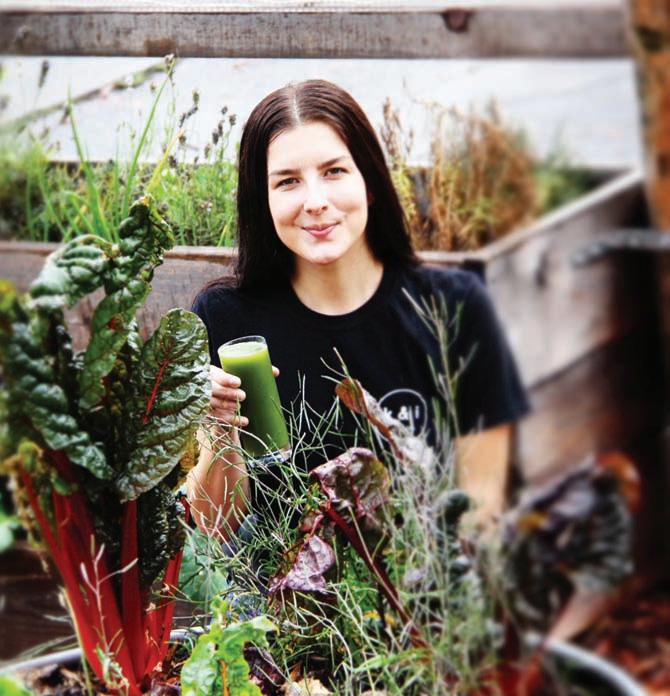
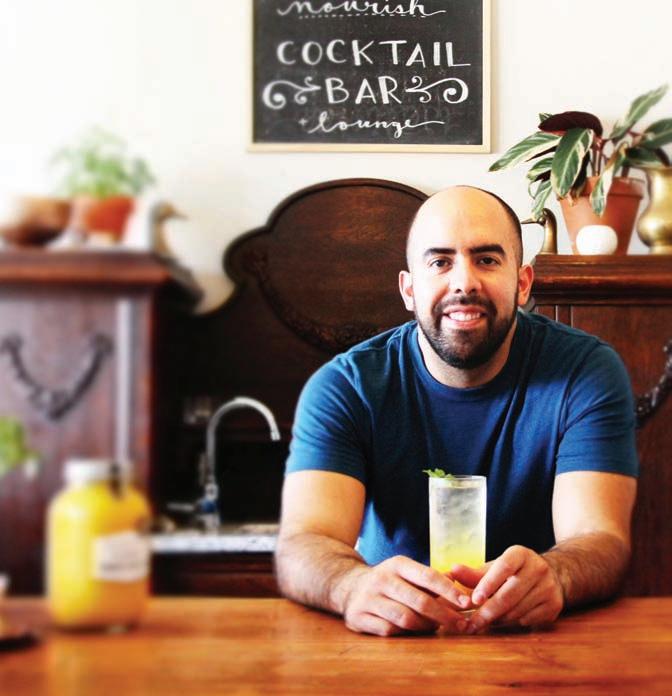
20JANUARY/FEBRUARY 2018
Kai Yates of K and I Juice Company with Lean Green Juice
Chef Sergio Hernandez of Nourish Kitchen and Café with Moonlight Mama Elixir
Heather Cunliff of Be Love with their Liver Cleanse (Orange, grapefruit, beet, ginger, lemon, cayenne)
Sevina Vatuloka of Café Bliss with Jedi Smoothie
I Juice delivered a box to my front door one morning. Inside were four jars of juice, a package of Detox Tea and a carton of bone broth, the ingredients for my one-day juice cleanser regime. For breakfast I had the Master Detox made with lemon, maple syrup, chia seed, cayenne and alkaline water. Next was Lean Green. The cucumber, apple, spinach, kale, celery, dandelion, mint, lemon and aloe juice was delicious! Orange Fighter (orange, carrot, pineapple, ginger, turmeric) was equally delicious. I probably drank it too fast and felt a little woozy. Maybe it was the effects of the cleanse, but I took a short nap and sipped the Protein Fix (almond, plant protein, date, chia seeds, vanilla) for lunch. I drank a large pot of Detox Tea before having my bone broth for dinner. When I woke the next morning, I felt great, the first time I had felt really well in weeks. I guess I’ve joined what Ellie Shortt calls the “Liquid Nutrition Gang.”
Whole Happy wholehappy.com
K and I Juice Company kandijuice.com
Nourish Kitchen and Café nourishkitchen.ca
Moonshine Mama’s Elixirs and Tonics moonshinemamas.ca
be love
beloverestaurant.ca

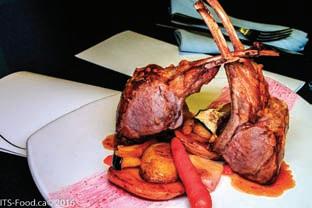
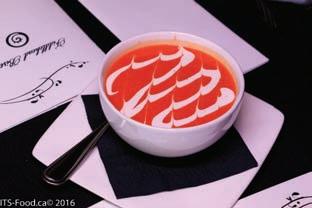
Café Bliss cafebliss.ca
Vegan Hippie Chick Café veganhippiechick.com
Jusu Bars
Multiple locations, jusubar.com
Rawthentic Eatery
veganrawfoodrestaurant.com
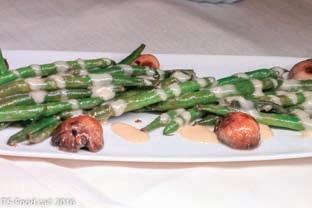
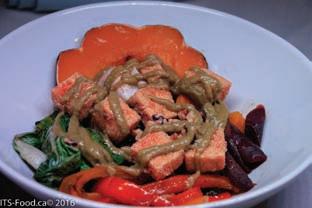
Fresh Coast Health Food Bar
freshcoasthealthfoodbar.com
Power House Living Foods powerhouseliving.ca
Rebar Modern Food rebarmodernfood.com
WHAT’S IN THE GLASS
The beverages described in this story aren’t exactly the type found in cans in supermarket freezers or plastic containers on shop shelves. Most of those have been preserved by cooking or chemical additives. Healthy juice, sometimes referred to as live or raw juice, is extracted by pressing or other forms of extracting the juice from the pulp of whole fruits and vegetables. This process creates varying degrees of friction, which in turn create heat and subsequent vitamin loss, as does the oxidization of the juice over time. Cold-pressed and freshsqueezed are nebulous terms, but generally the colder the process, and the fresher the product, the better. Local, seasonal, organically grown fruits and vegetables make a premium juice. Elixir is another confusing term, but a general description of elixir is any sweet liquid used for a medicinal purpose. For our purposes and expanded definition of fruit or vegetable juice, an elixir includes a spice or herb that has an action, including hormone balancing, digestive supportive, cleansing or anti-inflammatory (like turmeric.) Elixirs might also include a natural sweetener, a healthy source of fat and a bit of protein.
Shakes and smoothies are blender drinks that use fruits and vegetables (often frozen) in concoctions that also may include yogurt, coconut, soy, almond and other milks created by grinding the nuts into mixtures (sometimes labelled “mylk”). Banana, avocado, mango and other natural thickening agents create a smoothie’s creamy texture.
—J.
Located in the Harbour City, Fiddlehead Bistro is proud to call Nanaimo BC its home for the past 2.5 years. Ever since the beginnings of this Nanaimo Restaurant, the Fiddlehead Bistro has been on a mission to provide the most local, organic and freshest ingredients to its customers.
The humble restaurant is always wanting to insure that we maintain the highest quality of food, beverages and service to our customers from Nanaimo and abroad.
The Fiddlehead menu provides patrons with local seafood, vegan options and a revolving menu to best suit what is in season on Vancouver Island. The food is a perfect balance of local flavors to compliment a west coast fine dining experience.
Come see us at the Fiddlehead Bistro
Now open 7 days a week from 5 pm - 9 pm. Reservations: www.fhbn.ca
21
B.
Fiddlehead Bistro - Island Defined.
The Politics of food
FOOD AND CULTURAL APPROPRIATION
In part 3 of Jill Van Gyn’s series on the politics of food, the debate isn’t about food, it’s about privilege: who gets the opportunity to bring a certain food into the mainstream and who gets to make a buck
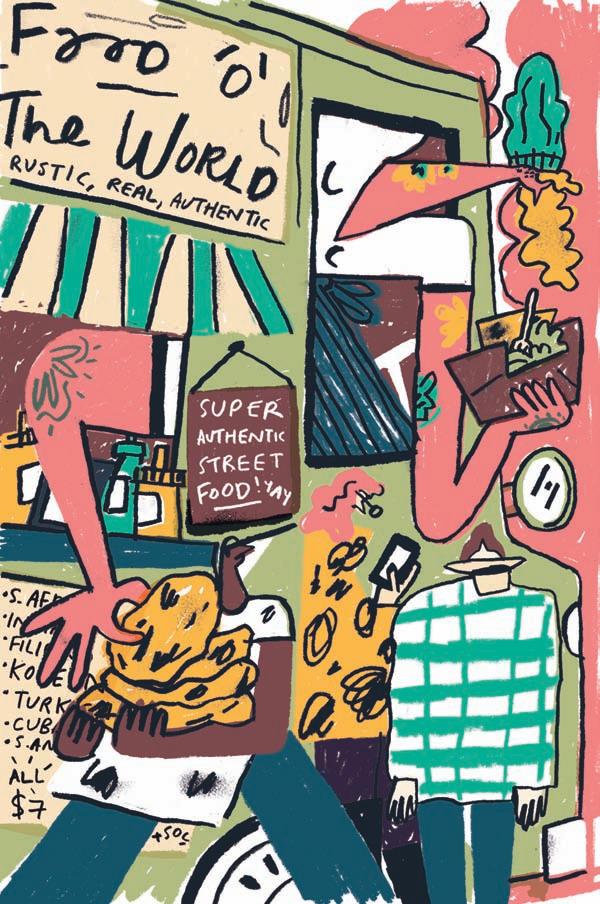
off
it?
ILLUSTRATION BY DAVID MCMILLAN
brought their findings home to the authenticity-craving crowd of Portland. However, many people of colour in Portland’s food community saw this as cultural theft in which two privileged white women were able to profit off the culturally significant craft of tortilla making, a tradition passed down from mother to daughter for generations.
Over the past decade, people of colour have seen the food of their homeland, their ancestors and their families turned into sweeping trends. These trends pop up in real life on the corners of gentrified neighbourhoods under the ownership of chefs and entrepreneurs who claim to be offering something new, exciting and exotic. It smacks of a new wave colonization and takes opportunities away from those who have a real and significant stake in the food of their culture.
It’s a tough debate to wrap your head around, particularly if you’re new to the conversation or if it’s something that doesn’t affect you directly. But in the age of identity politics where race, gender, class and culture are up for debate in every corner of our lives, it should come as no surprise that food has become a political matter. The question that comes up around the cultural appropriation of food is “Does it even matter?” (followed by a “let people cook what they want” and a healthy eye roll), which dismisses a really important conversation. In John T. Edge’s recent book, The Potlikker Papers, which looks at the unspoken history of southern food, he puts forth that “conversations about food have offered paths to bigger truths about race and identity, gender and ethnicity, subjugation and creativity.” Food in southern black communities was a means of cultural currency and a way to construct a black identity through the Jim Crow and segregation eras. Food is important to culture. It fills in gaps in histories that have been erased, and preserving and protecting that history has value. This makes food a political matter and therefore worthy of debate.
Both Canada and the United States have been touted as “melting pots” or “mosaics” of cultural and ethnic diversity. Despite the fact that the rhetoric may be somewhat more overt today, immigrant families have always faced isolation and discrimination. Food has been a means of insulating communities from the harsh realities of immigrating to a foreign country. Staying connected to the culture by passing down recipes, teaching cooking techniques as generational gifts and opening restaurants, food trucks and street carts as a way to survive, persist and preserve has all been done with a commitment to the cultural importance of food.
It becomes very easy to write off a taco as something that is available everywhere to everyone. It’s just a tortilla with some meat in it, right? But to others it is heritage; the making of tortillas is rooted in a deep cultural history. Yes, we love the access we have to all sorts of interesting food. It’s one of the reasons our interest in food never waivers—there are always new things to try. However, there needs to be space for the papusa lady running a cart in Queens, New York, to move her cooking into the mainstream without being drowned out by the hip new papusa joint around the corner opened by a couple of bros that got approved for a bank loan (true story). The debate isn’t about food, it’s about privilege: who gets the opportunities to bring this food into the mainstream and who gets to make a buck off it? I’ll tell you one thing, it’s not the papusa lady.
HACKLES GO UP IMMEDIATELY when the topic of cultural appropriation of food is broached because the conversation has an underlying implication that there are areas of “ownership” in food. To be clear, no one is telling you to put down the tagine pot or your tortilla press. We’re just here to have a little talk about food, culture and some things we may have gotten wrong.
Let’s kick things off by asking what is the cultural appropriation of food? Simply put, it’s the use of a cultural cuisine by another (usually more economically dominant) culture and presenting it as exotic, new or rediscovered.
The conversation really jumped into the zeitgeist this past May when two young white women headed to Puerto Nuevo, Mexico, “picked the brains of every tortilla lady,” returned to Portland and opened up a burritos cart featuring authentic Mexican tortillas. On the surface this seems like the women did some good cultural research and then
It’s not really that you’re cooking another culture’s food. It’s the lack of deep cultural exploration and a disinterest in racial power structures and racial privilege. The foundation lies in intent and method. Why are you doing it and what are your methods? Are you taking up space that could be filled by people from that culture? Are you involving and/or listening to voices about how the food should be prepared, served and presented? Are you giving back to the community or contributing in some way? Maybe if the Portland tortilla thieves had committed to giving $1 from every burrito sold to a women’s business collective in Puerto Nueva, things wouldn’t have gone down so poorly for them. Maybe.
Listen, I get it—you want to cook whatever you want. There shouldn’t be food rules; nobody “owns” tamales, ramen, kimchi or pho. But instead of rejecting the conversation out of hand, we should be listening to the people who are pushing back against that narrative and turn to them for dialogue and solutions. Food should be a unifier and an equalizer, and it can be if we can face some of the uglier truths we’ve decided don’t apply to us.
22JANUARY/FEBRUARY 2018 22
The Ethics of Eating: Deforestation and the Cow in the Room Last in a Four-Part Series
When you live in a vast country like ours, it can be hard to grasp that there is a shortage of arable land. This is land that can be used to cultivate food and is under constant pressure from urbanization. Forest land is also under pressure due to the cultivation of food and the breeding of animals. Between 1990 and 2015, 129 million hectares were lost to global deforestation (not including temporary loss due to sustainable tree harvesting and forest fires), which is an area equal to 38% of Canada’s forests1 . Why does this matter?
Canada’ f ot ares were lost t hect
his mat t s forests orest fires), o were animals. Between 1990 and he food and t rom pressure
Forests matter because t
he cultivation of f due to t f T count rbingbso r a fo planet of do hey
s serve . For or For f
Forests matter because they act for the planet like a number of vital organs do for our body. Forests serve as lungs for the planet, absorbing carbon dioxide and releasing oxygen. They have a kidney- and liver-like function of filtering, purifying and regulating our water supply. They also limit soil erosion.
hey filtering, T
, f In our
So, while we can talk about the necessity of reducing others’ consumption of palm oil, we believe our passion for meat represents the elephant in the room. Canadians consume on average over 90 kilograms of meat, putting us in 14 th place globally6. In addition to driving deforestation, livestock production in North America relies on the production of grain to feed the livestock. A kilogram of beef production requires 25kg of grain and 15,000 litres of water7
ion merica f orest o def . In addition t
hat there is a o like s dig int That’ in a CIBC W





































his is land that can be used to cultivate food and is ry t so That’. way
product North globally t f ter?h is mat
he Blue Heron At t
or elephant t y the necessit cial and
water res of grain lit A n, production atio
, ood
ying o supply han of annual supply unt
soil erosion. heyT .
s orestland to the f

o the W According t .
In our view, the conversion of forestland to the raising of specialty crops and livestock is likely not a hallmark of progress but rather the offshoot of dietary choices. Palm oil production has received a lot of press as its global consumption has quadrupled since 19952 . As a result, lush biodiverse jungle is being turned into single crop plantations. According to the World Wildlife Fund, an area the equivalent size of 300 football fields of rainforest is cleared each hour to make way for palm oil production3 . North America and Europe consume an increasing amount of palm oil and a large amount per capita, but in a global sense, use less than 15% of annual global supply4. So for the average Canadian, what changes to our behavior can resultin the greatest reduction of deforestation?
At the Blue Heron Advisory Group of CIBC Wood Gundy, we are passionate about investing our clients’ money in a socially responsible and sustainable way. That’s why we dig deeper into topics like deforestation and choose investments that pass our comprehensive environmental, social and governance (ESG) screening process. We believe that this results in a portfolio of better managed companies, with less risk and the opportunity to out perform. Simply put, in our view, better companies make better portfolios.
. North ields of rainforest is cleared
view ter t of bet
, . better
W pe e hoeW
W est reduction of .
ll have a e think that we a king series loo yednjo
Sources:
http “Meat CD Data. 6 OE The natio elegraph.evealed: “R T The 5 alm lligence. “P Inte n Fro “Deforestatio 1 WWF Global.


While palm oil is a major global issue, research suggests that livestock production has 10 times the effect on deforestation than palm oil production, followed by soybean production, at twice the deforestation impact5!
ion, the impact orestation has 10 times the effect on def


/wwf.panda.org/about_our_earth :/nts” nhttp
d comes from so t oo where our f anding f


out o pportunity t he o hat portfo e may
ter have a bet tionon obligat
collect
a e believe that . W ive behaviorr. hat
We hope you have enjoyed our series looking at the complex problems around the ethics of eating. We think that we all have an obligation to have a better understanding of where our food comes from so that we may be in a better position to change our individual and collective behavior. We believe that a greater awareness of these issues will help us properly value and preserve the delicate supply chain that allows us to prosper.
o learn more about T To
he room. of y h consume ation?orestdef changes can great t amo o palm production each hour t f plantations. 1995 alm choices. P


value
ildlife orld W o isorygroup@ blueheronadv us t he Blue Heron T o
prosper
osperr.
To learn more about The Blue Heron Advisory Group, contact us today at 250 361-2284 or blueheronadvisorygroup@cibc.ca.




e believe t cibc.ca. oday at

ith Comes W Asia Southeast inwth Oil: Gro



te-in/gros:/ http Price HighAith our_earth/deforestation/deforestatio


oup Gundy V dvisory r
1 WWF Global. “Deforestation Fronts” http://wwf.panda.org/about_our_earth/deforestation/deforestation_fronts/

ollowed product f def suggest tp://a s of Food” ht Conficienefervertt
s://data.oecd.org/agroutp capita” meat e least theatsat n th








6 OECD Data. “Meat Consumption” https://data.oecd.org/agroutput/meat-consumption.htm
7 A Well-Fed World. “Animals are Inefficient Converters of Food” http://awfw.org/feed-ratios/


s that livestock clients’ our r tfolio manager por Gr Heron ron .org/feed-ratios/ meat-consumption.htm
Neil Chappell and Graham Isenegger are Investment Advisors with the Blue Heron Advisory Group of CIBC Wood Gundy in Victoria. We are a team of portfolio managers who are passionate about living our lives—and managing our clients’ money—in a socially responsible and sustainable way.
nts/
e e ar ia. W We ar ictor dy Victor
esponsible way r nts’ e s who ar o
2, 3, 4 GRO Intelligence. “Palm Oil: Growth in Southeast Asia Comes With A High Price Tag” https://gro-intelligence.com/insights/palm-oil-production-and-demand
/www.telegraph.co.uk/travel/map http:/ lligence.com/in
e Investment ar appell r cording-to-me d- graphics/world-ac k/travel/maps-an lligence.com/insights/palm-oil-production-and-deman
5 The Telegraph. “Revealed: The nation that eats the least meat per capita” http://www.telegraph.co.uk/travel/maps-and- graphics/world-according-to-meat-consumption/
s with the Blue Advisorrs g-to-meat-consumption/
. ble
lio ld. “Animals are In or ell-Fed W W A
CIBC Wood Gundy is a division of CIBC World Markets Inc., a subsidiary of CIBC and a Member of the Canadian Investor Protection Fund and Investment Industry Regulatory Organization of Canada. If you are currently a CIBC Wood Gundy client, please contact your Investment Advisor. The views of the Blue Heron Advisory Group do not necessarily reflect those of CIBC World Markets Inc.
questions about your portfolio deserve
answers. Let’s start a conversation. BETTER COMPANIES MAKE FOR In this simple guide, we explain how we find better companies to invest in. Ask us for it! www.blueherongroup.ca Blue Heron Advisory Group | (250) 361-2284
Your
thoughtful
Shouldn't your investment decisions leave a good taste in your mouth?
7
ood Gundy clie W
L Yo RANIES
ood CIBC W W
guide rldo nt, a www W
companie , we explain s start a conversation. et’ our .blueherongroup
A
B P of the Blue Heron the Canadian In
OR COMP
do ws Indust ection Fund and Investment Povesttror f
orld Markets Inc. Cana ation of f Canada. If ry Organiz egulato ry R Indust
KOREA, MOROCCO PORTUGAL,
Travel the globe on your lunch hour.
King Sejong
650 YATES ST. NEAR DOUGLAS | 250-382-1289 | KINGSEJONGRESTAURANT.COM
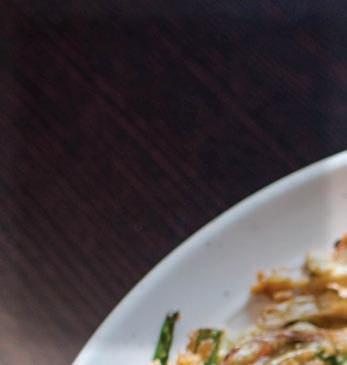
I recently made a presentation about my job as a food writer to two English as Another Language classes at the University of Victoria, and I finished by asking students where they like to eat. In both classes, Korean students told me unequivocally to try King Sejong. The authenticity of the restaurant was further confirmed when Korean customers streamed in while I was enjoying my lunch. Perhaps part of the reason is that dishes on the weekday lunch menu start as low as $9.95 for Jeyuk Deopbap, pan-fried pork, cabbage and onions in a vibrant and complex sauce of hot chili paste, soy sauce, garlic, ginger and hot pepper flakes. A vegetarian option at lunchtime is Bibimbap for $10.95. This piping-hot rice bowl is a festival of colours featuring a poached egg surrounded by shredded and sliced lettuce, carrots, spinach and shiitake. A chili sauce called Gochujang is already on the table, and Koreans squirt on the hot sauce, then mix up the whole bowl with their chopsticks. But what is the number one comfort food ordered by the Korean clientele? The Kimchi Sundubu, kimchi soup with mounds of very soft tofu and a golden egg in the middle. Don’t be disturbed by the awkward menu wording, which promises a “half-cooked egg. It is, in fact, poached. Another kind of comfort is hanging out with friends over a beer or a Korean alcoholic beverage called Soju. That’s when one turns to the menu section with the inviting heading “Side Dish for Drinking.” These are large dishes for sharing, much as Westerners might order nachos. The Haemul Pajeon for $13.95 is a huge savoury seafood pancake. The chef manages the tricky feat of marrying a fluffy interior with a crispy surface. Green onion is used as the dominant vegetable, not as a garnish, so the pancake has ripples of dark green from the onion tops. (This dish is meant for sharing, but you don’t have to.)
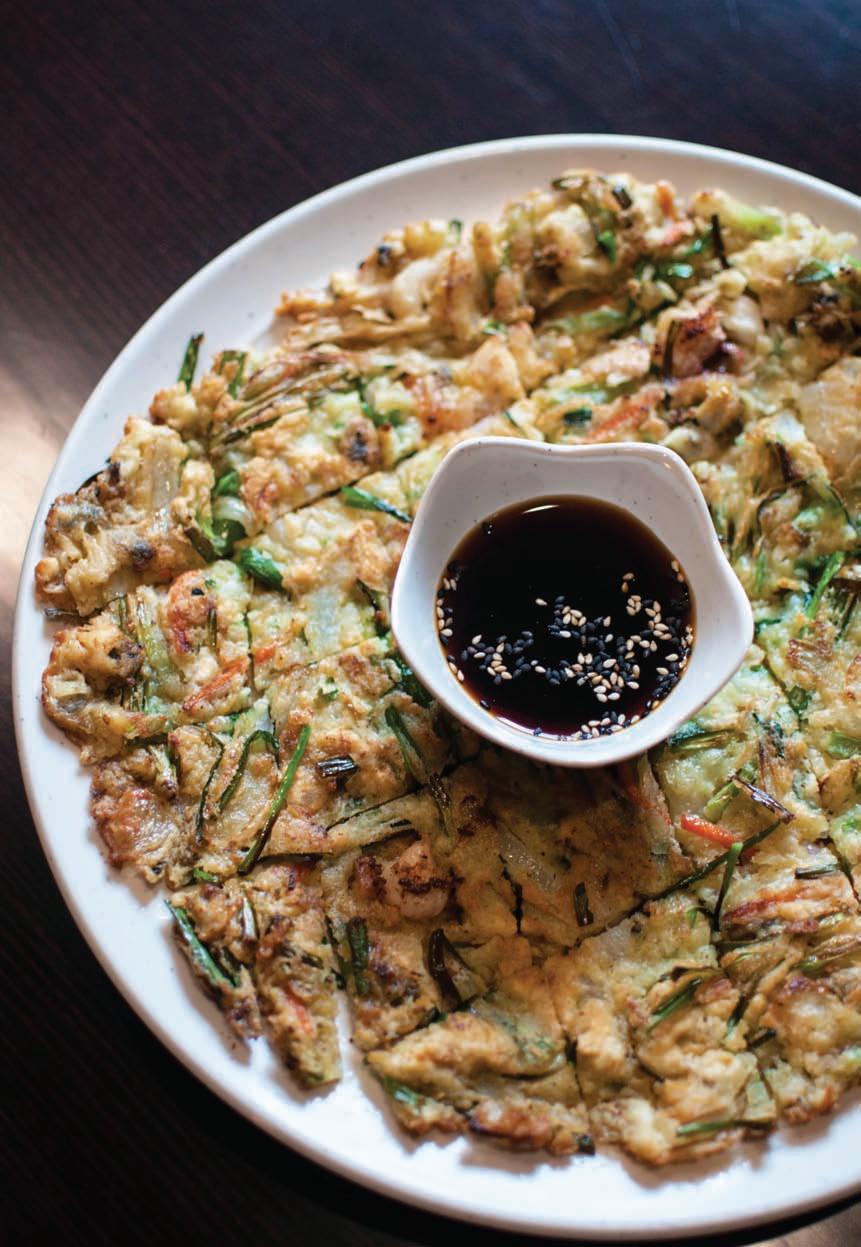
JANUARY/FEBRUARY 2018 EATING WELL FOR LESS
A FAVOURITE WITH KOREAN STUDENTS
24 SEAFOOD PANCAKE The Haemul Pajeon Bibimbap
$1395 + TAX
Haemul Pajeon: a huge savoury seafood pancake with green onions and soy sauce ELIZABETH NYLAND
($10.95)
Santé Café
2630A QUADRA ST. | 250-590-7174 | SANTEGLUTENFREECAFE.COM
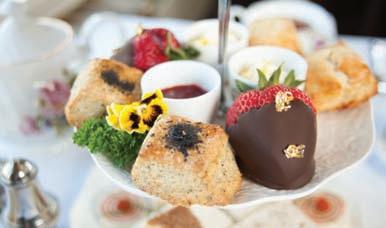
Santé has long been known in Victoria as a destination for glutenfree food, and that has not changed. But something else has: the restaurant was recently bought by Medhat Faraq, the owner of Quadra Butcher. Faraq has brought in both his grass-fed and hormone- and antibiotic-free meats along with chef Sandy Taufik, who hails originally from Morocco. So now the restaurant is a marriage between Mediterranean, North African and gluten-free cuisine.
Moroccan accents are immediately evident in the upgrade of the Breakfast Bowl ($13), a large and healthy bowl of quinoa, scrambled eggs, spinach, cabbage, carrots, red peppers and celery with a drizzle of sauce featuring Moroccan harissa, a spice blend of sun-dried chili peppers and olive oil. A lively Moroccan relish of parsley, cilantro, cumin, coriander, garlic, lemon juice and olive oil called chermoula is swirled on the side of the lunchtime Market Stirfry ($10.95), a healthy dish of mixed roasted vegetables.
Even though it’s enticing to try out the dishes with a clear Moroccan focus, I also recommend the elegantly plated Burger of the Day, a crazy bargain at $10.95 that comes with a mixed red and
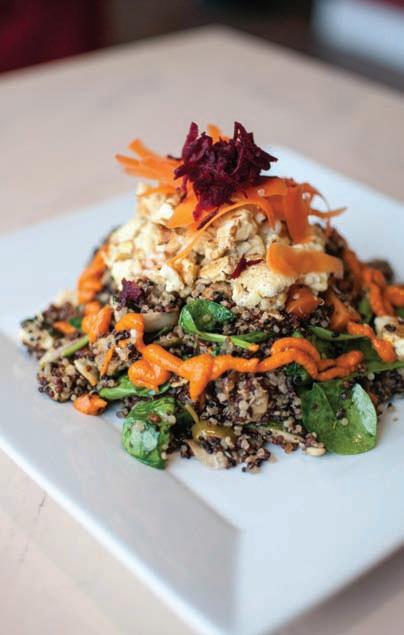
MOROCCAN Breakfast Bowl
$1300 + TAX
Raw Vegan Nanaimo Bar ($4)
green lettuce side salad with beets and carrots. Two thin beef patties with complementary sauces add complexity. One is a basil mayonnaise, the other a Dijon and harissa mix. The deli counter, with its healthy choices like Kale and Squash Salad, Lebanese Carrot Salad, Saffron Rice and much more, is also worth checking out for busy families. For dessert, I highly recommend the Raw Vegan Nanaimo Bar for $4, cleverly concocted with a base of ground nuts, a creamy coconut custard and chocolate ganache.
left: Quinoa, scrambled eggs, spinach, carrots, red peppers, and celery drizzled with a Moroccan Harissa sauce
Winter Tea
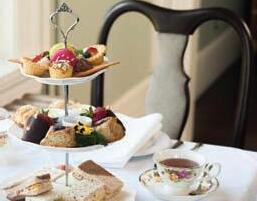


s enocedSkah B

TWG Earl Gr
ea Scone ey T Tea
With House-made Local Fruit Jam, Devon-style Cream
nemtrossA
sehciwdnaaSefTton
Local Island Farm Fr
White Chocolate Lavender esh Egg Salad
Smoked Salmon Pinwheel with Flying Fish Roe
urkey with Roasted T Turkey House-made Cranberry Sauce
eam Cheese
nagiS


Local-made Bon Macar
Bain de Roses Cr
eam Filled Chocolate T Tulip on seirtas Perutna
Pumpkin T
artlet mpkin Tartlet

Chocolate Dipped Gold Dusted Shortbr
Cucumber with Lemon-Dill Cr ead
25 ELIZABETH MONK
ELIZABETH NYLAND
Experience a true Victorian tradition!
INN & TEA HOUSE TEA Tea
BserF r SetniW
s enoce d Skah B yaeDhftpouor S
h
$44
g a wnivreysldourP e a tcneirepxE anniyardnep 30 G SWfTnooitceleesdig a w airotc i e V Vi ure a t k @oobeacm | Foc.esuohaetdna 83-883-05 2lla csonitavrese Rro , Bairtoci , V t t, B30Sllievlle9eerte .e y T Te tlaicepG S ! noitidran t yardneePhTk @ 298 C, B
ulip
We’re part of a pretty incredible community and take pride in sourcing the freshest seasonal ingredients. Bring your friends and family for a local feast made with love.
OPEN 7 DAYS A WEEK
509 Fisgard Street, Victoria, BC (250) 590-8795


WWW.OLORESTAURANT.COM
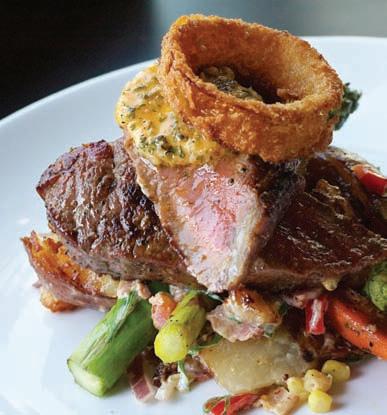
Casa Nova Café and Bakery 492 ESQUIMALT RD. AT RUSSELL, 250-385-8242 | CASANOVA-CAFE.COM
I got there just as the pasteis de natas, traditional Portuguese custard tarts, were coming out of the oven. The pastry seemed too light to hold the silken contents but somehow held on to the warm, creamy contents. I can’t tell you an exact time to capture that moment when the tarts are warm—it varies from day to day— but I can tell you when members of Victoria’s Brazilian and Portuguese communities tend to come to Casa Nova: 9 a.m. for the fluffy Portuguese buns warm from the oven. These aren’t even on the menu, but diners will have the bun with a cheese from the Azores called São Gorje, and that costs under $5. Overall, the menu has simple categories like Breakfast, Burgers, and Hot and Cold Sandwiches. But the category that caught my attention was Taste of Portugal. The menu was developed by John Medeiros, originally from Brazil, and his wife, Ilda, originally from Portugal. They brought their chef over from Portugal three years ago.
In a stunning reversal of my usual fate, my absolute favourite Portuguese dish is also the
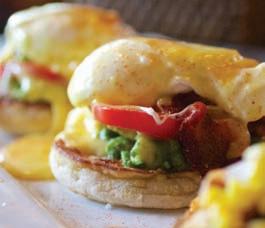
lowest priced, at $9.95. Bifana is a sandwich of thin slices of pork that have been marinated in paprika and pimento sauce. These slices are scooped into a Portuguese bun and topped with a small mountain of sautéed onions, creating a juicy and flavourful sandwich. The house-made chouriço on a bun is only a dollar more. This smoky, complex sausage also makes an appearance in a couple of breakfast menu choices, and in an occasional special of Chouriço and Pea Stew. To get the full Portuguese experience, try the national dish of bacalhau. Hundreds of years ago, when the Portuguese were fishing the waters of Newfoundland, they needed to salt the cod to preserve it. Salted cod remains a common dish, though I should emphasize that it is soaked to remove excess salt. Here at Casa Nova, a large, flaky piece of cod is topped with tomatoes and onions and served with beautiful golden balls of potato, an invention of John the owner. This is a fancier dish for $16.95. Café hours are 8:30 to 2:30, but fear not. Food is available at dinnertime as well, thanks to their very successful catering business.
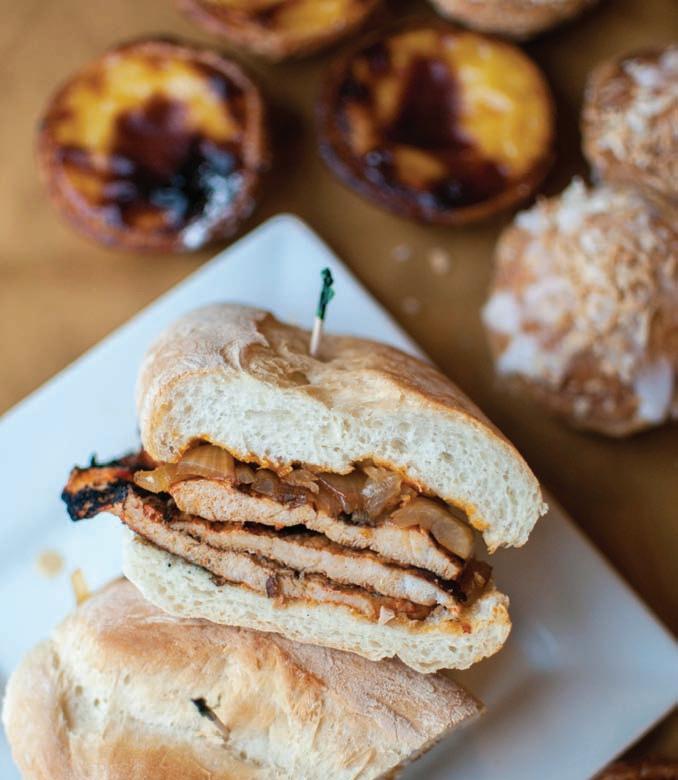
26JANUARY/FEBRUARY 2018
ABOVE:
Bifana Sandwich. In the background - Pasteis de Natas (traditional Portugese custard tarts) ELIZABETH NYLAND














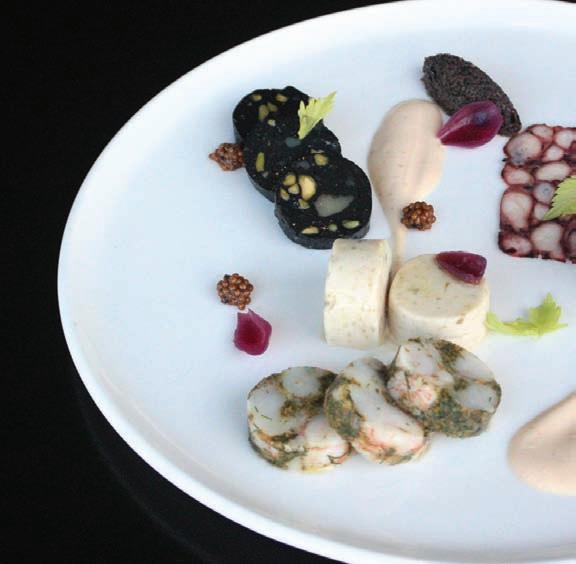
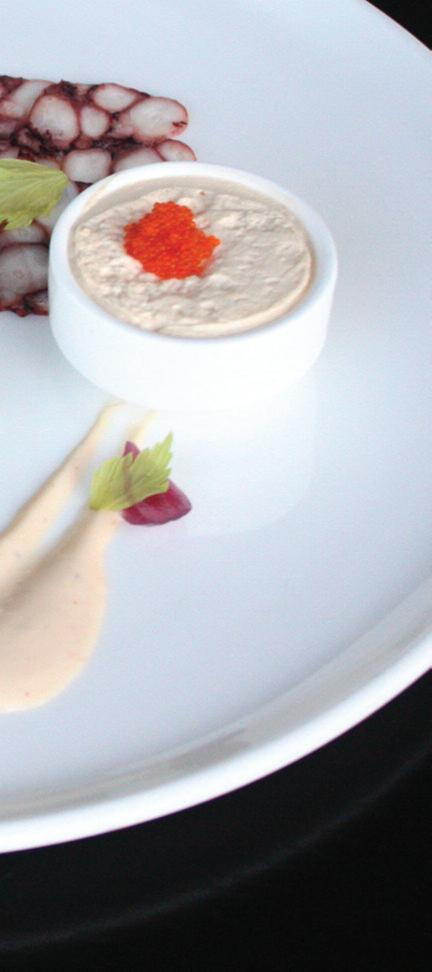


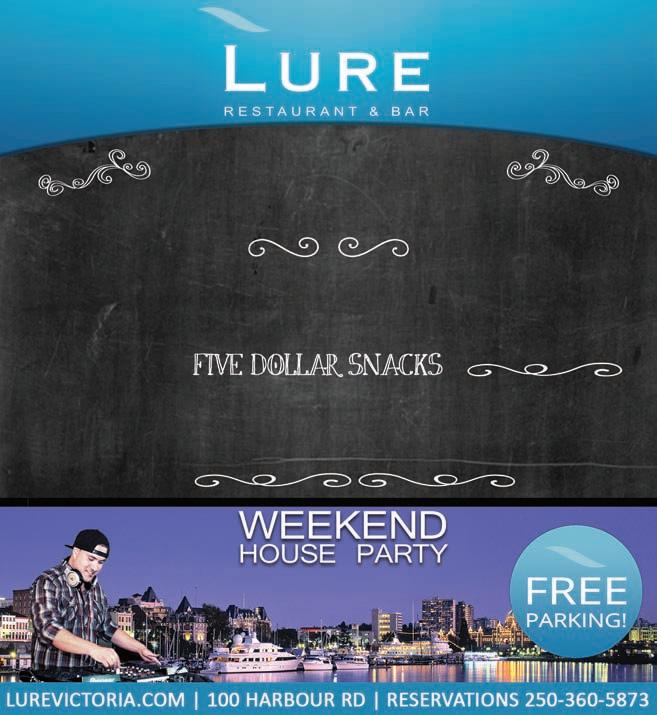











27
Moss Street Winter Market
THE BEST THING I EVER ATE
The third EAT Talks will take place on Monday, February 5, 2018 at Northern Quarter



THE STORIES WE TELL ABOUT OURSELVES AND ABOUT THE FOOD WE LOVE gives meaning to our history and to the things we value most. There is always one memory or one experience that we fall back on when we think about the best thing we ever ate. It might not have been a dish found in a Michelin-starred restaurant or crafted by the hands of the world’s finest chef but perhaps was found in our childhood kitchen, or during a revelatory experience eating abroad, maybe it was just a treasured morsel pulled from our local shores. Food and memory are deeply connected and some of our fondest and most precious memories are preserved in the food that has brought context to our lives.
“The Best Thing I Ever Ate” will take place at Northern Quarter in Victoria and will feature noted speakers from the local food and hospitality industry along with some great food and drink. Included in the ticket price is an appetizer plate and your first drink (supplied by our generous sponsors: Desert Hills Estate Winery, Tod Creek Craft Ciders and Driftwood Brewery). A limited number of tickets are available.

For more details and to purchase tickets go to www.eventbrite.ca and search for EAT Talks - The Best Thing I Ever ate

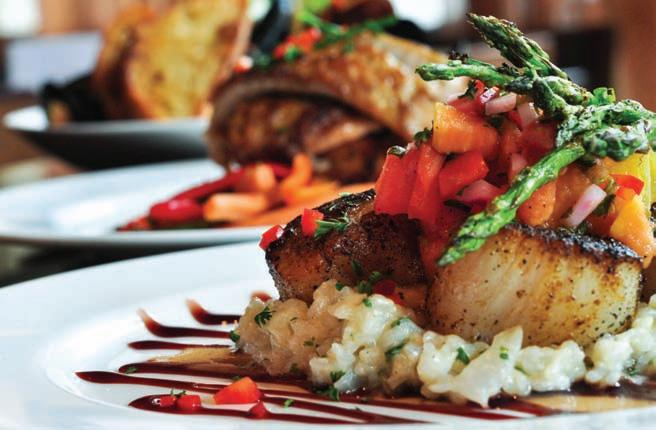
THE SPEAKERS

Jill Van Gyn (Host & MC)

Megan Bermand (Tulip Café)
Jennifer Danter (Food Sylist)


Clif Leir (Agrius/Fol Epi)


Andrew Mavor (Hanks)

Daisy Orser (The Root Cellar)

Arthur Webb (Bao)
Peter Zambri (Zambri's)
28JANUARY/FEBRUARY 2018
Saturdays, 10-noon November through April Local, organic farmers and bakers with an amazing variety preserves, baked goods, produce, eggs, and much more. MossStreetMarket.com Moss St. Market Indoors (and out) all winter long at 1335 Thurlow Road
Clockwise from top left: Megan Bermand (Tulip Café), Jennifer Danter ( Food Stylist), Cliff Leir (Agrius), Andrew Mavor (Hanks), Daisy Orser (The Root Cellar), Jill Van Gyn (MC & Host), Arthur (Bao), Peter Zambri (Zambri's)
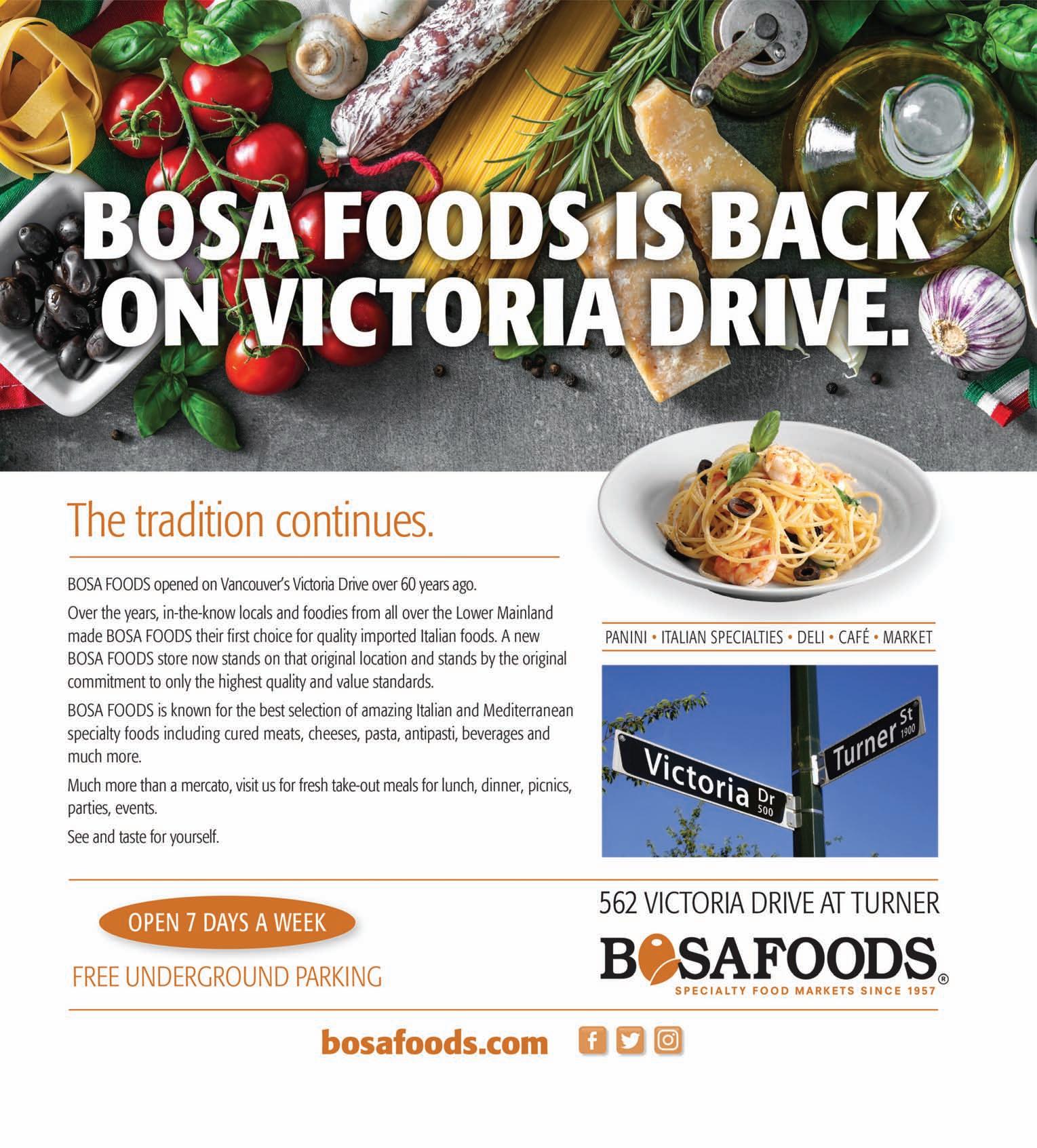
As the calendar flips over to another year, the food world turns its taste buds to predicting new trends, and sending old ones to the proverbial compost bin.

What will be hot in the food scene in 2018? Will we still stand in line for the best breakfast, and is bacon still a thing? Will coffee trump tea, and doughnuts triumph over cupcakes? How will global warming and conflicts affect what we eat and drink?
EXPECT STICKER SHOCK on your Chardonnay this year—extreme weather conditions across Europe and wildfires in California have created a global wine shortage for 2018 and beyond. And brace for milk wars. With trade deals in limbo, an overproduction of U.S. milk and sales of milk alternatives (like almond milk and vegan ice cream) up 45 percent, we may need to circle the wagons around Canadian dairy to keep it.
Beef may be a tougher sell this year, too, as consumers embrace plant proteins, high-tech meat alternatives and even bugs. And with refugees streaming out of the Middle East, expect them to share their food traditions with the world.
Chefs, caterers and grocers all have their predictions about what we’ll be eating this year, whether you look at food as fuel, medicine, agricultural commodity or art. Some trends will stick, others will flash in the pan and burn out. Here’s a taste of what’s new to whet your appetite, along with some spots that are already on trend in Victoria.
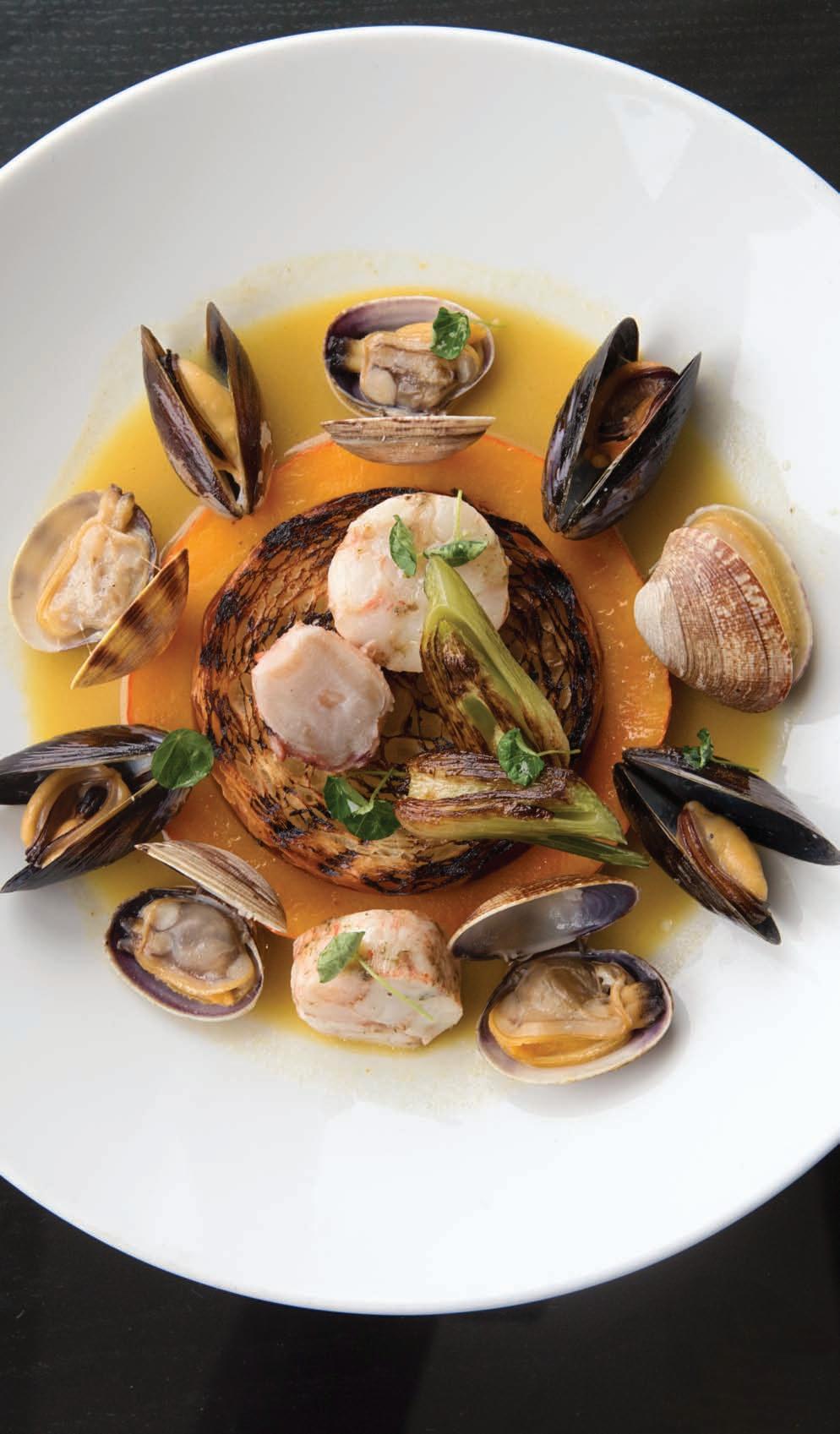
POKE

The Hawaiian classic combination of raw tuna marinated in soy sauce is the new “it” dish circling the globe. Though we don’t have a restaurant devoted exclusively to poke, the seafood snack has naturally stopped on several local menus here, where Ocean Wise albacore is king. Lunch on tuna poke with citrus and crunchy pork rinds at Fol Epi’s Agrius restaurant, sushi rice chirashi with tuna poke and sesame grilled octopus at Q at The

30 JANUARY/FEBRUARY 2018
Wakame butter poached side stripe shrimp roulade, grilled octopus, Saltspring Island mussels, clams, laksa bouillabaisseand grilled bread at Aura
WRITTEN BY Cinda Chavich
PHOTOGRAPHY Rebecca Wellman
Empress, even tuna poke in a jar with nori crisps at Moxie’s.
LOW CARB/LOW SUGAR
With more talk about eating lower on the carbohydrate scale, expect more zucchini noodles and cauliflower rice on the menu, and lower-carb snack food. Whole Foods Market predicts 2018 will be the year we ditch the chips for puffed vegetables and other vegbased snacks—think Leslie Stowe’s Raincoast butternut squash or kale and walnut Veggie Flats, or Hippy Snacks from Left Coast Naturals in Burnaby such as Coconut Clusters with chili and lime. If you’re really into the paleo lifestyle, there are zero-carb Louis Pasture Pork Crisps (rinds) for snacking, Island-made by Primal Sisters in a variety of flavours. Or look for grilled pork rinds and chicharrón made by Sunasia in Surrey, B.C.
PLEASE EAT THE DAISIES
Flower essences are turning up in all kinds of baking, confections, cocktails and even savoury fare. Elderflower may be the hottest among the flowery flavours: elderflower syrup or Bittermilk No. 2 Tom Collins Mix with Elderflowers and Hops (get both at Chiarelli’s) or the First World gin and elderflower cocktail at The Livet. Lavender, hibiscus and rose are also in the running for favourite food florals, whether it’s the hibiscus and lime paleta at Kid Sister; Philips’ Botanical Brew Tonic with hibiscus, rose petals and heather flowers; hibiscus margaritas at Mesa Familiar; or the rosewater-infused syrup drizzled over apple walnut baklava at Suberbaba.
PLANT-BASED PRODUCTS FOR CARNIVORES
Expect more concentration on plant proteins and meat alternatives, like the meaty veg burger and pulled jackfruit sandwiches at the vegan Very Good Butcher shop or the dairyfree cashew cheese at Nourish. Heather and Joe Cunliffe raised the local bar for plantbased food at Be Love and Café Bliss with their rustic, nutrient-rich vegetable and rice bowls, and now you can have a an upscale, multicourse, vegetarian tasting menu at Saveur. Pulses are the new protein and nut “mylk” is the new dairy.
BEAUTIFUL BREAKFAST
As Rebecca Wellman’s new book, First, We Brunch, points out, Victoria is a breakfastcentric city, with so many choices for the morning meal, stretching into lunch and beyond. Whether you’re settling in for the daily organic brunch at Fol Epi’s Agrius, lining up for a buttermilk biscuit breakfast bowl at Jam
Café, booking a beautiful brunch at Saveur (think Red Velvet French Toast with white chocolate mascarpone filling), a sharable brunch thali at FishHook, or sitting down to chicken and waffles at The Ruby, we are always looking for new ways to start the day here in the Brunch Capital of Canada.
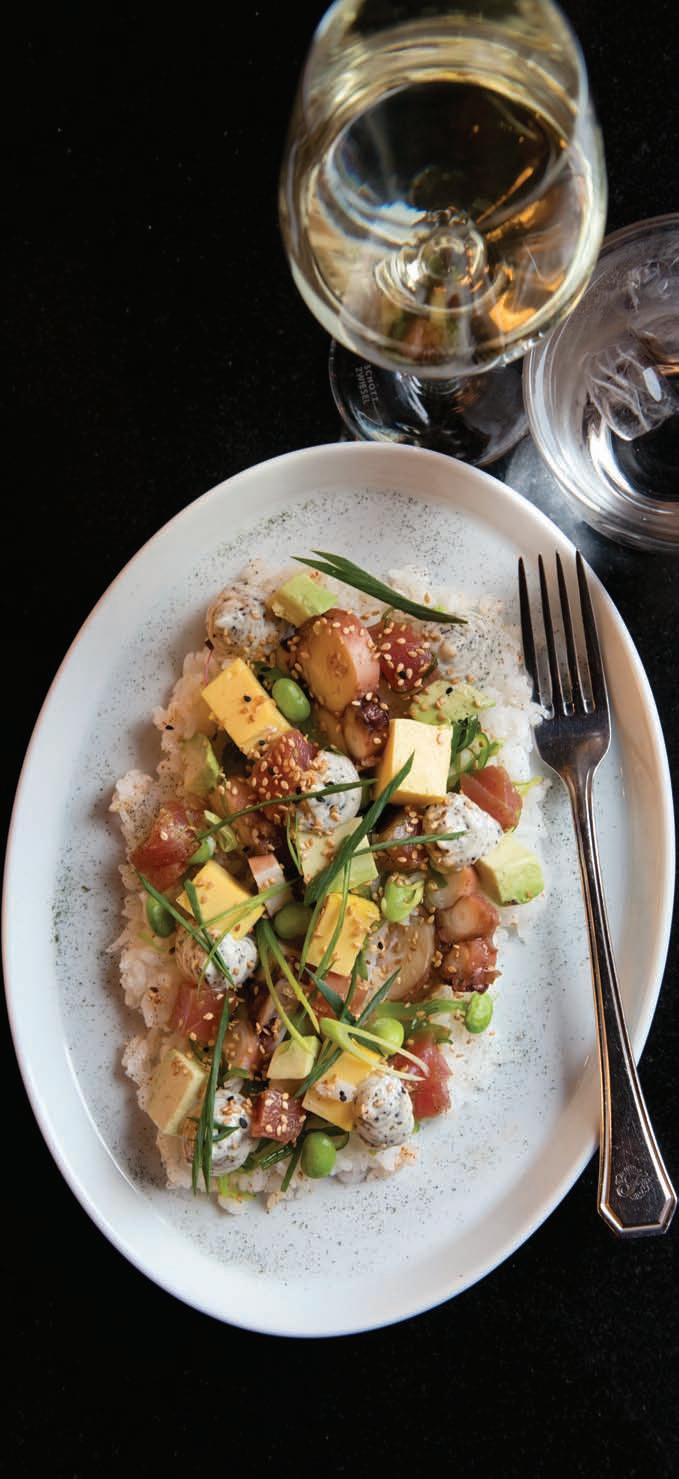
HEALTHY TURMERIC
The golden goodness of turmeric has surpassed cinnamon as a favourite in the spice world. You will find jars of fresh Truly Turmeric paste in local grocers (made by a mother-and-daughter social enterprise based in Vancouver), an anti-inflammatory turmeric juice shot at Café Bliss and turmeric-roasted cauliflower followed by a sunny turmeric cookie at Superbaba.
RAW FOOD
There’s still a segment of the industry focused on raw food for health and clean living dishes loaded with all of the natural enzymes, minerals and phytonutrients that can be destroyed by cooking. Be Love has lots of raw options, including a raw, dehydrated multi-seed cracker that’s served alongside all soups and salads. Or consider the raw pizzas, mylk shakes and energy balls at Power House Living Foods.
FERMENTED FOODS
Kimchi, miso, sauerkraut, kombucha—all are fermented, all promoted for their healthy probiotics and all continuing to find favour with consumers and chefs. Island SodaWorks Bistro in Qualicum Beach is home to all things fermented—from the soda to the pickles—and you can even sign up for one of their Fermentation 101 or Making Miso workshops. Whether you’re getting your friendly bacteria on tap from the Babe’s Honey Farm Jun Elixir, the living sauerkraut from Salt Spring’s Culturalive Fermented Foods or the seasonal fermented vegetables at OLO, it’s all good for the gut.
WASTE NOT
The nose-to-tail, root-to-shoot movement continues to gain popularity among those concerned about the global issue of food waste. I address the issue in my latest book (The Waste Not, Want Not Cookbook published locally by Touchwood Editions), and many businesses are taking the task to heart, whether it’s FishHook using up the trim in its salmon belly bacon and seafood koftas, Sheringham Distillery infusing its Chocolate Vodka with the quality cast-off cacao shell from Sirene chocolate, or Spinnakers making its Backyard Blend cider from fruit gleaned by the Life Cycles project from city gardens.
31
Local sushi rice chirashi with tuna poke and sesame grilled octopus, avocado and edamame at Q at The Empress
POPULAR ETHNIC EATS
Expect chefs to drill down deeper into popular ethnic cuisines this year, whether it’s regional Mexican, Chinese Muslim dishes or Korean fusion. In Victoria, explore the ongoing taco trend at Tacofino and La Taqueria, or try something Latin at Mesa Familiar or Café Mexico, the latter with a contemporary Mexican menu and impressive tequila bar. Look for modern takes on Asian street food at Foo and Bao, and Korean chicken at Dak. At the higher end, Aura restaurant offers locovore dishes inspired by Japanese and Southeast Asian flavours. Trend spotters say traditional Indian food is making way for Indian street food and modern Indo mash-ups. Victoria’s FishHook is ahead of the curve with a chargrilled menu and thali plates to share at the new Mermaid Wharf location, and plans for an Indian-Mexican fusion menu at soon-to-open Dobosala Cantina come complete with a ride-through window for cyclists!
PEROGIES
To counter the low-carb trend, there’s the carb-oncarb goodness of perogies. A recent Technomic snack survey found “ethnic snacks” trending on restaurant menus and along with dosas and bao, the survey also includes the popular perogy. Victoria has Sult Pierogi Bar, a restaurant devoted to updating the dumpling with new innovative fillings; the Cook N’ Pan Polish Deli with traditional perogies on the menu or in the freezer to take home; and that breakfast of Eastern European champions, perogy hash with poached eggs, lardon, brisket and hollandaise at Agrius.
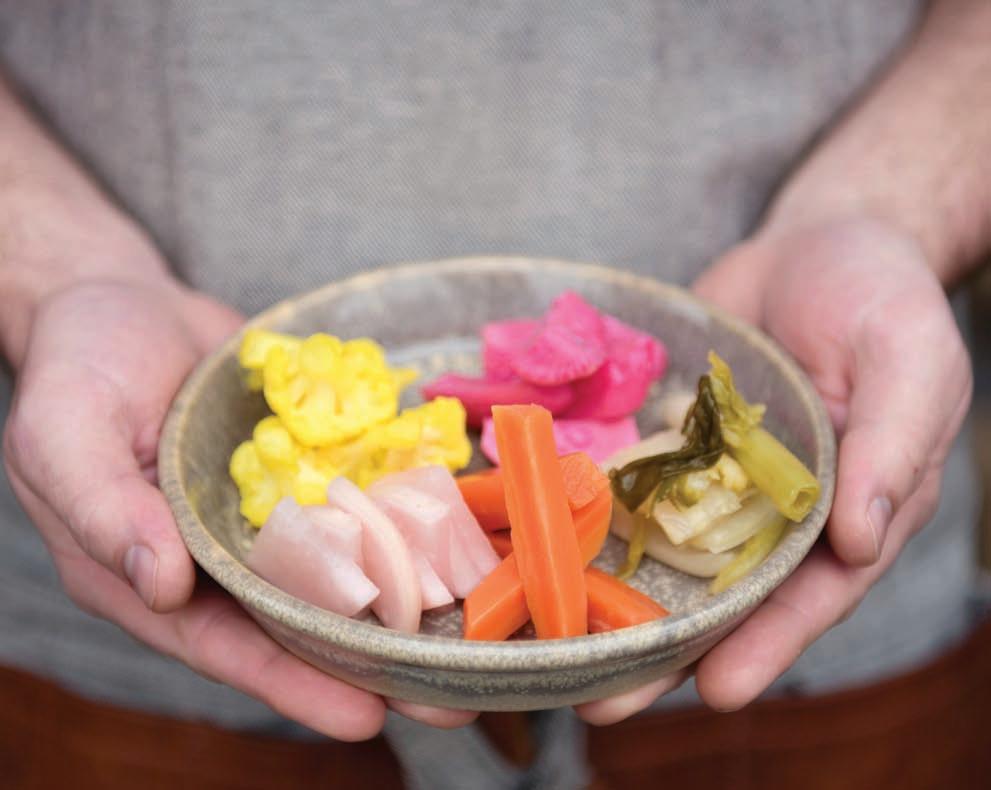
SEAWEED
Seaweed is at the top of the superfood list, and we are surrounded by kelp beds and low-tide, seaweed foraging opportunities on Vancouver Island. A variety of local seaweed is hand-harvested and dried by Amanda Swinimer of Dakini Tidal Wilds in Shirley. You’ll find it for sale at local grocers, even in the bulk bins at Lifestyle Markets. Silk Road makes a Mermaid’s Potion tea with local seaweed and mint, and Sheringham Distillery infuses seaweed and other botanicals into its gin. Otherwise, eat your seaweed in sushi rolls, in miso soup or innovative dishes developed by our top chefs. I’m partial to the seaweed salad with crunchy puffed wild rice at Wolf in the Fog in Tofino.
GLUTEN-FREE GRAINS
Today millions of North Americans without celiac disease avoid gluten, the number tripled between 2009 and 2014, and experts now belief at least half of those who have abandoned gluten have a legitimate sensitivity and are not simply following a fad. The exploration of gluten-free grains has extended beyond B.C.-based food products like Holy Crap or Skinny B cereals, and the great baking found at local spots like Origin Bakery, into local dining.
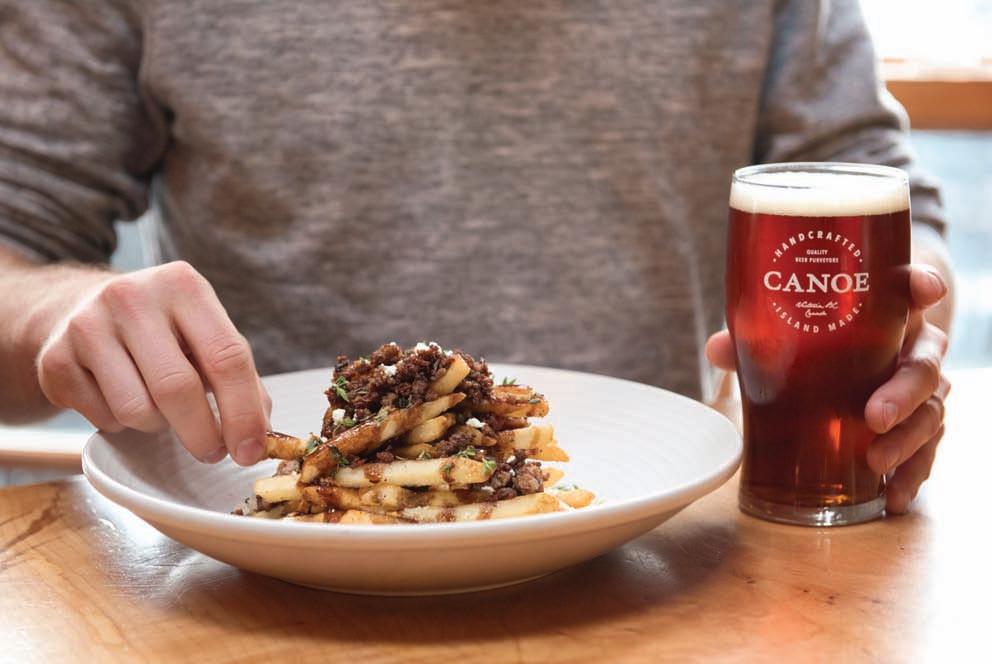
32JANUARY/FEBRUARY 2018
Montreal Poutine paired with an IPA, at Canoe.
A bowl of fermented vegetables at Olo (clockwise starting with the cauliflower). Tumeric Cauliflower, Kasu Radish, Kimchi, Fermented Carrots, Shiso Daikon
Think Italian sausage and artichoke breakfast wraps in brown rice tortillas at Santé Café, toasted millet with charred brassicas at Part and Parcel, warm quinoa salad with baby beets and kale at Be Love, or even a gluten-free rice bowl at Pagliacci’s.
MIDDLE EASTERN FOOD
Middle Eastern fast food such as hummus, falafel and shawarma is approachable, healthy and making a mark in Victoria. From Lebanese-owned Fig Deli and the Syrian foods being sold by a local refugee family at Red Barn Markets, to the new casual counter service at spots like Yalla and Superbaba, there are lots of exotic flavours of the eastern Mediterranean to explore.
TRANSPARENCY
Consumers are looking for provenance when it comes to the foods they buy, and that means everything from certification programs to purchasing direct from local producers. They’re savvy shoppers, plugged into updated information and looking for healthy ingredients and practices, whether it’s Ocean Wise seafood or humane treatment of animals. Campbell’s recently removed 13 ingredients from their popular soup recipe due to consumer demand. Expect more politics on the plate.

TASTING TECHNOLOGY
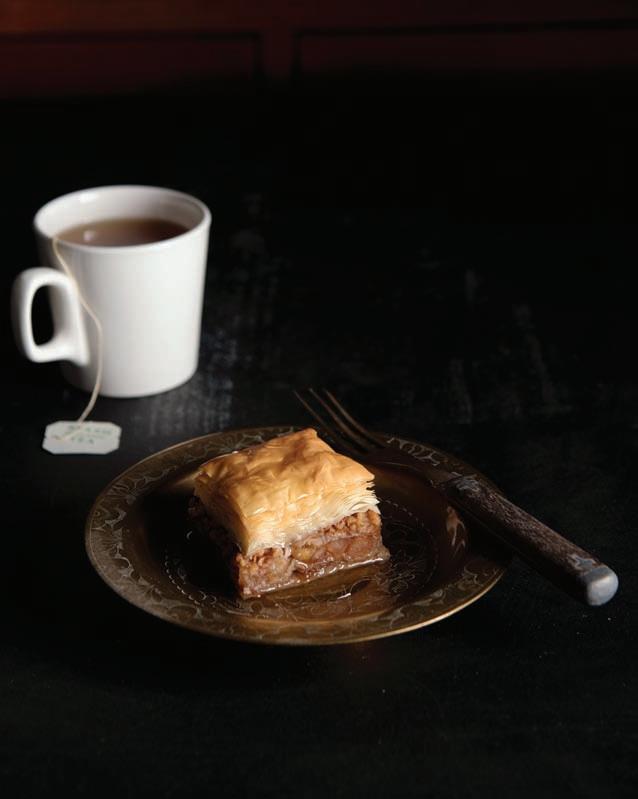
With scientists concocting new vegetarian burgers that “bleed” like beef, machines to flash-freeze vegetables in the field, and robots that can chop veggies and flip steaks, technology is biting into the food business. Technology is also making it easier for food shoppers to connect with farmers. Cowichan Valley farmers have created CowOp.ca, an online shopping and delivery system for local produce, while the Farmigo software for CSAs (Community Supported Agriculture) is another example. Look for more food delivery from both restaurants and grocers.
FRIES WITH THAT
Have fries ever gone out of style? Probably not, but there is a resurgence in quality French fries beyond the ubiquitous poutine, and Victoria has some notable makers. Try the Moroccan fries at Part and Parcel with ras el hanout and spicy harissa mayo, the Kennebec fries dusted with Hawaij spice at Yalla (and the minty yogurt dipping sauce served alongside), as well as, of course, the famous frites with Parmesan, garlic and truffle oil at Brasserie L’Ecole. Or have the classic Montreal Poutine with gooey curds and fried pork, all washed down with an IPA, at Canoe.
33
Rosewater-infused syrup drizzled over apple walnut baklava at Superbaba
Isabelle Bulota’s
Enrich the Sandwich
THE ISRAELI SABICH IS A HEALTHY, SPICY, MEATLESS MEAL IN A HOMEMADE FLATBREAD WRAP.
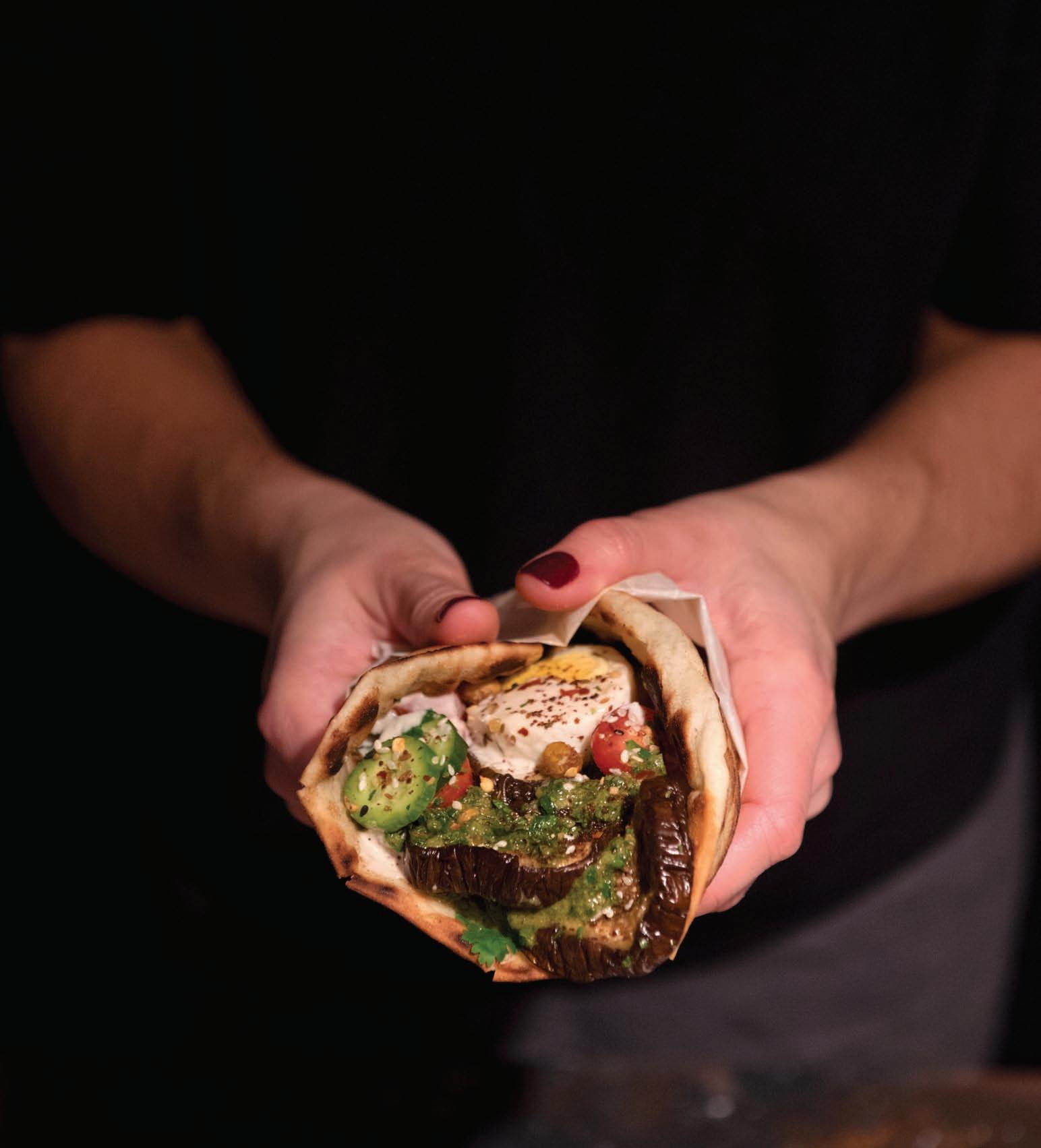
Falafel and shawarma are seemingly ubiquitous. Living in the shadows, however, is a lesser-known sandwich delight from Israel called sabich, a flatbread chockful of roasted eggplant, hard-boiled egg, Israeli salad, tahini sauce and a tangy hot mango condiment.
I bet you’d never guess eggplant and hard-boiled eggs go well together. But I’m here to tell you they absolutely do. Sabich is a captivating and delicious blend of textures and flavours with bites alternating between the smooth, silken roasted aubergine and the crunch of fresh salads.
34JANUARY/FEBRUARY 2018
RECIPE + STYLING Isabelle Bulota
PHOTOGRAPHY Rebecca Wellman
Sabich
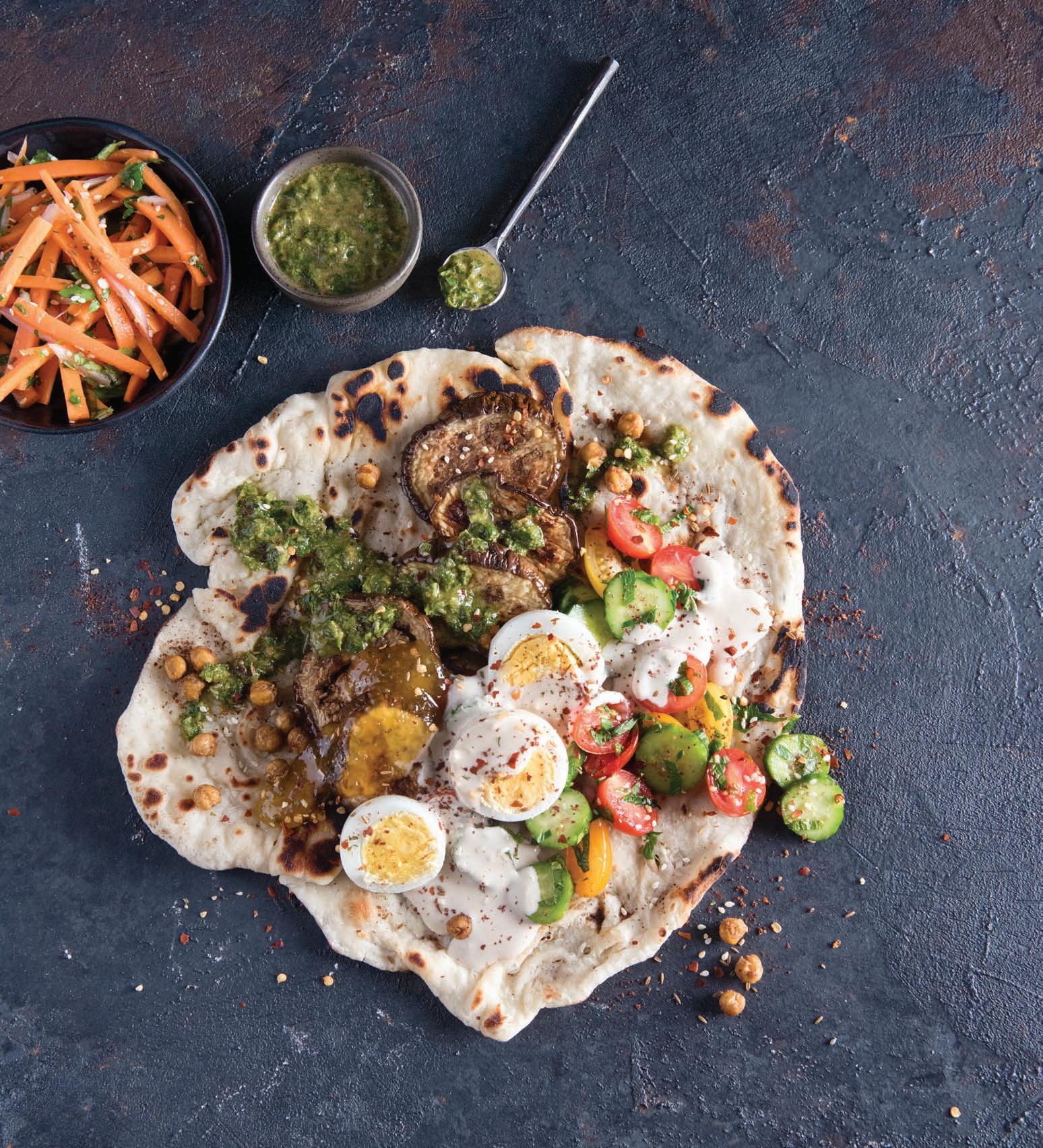
WHAT YOU NEED
4 hard-boiled eggs, peeled and sliced Roasted Eggplant
1 Italian eggplant, sliced into ½ inch slices
Kosher salt
2 Tbsp olive oil
Preheat the oven to 220°C (425°F). Place the eggplant slices on a clean cloth or paper towel and sprinkle both sides with salt. This is called disgorging the vegetable and will help removesome of the water and prevent them from going soggy.
Meanwhile, place the rack in the lowest position of the oven and line a baking sheet with parchment paper.
Pat dry each slice before brushing both sides with oil. Place on baking sheet. Bake for about 15-20 minutes or until tender. Add 3 minutes each side, under broil, if you like them a little grilled. Remove from oven and let rest.
CONT’D ON THE NEXT PAGE

35
ISRAELI SALAD
3 small cucumbers, sliced
2 cup cherry tomatoes, cut in half
2 Tbsp fresh parsley, minced
2 Tbsp fresh mint, minced
1 Tbsp olive oil
Juice from 1 lemon
Salt, to taste
In a bowl, combine all ingredients together. Even better when prepared in advance.
SAUCE AND TOPPINGS
Tahini sauce
Whisk together until smooth ½ cup tahini, 2 small crushed garlic cloves, juice from 1 lemon, 2 Tbsp water and ½ tsp salt. Add an additional teaspoon or two of water if you want it thinner. Adjust seasoning if required.
Zhoug (spicy herb condiment)
Place 1 cup fresh coriander, 1 cup fresh parsley and 1 deseeded hot green chili pepper in a food processor, along with a clove of peeled garlic and ½ tsp ground cumin, ½ tsp ground cardamom and ¼ tsp ground cloves.
Process, drizzling in 4 Tbsp extra virgin olive oil, 2 Tbsp water and 2 Tbsp lemon juice. Don’t over-process as this sauce is meant to be a bit on the chunky side. Season with salt, pepper to taste and a pinch of sugar.
GARLIC FLATBREAD
(Makes 4 breads)
¾ cup warm water
1 tsp quick-rise instant active yeast
1 tsp sugar
2 cup flour
1 tsp salt
1 Tbsp fresh garlic, crushed
2 Tbsp oil
2 Tbsp plain yogurt
1-2 Tbsp melted butter
In a bowl, combine warm water, yeast and sugar. Stir gently to dissolve sugar. Set aside for 10 minutes.
Meanwhile, in a large bowl, combine flour, salt, and garlic. Add oil, yogurt and yeast mixture. Work with your hands to make dough smooth and knead until the dough pulls away from the bowl.
Turn the dough out onto a floured
surface and begin kneading it for 5 more minutes or until smooth and elastic. Place the dough in a lightly oiled bowl, cover and set aside in a warm place. Let it rise for about 2 hours, or until it has doubled in size.
Punch the dough down and cut into 4 pieces. Roll each until they are about ¼ inch thick. Set aside.
Heat a lightly oiled frying pan over medium heat. Place the rolled out dough onto the hot fry pan and cook 2–3 minutes until the underside is golden brown and large bubbles have formed on the top surface (bubbles will occur only if the pan is kept hot).
Flip the dough and cook the other side until golden brown as well. Brush with butter.
THE PERFECT SIDE DISH
Pickled carrot salad
4 carrots
3 shallots, minced
1 tsp cumin seeds
5 Tbsp olive oil
Zest and juice from 1 lemon
Salt and pepper, to taste
1 tsp fresh ginger, grated
1 cup fresh mint, minced
1 cup fresh coriander, minced
1 tsp sesame seeds
Peel carrots and cut into fine julienne. Place in a medium bowl with shallots. Heat cumin seeds in a pan for 1 minute. Whisk together oil, lemon zest and juice, ginger and roasted cumin seeds. Pour on carrots, combine with mint, coriander and sesame seeds and let it marinate for 5 to 10 minutes and up to 24 hours.
TO ASSEMBLE THE SABICH
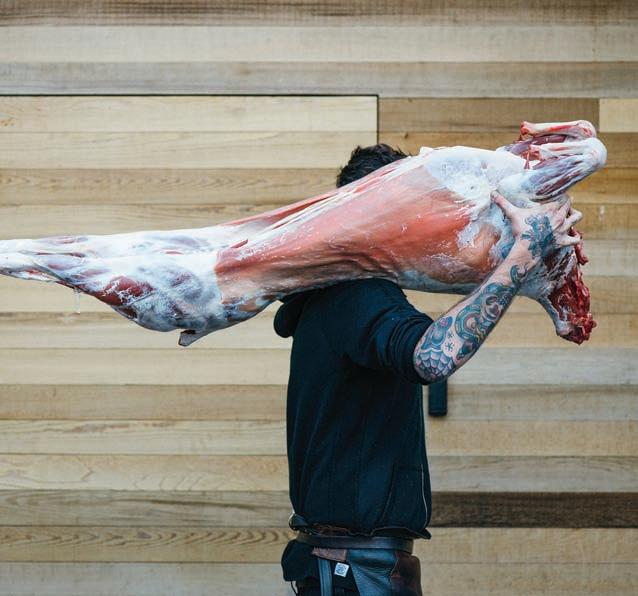
Take a prepared flatbread, place eggplant slices, Israeli salad and egg slices. Top with tahini sauce and Zhoug condiment. Roll up and enjoy!

Other Great Toppings To Elevate The Taste
Sumac powder, blend of chili flakes and mix herbs, SaltSpring Kitchen Co.’s Hot Mango Jam, roasted chickpeas.
36JANUARY/FEBRUARY 2018
UDON
Delicious in broths, Italian-Japanese mash-ups, savoury hotpots and colourful wok-fried wonders, udon noodles are essential Japanese winter comfort food.
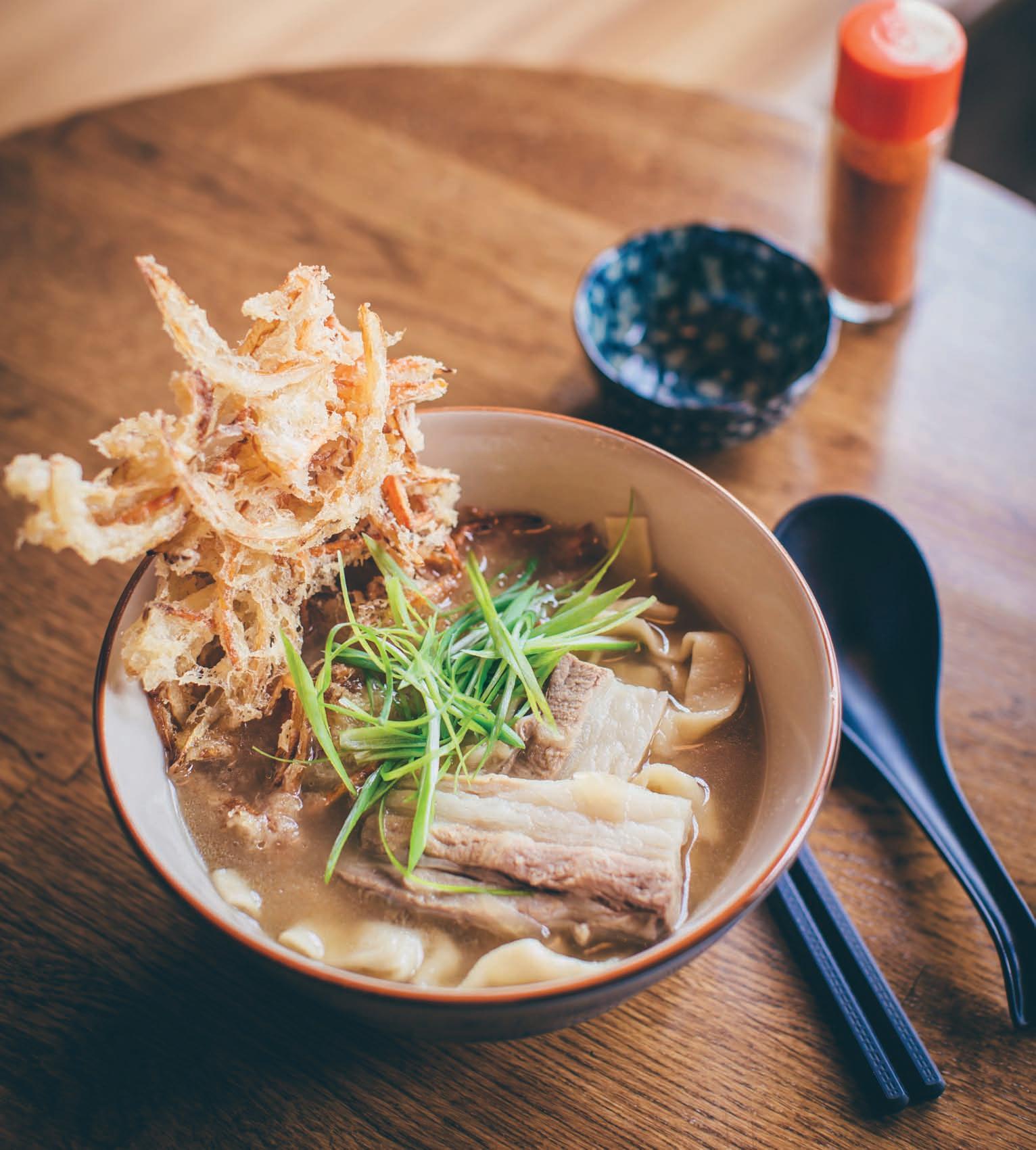 By Shelora Sheldan,
By Shelora Sheldan,
Photography by Tracey
Kusiewicz
37
Tempura Udon: veggie tempura, local pork belly in pork bone miso soup at Vancouver’s Dosanko
WHAT’S NOT TO LOVE ABOUT NOODLES?
Made from unleavened dough and kneaded, pulled, rolled, cut, extruded, folded, even flicked, their endless shapes and sizes have sustained humankind the world over. When we enjoy them in a nutritious broth, a robust sauce or stir-fried, we have China to thank for this incredible gift. (The earliest written record is from the Han dynasty, 206 BC to 200 AD.) Through trade, and their incredible affordability and adaptability, noodles have become a mainstay in so many cuisines. They are the cornerstone of the Italian table, a country that translated pasta’s humble ingredients into high art. The noodle features in the pancit dishes of the Philippines, the meins of China and the spaetzles of Austria and Germany. They bring pad Thai and Korean japchae to life, and instant noodles and mac ’n’ cheese are iconic cheap eat fixtures. Made primarily from wheat flour, water and salt, with or without eggs, noodles are also made from rice or buckwheat flours, mung bean or sweet potato starches.
Japan also reveres the noodle. Delicate buckwheat soba and ramen, thin and curly, are the current reigning champs, gaining global popularity with singularly focused restaurants and food trucks celebrating their easy, slurpable style. But Japan’s udon, thick, nourishing, texturedriven and distinguished by its snowy white appearance, is picking up speed. The country’s annual udon tenkaichi tournament pits noodle makers against each other for a top prize, and here at home, Japanese menus are finally giving the noodle its due. From nuanced broths and Italian-Japanese mash-ups to savoury hotpots and colourful wok-fried wonders, udon is the comfort food you should be eating this winter.
Get to Know Your Noodle
When the long thick white flour udon first appeared in Japan is up for debate. Sanuki province, on the island of Shikoku in Kagawa prefecture, claims to be the first. Visitors can partake in noodle tourism by attending udon school day classes or weeklong intensives that
teaches participants how to open their own udon business. (Sekai Udon Bar in Burnaby makes noodles from an open kitchen based on one school’s teachings.)
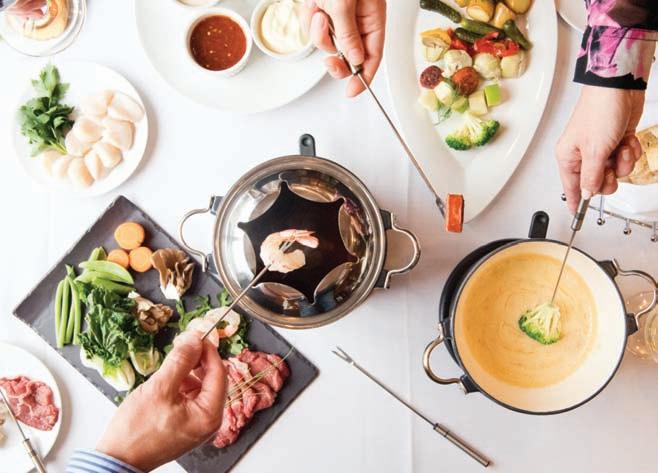
In Victoria restaurants, the Sanuki-style udon is preferred. Called koshi, it has a firm bite and springy texture, holding up beautifully in broths and curries.
Find them at many grocery stores—I found mine at the Superstore. They’re super-affordable and conveniently formed into five serving portions.
Cooked frozen in boiling water, they’re ready in three minutes. A single packed version, called nama udon, not as thick as the Sanuki-style, are a tad flabby in my opinion but readily available (I’ve found them at Oxford Foods in Cook St. Village). Fujiya market is your best bet for udon varieties, from dried to frozen, including Inaniwa-style, a thinner and aged udon noodle from northern Japan. But hands down, the Sanuki noodles are the most popular.
An alternate take is a flat, wide version hailing from Hoto in the Yamanashi prefecture. You can find a rustic handmade Hoto-style rendition at Vancouver’s Dosanko. Chef Nathan Lowey prefers using Canadian hard red spring wheat for its high gluten content, lending the resulting noodle a great chew and more natural wheat colour. He makes a batch every few days and serves them in a hearty pork bone broth with a hit of homemade yellow miso, in keeping with the restaurant’s concept of “keeping things as local and as unrefined as possible.”

Faced with several varieties of the noodle at home, I’ve enjoyed them in soups from roasted squash to miso with ginger to a roasted duck broth. And cold, they are exquisite tossed in spicy peanut sauce. Research and development never stops!
Take Stock
A flavourful broth, or dashi, is at the soul of any good udon soup. A quotidian Japanese staple, dashi is also used for seasoning ingredients in steamed chawanmushi (egg custard) and tempura batter. It’s made by simmering water containing a piece of kombu or kelp and shavings of dried bonito (katsuobushi), then straining the nutritious umami-rich

38JANUARY/FEBRUARY 2018
elixir. It takes around 10 minutes to make. Other versions use dried shitake mushrooms or iriko (dried sardines). While instant versions (dashi-nomoto or hon-dashi) are readily available and popular, nothing beats homemade.




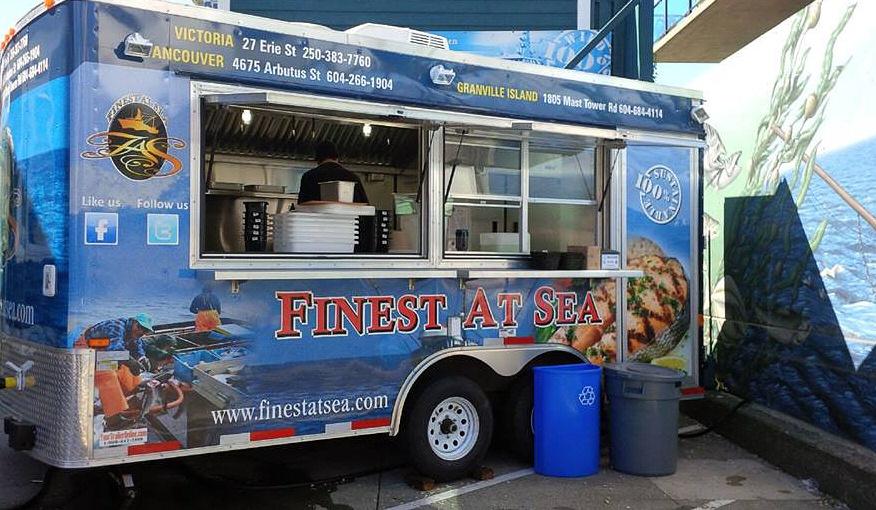





A wonderful housemade version drives the authentic tsukune udon at Uchida in Nootka Court. Chef Yasu Uchida uses kombu, bonito and iriko as the base to support toothsome Sanuki-style noodles, adding housemade chicken meatballs (tsukune) and seasonal organic vegetables from Metchosin’s Umi Nami farm. Diners can add the optional onsen farm egg, simmered in soy sauce.

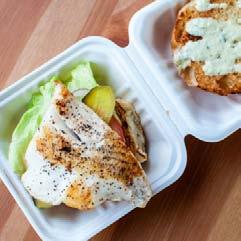
For richness and a twist on the authentic, chef Shawn Lee at Nubo serves an udon carbonara, a Japanese-Italian mash-up with a house dashi cream sauce chockful of scallops and prawns. For added umami, diners can add mentaiko, an authentic paste of pollock roe. Their dashi also forms the base for deep sharing bowls of nabeyaki and sukiyaki hotpots.

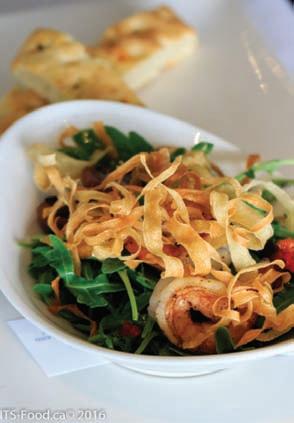

39
CONTINUED ON FOLLOWING PAGE
Chef Nathan Lowey of Dosanko making his own udon
1715GovernmentStreet

250.475.6260
www.lecole.ca


eat@lecole.ca
Dinner5:30-11pm

TuesdaytoSaturday
What to Order
If you lived in Japan, styles would correspond with distinct regions and prefectures, but locally, these are the greatest hits to get you started.
Kake udon (atsu-atsu), a simple preparation served in a mild dashi broth topped with thinly chopped scallions, a bit of green vegetable and/or a thin slice of kamaboko, a halfmoon-shaped fish cake.
Kitsune Udon is Japanese soul food prepared in dashi topped with inari, the slightly sweetened tofu pockets, fish cake and scallions. At Sen Zushi, their version is topped with tempura.
Zaru Udon, served cold, mostly in summer, is accompanied by a refreshing dashi-soy dipping sauce.
Goma-miso udon is a departure from the usual gomae, that lovely spinach and sesame salad. Sen Zushi offers up a dish with chicken and grated daikon tossed in a creamy sesame sauce. The same dish is also offered cold and known as hiya-hiya. Yaki-udon, the classic stir-fry, includes onions, cabbage, mushrooms, carrots and a protein, be it tofu or meat.
Sukiyaki, a hearty beef hotpot, or nabemono, is chockful of vegetables and tofu. The noodles are often added at the last to soak up the remaining broth. The communal dish has an underlying sweetness—not unlike the 1960s pop song of the same name— provided by mirin, soy sauce and dashi.
License to Slurp
Take up those chopsticks like a pro, dig in and slurp. A cultural practice based on practicality, slurping not only cools the broth-laden noodles but is said to enhance their flavour. To perfect the technique, I suggest practicing at home to keep any choking/coughing fits private! Or watch the Japanese films Tampopo and Udon for ace tips. And to keep it authentic, go ahead and drink the broth directly from the bowl. To amp up flavours, shake some togarashi from that tiny bottle that comes alongside a bowl of udon. It’s an intriguing condiment, a spicy, tangy, nutty combination of red chilies, orange peel, sesame and/or poppy and hemp seeds, nori seaweed and sancho, a berry from the prickly ash tree.
Using Your Noodle/Making Your Own
Japanese udon schools demonstrate the kneading process by having participants pummel the plastic-covered dough with their feet. You may want to turn to an electric mixer. Once at the right soft and pliable texture, the flour, water and salt dough is rolled out with a metre-long rolling pin called a nobebo. It is then three-folded and sliced into noodles. Some prefer to use a lower protein flour such as cake or pastry flour, while others, such as chef Lowey from Dosanko, prefer a medium protein flour with high gluten, resulting in a great chew. A lot of online recipes call for all-purpose flour, and that might be a good way to start. Food authority Andrea Nguyen and master Japanese chef Masaharu Morimoto both post online recipes with concise instructions for making udon.
Where to Get Your Slurp On


VICTORIA
Uchida, 633 Courtney St., 250-388-7383

Sen Zushi, 940 Fort St., 250-385-4320, senzushi.com
Nubo, 739 Pandora Ave., 778-265-9909, nubotapas.com
Fujiya, for noodles and Japanese food stuffs, 3624 Shelbourne St., 250-598-3711, fujiya.ca
VANCOUVER
Dosanko, 566 Powell St., 604-251-2020, dosankorestaurant.ca
Sekai Udon Bar, Metrotown, 604-433-7881, sekaiudonbar.com
40JANUARY/FEBRUARY 2018
Rebecca Wellman’s
BREAKFAST STRATA
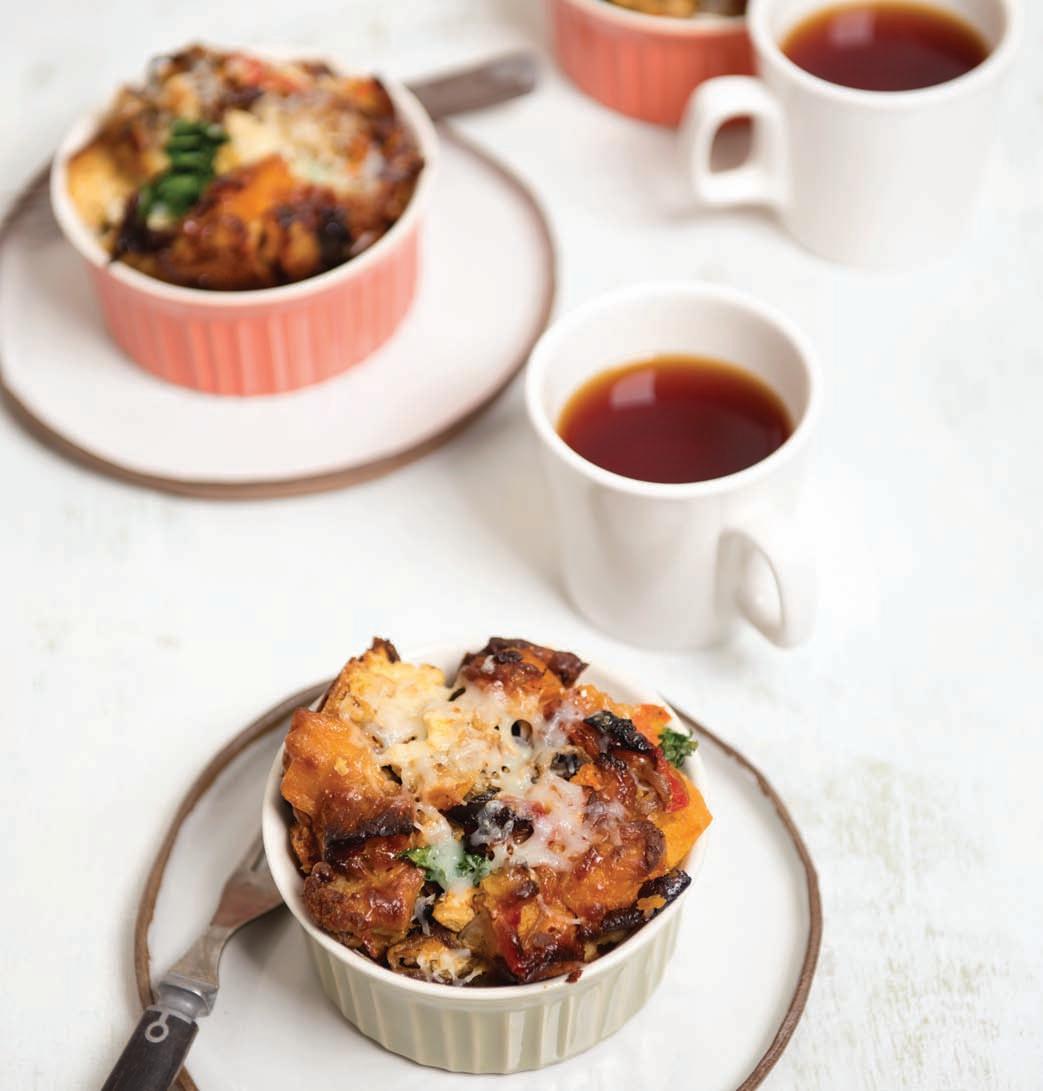
This simple, savoury recipe is a little like a soufflé without the anxiety, perfect easy-going brunch fare.
BRUNCH IS A BIG DEAL HERE. With more than 100 places in the greater Victoria area to enjoy a leisurely Sunday brunch or a quick grab-and-go, we are never short of that perfect venue for our eggs benny and French toast. That doesn’t stop us, however, from lighting the fire on a cold winter’s morning and tucking into a homemade breakfast with friends and family. With an abundance of delicious sausages at our favourite butcher, a multitude of bread makers and cheese suppliers and fresh eggs and vegetables at every shop or roadside stand, it’s no wonder we’d rather stay home sometimes. Strata, otherwise known as savoury bread pudding, is a great vessel for leftover anything. The basics— day-old bread, light cream, eggs and cheese—are decadent for sure, but add some roasted squash, sautéd kale and fresh herbs and you can feel good about getting some veg in! This dish benefits greatly from an overnight in the fridge, so plan accordingly.
SAUSAGE, BUTTERNUT, RED PEPPER AND WILD MUSHROOM STRATA
1 small butternut squash, peeled, seeded and cut into ½-inch cubes
1 medium red onion, halved and thinly sliced
1 medium red pepper, halved and thinly sliced
Extra virgin olive oil
Salt and ground black pepper
2 lb of your favourite large link sausages (optional)
4 oz wild or crimini mushrooms, chopped (I used chanterelles)
1 bunch of kale, stiff stems discarded and chopped into bitesized pieces
3 Tbsp minced fresh herbs such as thyme or oregano
12 large eggs
2½ cups half and half cream (or whole milk)
½ tsp grated nutmeg
1 loaf of sourdough (about 1 lb), cut into ½-inch cubes
2½ cups grated regular or smoked Cheddar
Preheat oven to 400°F. Butter eight 8-ounce ramekins. Toss butternut, onions, red peppers, 2 Tbsp olive oil and salt and pepper in a large bowl until vegetables are well coated. Spread evenly and without overlapping on two rimmed baking sheets. Roast in oven for about 20 minutes, tossing once or twice, until squash is softened and onions are browned. Transfer everything to a large bowl and add the cubed bread. Mix together.
If you are using sausages, remove casings and place meat in a large fry pan over medium-high heat. Sauté, breaking up into small pieces, until meat is browned through. Add mushrooms and kale and cook for 7-10 minutes until mushrooms have softened and kale has wilted. Add fresh herbs and cook for about 1 minute. Remove from heat and add to the bowl of veggie-bread mixture. Stir to combine.
In a large bowl, whisk together eggs, cream (or milk), nutmeg
and salt and pepper. Pour over the veggie-bread mixture in the bowl and combine well so all the bread becomes saturated.
Fill each buttered ramekin a third of the way full with bread mixture and top with a bit of cheese. Continue filling each ramekin all the way to the top with bread mixture, followed by the remaining cheese. Press down on the top to ensure it is fairly tightly packed. This will rise like a soufflé but sink again once removed from the oven.
Place all ramekins on a rimmed baking sheet and cover with plastic wrap. Store in the refrigerator overnight.
Preheat oven to 360°F. Remove the baking sheet from the fridge at least 30 minutes prior to baking. Remove the plastic wrap and cover all of the ramekins lightly with foil. Bake for about 35 minutes, until egg is set and risen. Remove foil and bake another 5-10 minutes until cheese is lightly browned on top. Let sit for 10 minutes before serving.
Serves 8.
REEBECCA WELLMAN 41
Marie-Eve Charron’s
PORK & UDON NOODLE SOUP
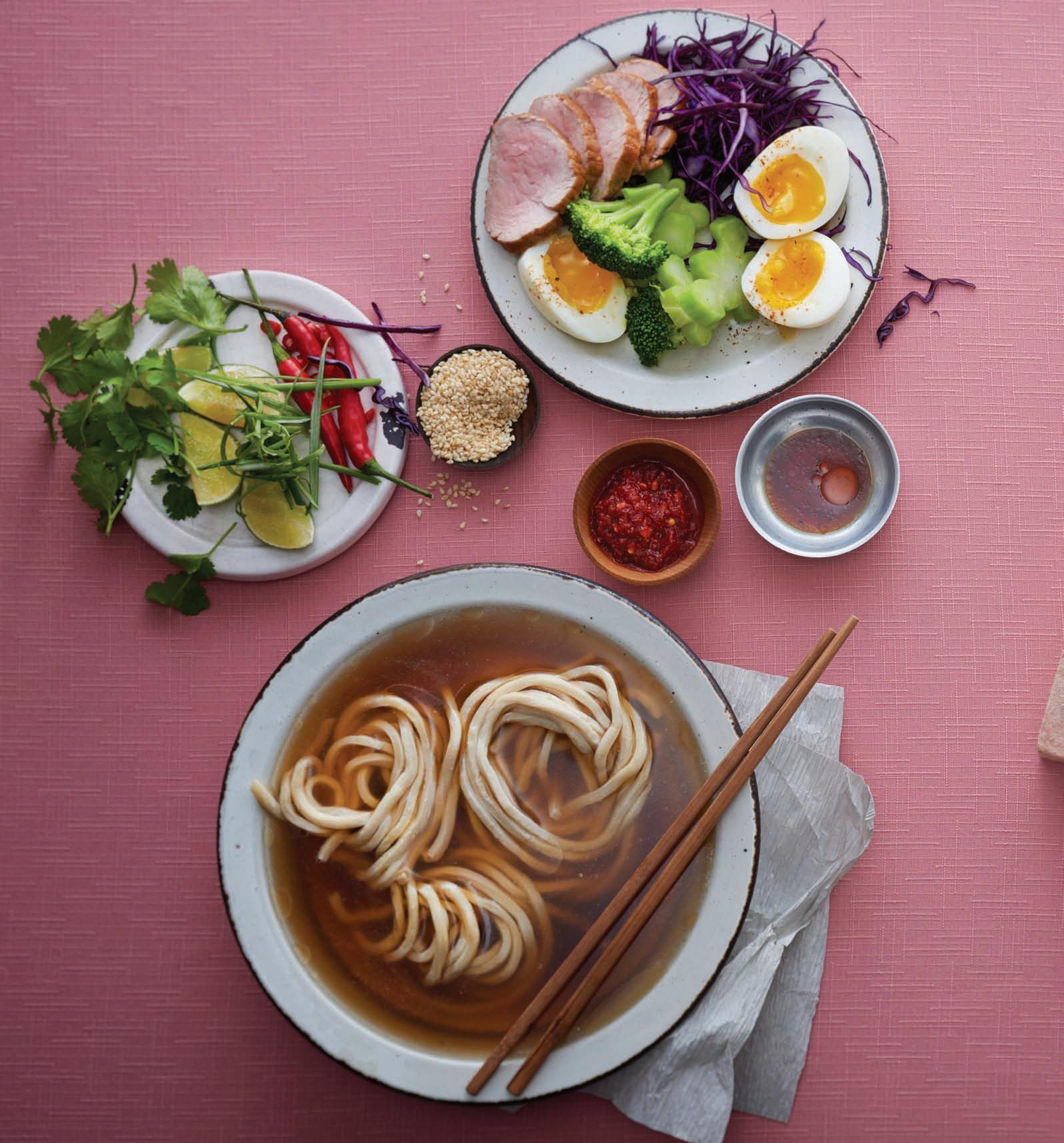
42 JANUARY/FEBRUARY 2018
MAKE A MEAL OUT OF THIS FLAVOURFUL SOUP LOADED WITH TENDER PORK, EGGS, RED CABBAGE AND SPICES
Udon Noodle Broth
1.25 L (5 cups) low-sodium chicken broth or homemade pork broth
3 garlic cloves, peeled and crushed
1 star anise
Half a cinnamon stick
2.5 cm piece of ginger, 80 mL (⅓ cup) soy sauce
25 g of dried bonito flakes
1 2-inch piece of dried kombu, rinsed
1 Tb mirin
1 tsp sugar
1 pound (320-400g) fresh udon noodles**
Toppings
2 eggs (7 minute boiled)
1 pork tenderloin, cooked and sliced
Red cabbage, finely shredded
Fresh coriander, chopped
Cooked brocoli
Toasted sesame seeds
Green onions, chopped
Soy sauce
Optional
Hot sauce
Method

Put all broth ingredients, except noodles and bonito flakes, in a saucepan. Let steep 25 minutes over low heat.
In the meantime, bring to boil a large amount of salted water in a large pot. Add noodles and cook 5-6 minutes (or more according to the size of the udon).
Drain and divide into 4 bowls. Five minutes before serving, add the bonito to the broth and let it steep over low heat. It must not boil! Strain broth and pour over the hot noodles.
Serve with your choice of toppings. Sprinkle with green onions and sesame seeds. Drizzle with hot sauce if you like it spicy.
** If unable to find fresh udon noodles, opt for dry noodles and follow cooking method on label.
43
RECIPE + STYLING Marie-Eve Charron PHOTOGRAPHY André Rozon
ENFANT SAUVAGE


A new brewery on the Rock Bay block challenges Victoria’s beer status quo.

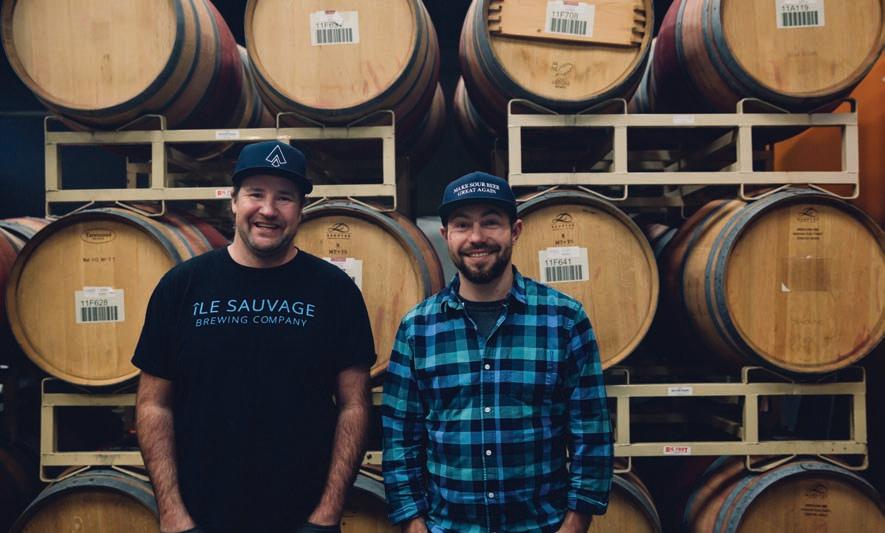
CRAFT BEER HAS GROWN RATHER POPULAR, IN CASE YOU’VE BEEN COMATOSE with your head buried deep in the sand beneath the Mariana Trench for the past decade. Now, as with any indie movement on its way into the mainstream, there is a rush to define it. What is craft beer? Small batch. Handcrafted. Blah. Please, these terms are just putty in marketing department hands. They hold no serious form. If this movement can rest on one single idiom, it is that beer is not what you think it is. Beer is not limited to the styles or ingredients that crowd the mainstream shelves. So, to maintain its counterculture status, craft beer must maintain a contrary position; it must perpetually redefine and reinvent itself. A counter-culture, embraced by the mainstream, trying to increase its popularity without sacrificing its essential dogma: quite the Punk conundrum.
For a long time craft beer defined itself through bitterness. That was pretty much it. The addition of a little more hops to the brew-kettle by homebrewers in the late 20th century delivered a comparatively jarring palate-punch. These masochists hit a nerve, gained notoriety, started small commercial operations and now run the largest independently owned commercial breweries in North America: Sierra Nevada, Dogfish Head, Lagunitas, Stone, Deschutes, etc. The next wave of successful small brewers basically just turned up the dial on the amplifier. The result was an arms race for the world’s most intimidating hop bomb. The IPA, the Double IPA, Imperial IPA, XIPA … beers hopped to 110 percent on the International Bitterness Scale. Defying physics with their aggressive palate assaults. But that was at the turn of the last century, an eon ago for today’s ADD consumer. So what is it now? How can the industry stay relevant when there’s nowhere left on the bitterness scale to break new ground?
The answer, for now, is sourness. Same punch, different swing. All those microbes that professional brewers have spent every second, of every minute, of every hour of their pretty mundane lives trying to avoid, losing sleep every night for fear of them making house in their latest batch—all those little infectious bastards are now the darlings of the craft beer movement. Lactobacillus, Brettanomyces, Pediococcus—these Enemies of the State are now the Belles of the Ball: Sour is the new Bitter. Although it has been only recently appropriated by craft beer, souring beer with these minute hellions is certainly an obscure technique, but also thoroughly traditional. Before the advent of modern sterilization methods, it can be assumed that all beer was, to a degree, sour. The Big Three infectors listed above are all naturally occurring, and the reason commercial brewers fear them is their voraciousness for malt sugars. They are transient in the air; they grow on grain husks and the skins of fruit. Because of this, brewing sour beers is incredibly easy to do, even accidentally, but making them palatable is a very different feat altogether. Enter, stage right, the newest addition to our Fair City’s brewing scene: Île Sauvage Brewing Company. Slated for a spring 2018
44JANUARY/FEBRUARY 2018
DANIEL MURPHY BREWING
ABOVE: Stephane Turcotte and Ian Ibbotson (in plaid).
JOHANN VINCENT
opening, their mandate is to provide Victorians with an ongoing rotation of soured, barrel-aged brews, not defined by the constrictions of a set of consistent brands, but rather a constantly changing selection of beers bound only by the brewery’s production methods and philosophy. And that philosophy is to Embrace the Sour. Why base a business on such a niche groove of an already minority movement? “Because we drink a lot of them,” says co-founder Ian Ibbotson, which pretty much sums up why anyone I know got into craft-brewing, period.
Three university housemates—Ian, Stephane Turcotte and Adam Gresley-Jones—spent the 1990s studying, living and brewing together; they parted ways, made their separate marks on the world, and now reconvene to live out their bachelorhood dream of owning/operating their own brewery. It’s a hell of a script. And now the dream has translated into the foundations of a reality. Ian pursued studies in nutrition, then fell into construction and started his own business in that field, perhaps the handiest of professions when entering into a new brewery project. Adam moved into the government sector and can apply his experience in regulatory compliance, financial management and overall strategy development, from his home in Trail, B.C. Stephane stayed in the craft-brewing fold, but in the exotic-sounding surrounds of Busan, South Korea, where he managed one of the country’s first craft-beer-centric bars. The bar began contracting production of their own line of beers through a local commercial brewery and eventually took advantage of a relaxation in liquor manufacturing laws to establish their own small brewery and pub: Galmegi Brewing Co. After selling his shares in that venture, he is standing on the other side of the planet in the ex-Prima Strada location on Bridge Street in Rock Bay. The once-warm, industrial-chic restaurant space has been completely gutted in readiness. The first shipment of barrels lies stacked in the centre of the cavernous, unfinished space, an enticing portent of things to come. Masking tape on the cement floor blocks out the future brewhouse, tasting bar, fermentation vessels and retail storefront. Île Sauvage is only a few City of Victoria signatures away from being able to ship in the brewing vessels and get the tasting room built. And despite the relaxed demeanour of its ownership, there is definitely a sense of urgency mounting—not only due to the impending need for cash flow and the intense curiosity of the local beer cognoscenti but because the souring process, coupled with appropriate barrel aging, takes immense care and technical acumen. And also something more uncompromising: time. And lots of it.





For these beer styles, a year or even two from grain to glass is commonplace. Bacteria consume and convert sugars at a far slower rate than the isolated yeast strains employed by most commercial breweries. For a liquid to leach the desired intensity of oak flavour from a barrel takes months. When discussing these “difficulties” with Ian and Stephane, their eagerness to put in this time and attention instantly boils to the surface. The monumental effort and patience required to produce these beers is very much a minor labour to them, and a major love. But as the little bacterial nasties go slowly about their business in the stacks of American and French oak barrels that line the brewery floor, thirsting beer swillers will find little satisfaction awaiting these microscopic endeavours, empty glasses in hand. Expect to see a few “clean beers,” i.e., hoppy, yeast-fermented styles, and the faster, easier-to-produce “kettle-soured” brews first out of the gate as we wait for the brewery’s raison d’être to arrive.








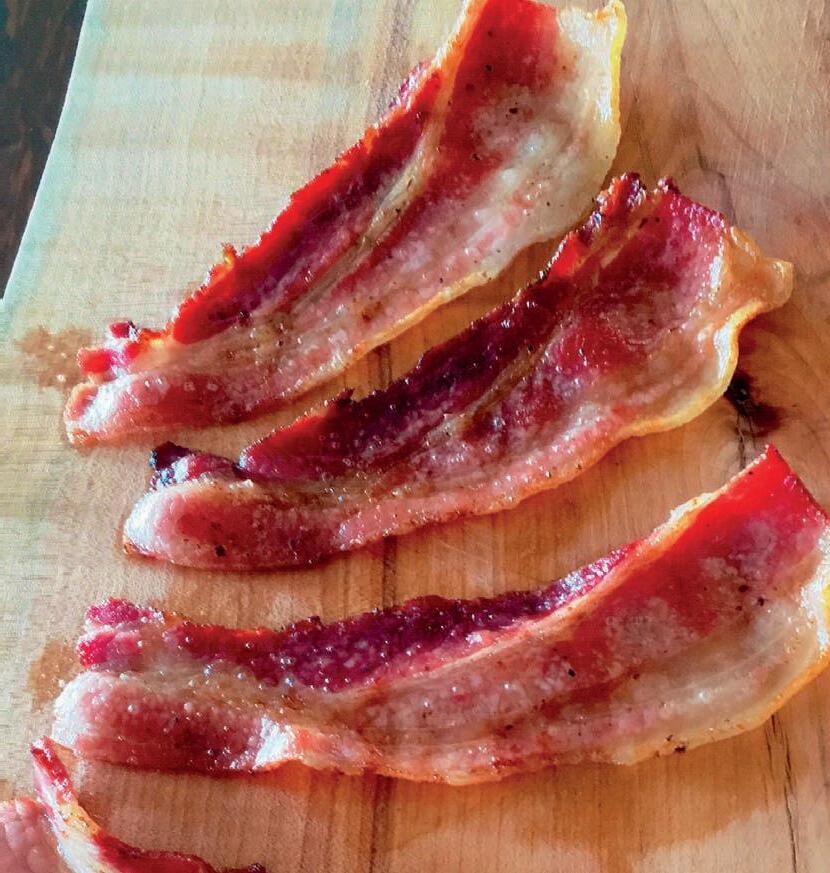
Whatever brew happens to be on tap, Île Sauvage’s tasting lounge has the makings of a welcoming space where neighbourhood residents and beer aficionados from near and far can convene, imbibe and discuss beer (among other, less-important subjects.) As Ian envisions: “Come on in. Let’s talk about beer.”

And then drink it. And then probably talk about it some more. The “passion project,” as Stephane puts it, is not confined to the production side. Île Sauvage will be a space for those who want more than just a cold beer; they are looking to immerse customers in brewing culture. Stephane holds an Advanced Cicerone accreditation, the third of four levels in the beer-world equivalent of the sommelier, and he looks forward to training all their service staff to an unparalleled level of beer and brewing knowledge. They are working to permit a number of local food trucks to operate onsite on a rotating basis, a suggestion unanimously embraced by surrounding residents still saddened by the disappearance of Prima’s Italian fare. And they will add another welcome stop to the growlerfilling trapline on Bridge Street. The beer may be sour, but the future looks pretty sweet for the Victorian craft beer adventurer.
Île Sauvage is targeting a spring 2018 opening. In the meantime, stay tuned to their website for updates and information about their “Founders Club” memberships: www.ilesauvage.com/founders-club











45
Liquid Assets



SPLURGEWORTHY & GREAT VALUE WINES



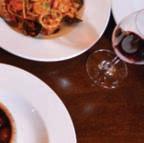

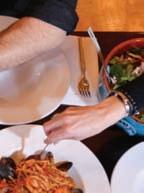
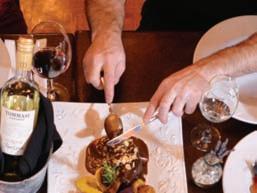
PERRIER JOUET GRAND BRUT CHAMPAGNE NV, FRANCE $63.00-67.00
Bubble is a wonderful thing! As they say “you can have too much champagne, but never enough!” PJ is light gold in colour with tiny but persistent bubbles and a toasty brioche character. Seamless and superbly balanced with sweet apple and citrus flavours, good length and a crisp elegant finish.
WOLFBERGER CRÉMANT D’ALSACE BRUT ROSÉ NV, FRANCE $24.50-26.00

Well, here’s a little beauty to remember for a raining day. Made in the traditional method (Champenoise) from 100% Pinot Noir, this lovely Alsacian Crémant is salmon-hued with heady aromatics and subtle strawberry and cherry flavours. Light and crisp with a long dry finish.
VILA SUMMERHILL CIPES BRUT NV, OKANAGAN VALLEY, BC $25.00-27.00
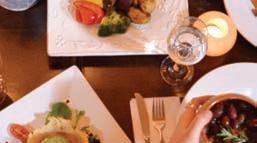
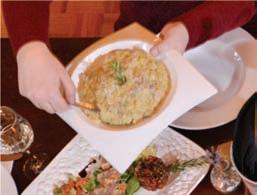
If you haven’t already tasted this perky, pyramid powered brut from the heartland of BC wine country, you are in for a treat. Made in the traditional method from a blend of organic Riesling, Pinot Blanc and Chardonnay, Cipes Brut is absolutely delicious. Straw coloured with aromas of apples, lime and grapefruit, with a soft creamy texture and a streak of refreshing acidity.
NAUTILUS ESTATE MARLBOROUGH SAUVIGNON BLANC 2016, NZ $22.00-24.00





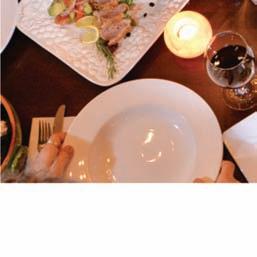
Big and bold, with aromas of cut grass, citrus and passion fruit. More of the same on the palate, picking up bright gooseberry notes as it opens up. Nicely balanced with crisp acidity and a long refreshing finish.
SPIER SIGNATURE CHENIN BLANC 2017, SOUTH AFRICA $14.00-16.00
A very acceptable, easy drinking Chenin Blanc from Stellenbosch. Another biodynamic wine that belies its humble price point. Delicious with ripe green guava, pear and spice flavours nicely balanced with zippy acidity with a touch of sweetness in the finish.
SUMMERHILL ORGANIC RIESLING 2016, OKANAGAN VALLEY, BC $25.00-27.000

British Columbia Riesling in particular has not received the respect it merited, from the locals, until fairly recently. This tasty BC Riesling from the Kelowna area is a case in point. Organic Summerhill Riesling is lip smacking good with concentrated peach, apple and lanolin flavours, low alcohol and a slightly oily texture balanced perfectly with mouth watering acidity.
DOMAINE LAFAGE CENTENAIRE CÔTES DU ROUSSILLON BLANC 2015, FRANCE $25.00-27.00


Wow, this is one tasty white from the wilds of France. Located in what could be considered the butt of French Catalonia, Domaine Lafage is another shining star located in the Languedoc. A blend of old-vine Grenache Blanc and Gris (100 year old vines) and young vine Roussanne (20%), the Centenaire is medium-bodied with citrus and mineral nuances on the nose and a rich slightly viscous palate with lovely pure fruit and a clean dry finish.
KING ESTATE ACROBAT PINOT NOIR 2015, OREGON $28.00-31.00



Very Burgundian. It has the structure but it also has fruit and plenty of it. The nose is bursting with raspberry, black cherry, and spice aromas but it is the plush texture and complex layers of ripe fruit flavours and subtle oak nuances that really impress. The best value to be found in Oregon Pinot from very good producer and a fine ripe vintage. Superb! BLACK HILLS ESTATE NOTA BENE 2015, OKANAGAN VALLEY, BC $65.00-70.00
This bottle is not cheap but good wine rarely is. The newly released 2015 is a classic Bordeaux blend of Cabernet Sauvignon, Merlot and Cabernet Franc aged in a mix of new and old French and American oak. Concentrated and firm, with cassis, mocha and spicy vanilla aromas, ripe red berry flavours, firm tannins and a long chewy finish.
DOMINIO DE PUNCTUM ORGANIC TEMPRANILLO – PETIT VERDOT 2015, SPAIN $12.50-14.00 Located in the heart of La Mancha in central Spain, Dominio De Punctum’s vineyards are certified biodynamic. The must was fermented in stainless steel tanks then aged for 6 months in American oak before bottling. Fresh and easy drinking with simple fruit flavours, nicely balanced with a somewhat rustic finish. A great everyday wine for the table
46JANUARY/FEBRUARY 2018
LARRY ARNOLD
106 Superior Street | 250.380.0088 | IlCovoTrattoria.ca Authentic Taste of Italy ~ Experience family style dining Welcome to a Food Lover’s Paradise www.mcleansfoods.com Established 1992 in Nanaimo’s Old City Quarter Old City Quarter s In Nanaimo’’s mcleansfoods.com .mcleansfoods.com ds.com e@ ameet Str
LOCAL FLAVOUR
Please support the advertisers featured here as their support allows us to offer this magazine free of charge.
DUNCAN
Hudson’s On First
Award winning dining in a beautifully restored heritage home. Local ingredients, classic techniques and made from scratch cooking are a just few reasons to visit us in Duncan more often. Celebrate Bubbles & Brunch, Lunch and Dinner.

163 First St. Duncan, BC, 250-597-0066, hudsonsonfirst.ca
Duncan Garage Café & Bakery
Cooking up real food 7 days a week. Healthy beverages, vegetarian, vegan and gluten-free specialties. Start the New Year the right way ….with us. Committed to serving local, organic and healthy vegetarian food and baking for over 15 years.
ADRIENNE’S RESTAURANT & TEA GARDEN
330 Duncan St., Downtown Duncan (across from the railway station), 250-748-6223

MATTICK’S FARM
Adrienne’s Restaurant & Tea Garden
Visit us for breakfast to try our famous eggs benedict and omelettes, for lunch to enjoy our daily changing feature menu and for the afternoon to experience our high tea, European desserts, and a variety of drinks. Happy New Year from our family to your family!
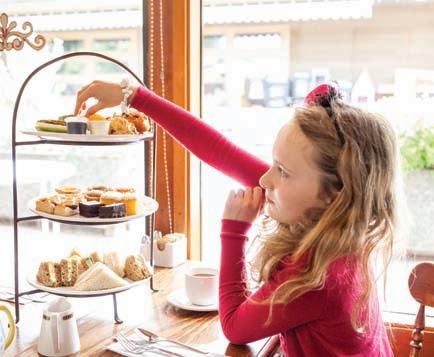
Thank you for your patronage, Your Adrienne's Team
Open daily, book your reservations, 250-658-1535
5325 Cordova Bay Road, Victoria, BC, 250-658-1535 AdriennesTeaGarden.com
VICTORIA PUBLIC MARKET
Whisk

Happy New Year to all of our loyal customers who have supported us over the last few years at the Victoria Public Market. We are still your downtown source of heritage brands such as Mason Cash, Le Creuset and Fiestaware. We always have lots of new kitchen gadgets and colourful linens. Bridal registry available. At the Victoria Public Market, 778-433-9184, whiskvictoria.ca, Facebook and Instagram. Open 7 days a week
IT’S IN OUR HANDS. HAND-CRAFTED BREAD MADE WITH FRESHLY STONE-MILLED FLOUR AND ONLY CERTIFIED ORGANIC OR SUSTAINABLY GROWN LOCAL INGREDIENTS . NATURALLY LEAVENED AND BAKED TO CRUSTY PERFECTION IN WOOD-FIRED BRICK OVENS.
1517 QUADRA ST.

47
Victoria Public Market 778 433 9184
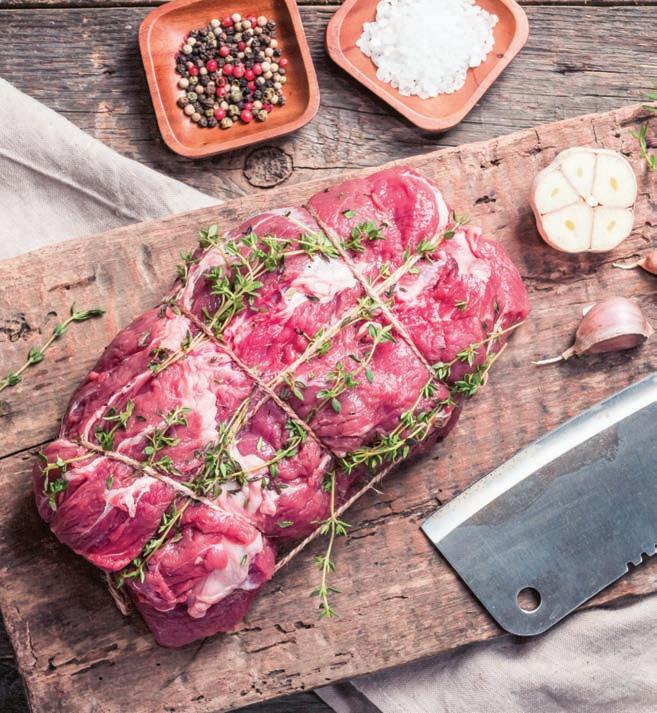


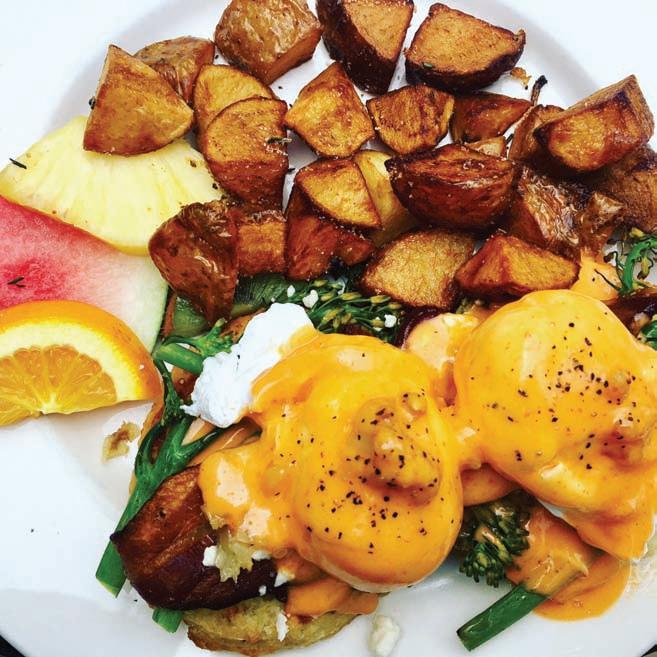








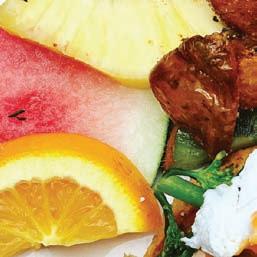
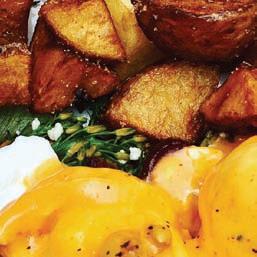




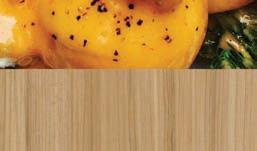


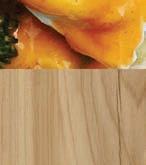

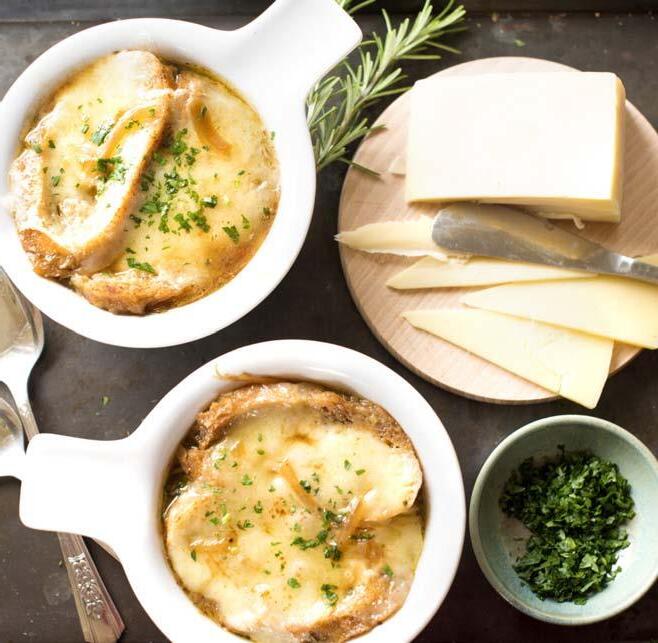













YOU’LL LOVE FARM FRESH
BREAKFAST - LUNCH - DINNER - EVERYDAY this cou a FREE 355 Cook St. - BubbysKitchen.ca - 250-590-8915 Fresh, all natural, made with love. F COOKIE Put your own spin on this amazing onion soup with dark beer and cheese. Try it with beef, chicken or tangy cheese, such as Gruyere or Swiss. And why not make a two-course lunch or dinner by serving a salad before digging into this incredible soup! Find lots of tasty options at thriftyfoods.com/recipes NION OUP with Dark Beer & Cheese thriftyfoods.com 1.800.667.8280 Connect with us com thriftyfoods.1.800.667.8280 7.8280 1.800
2032 OAK BAY AVE







































































































 Daisy Orser is co-owner of The Root Cellar Village Green Grocer
Daisy Orser is co-owner of The Root Cellar Village Green Grocer
























 story by ADRIAN PARADIS photography by JOHANN VINCENT
story by ADRIAN PARADIS photography by JOHANN VINCENT



























 Vin’daloo’d Seafood Hotpot – chargrilled sockeye and rockfish, mussels, smoked squid and prawns, lemony baguette
Vin’daloo’d Seafood Hotpot – chargrilled sockeye and rockfish, mussels, smoked squid and prawns, lemony baguette






































































































 By Shelora Sheldan,
By Shelora Sheldan,










































































































